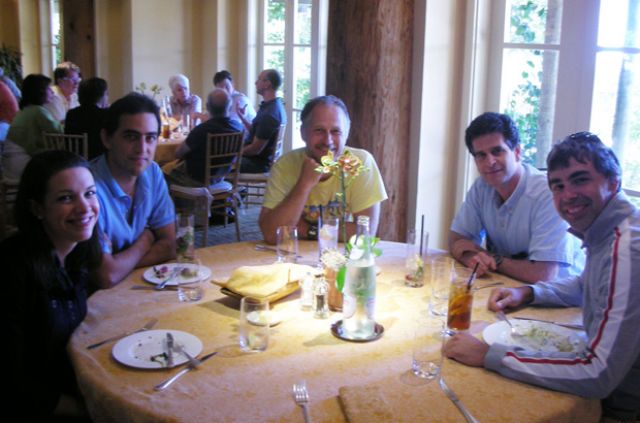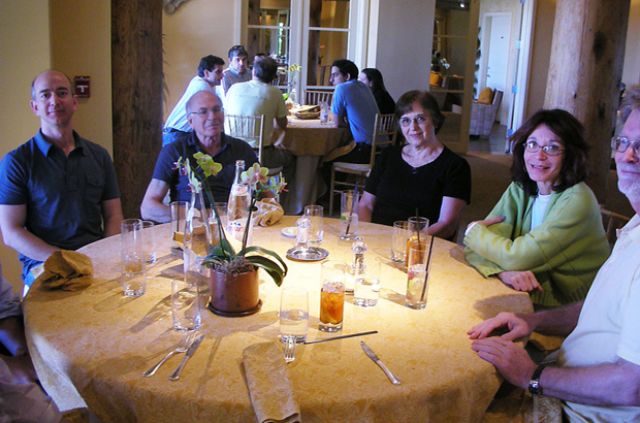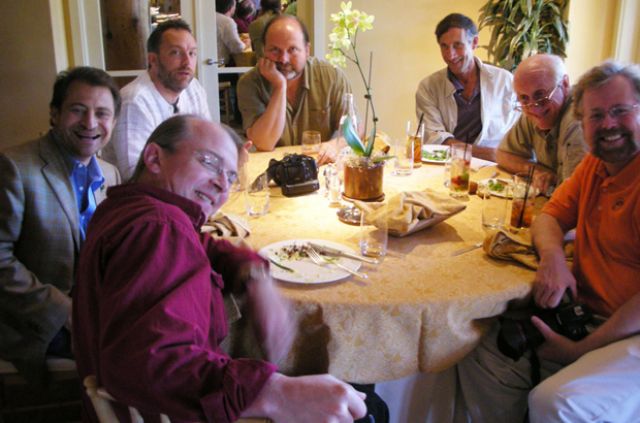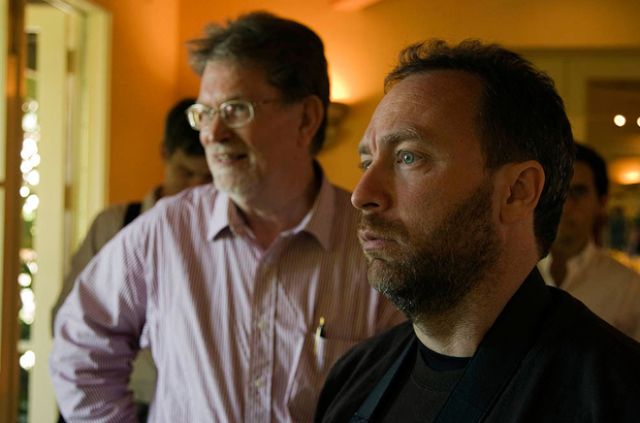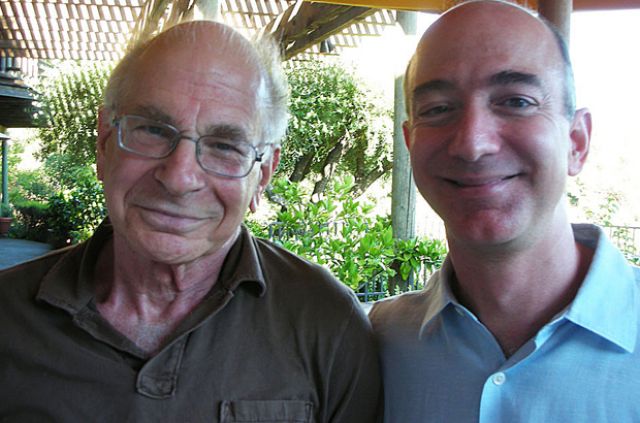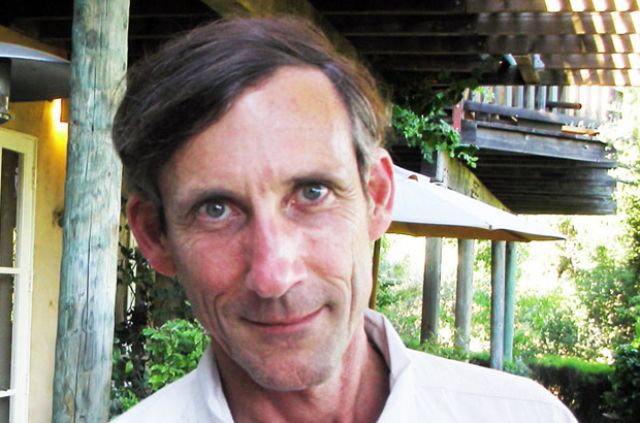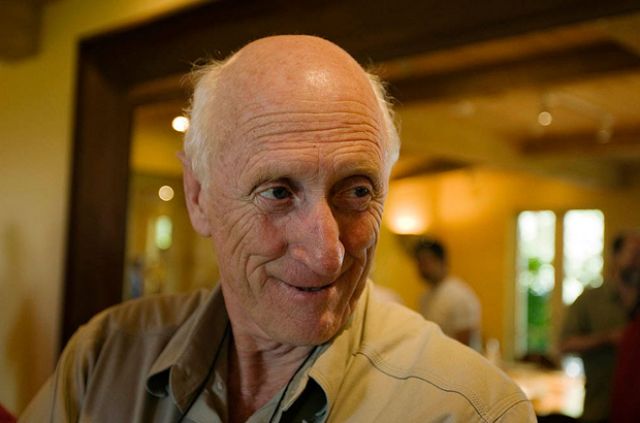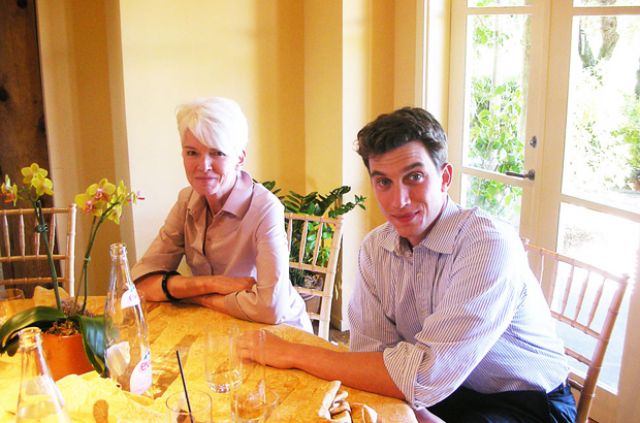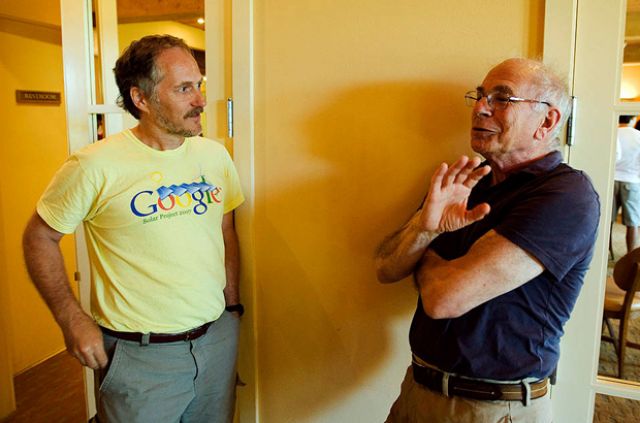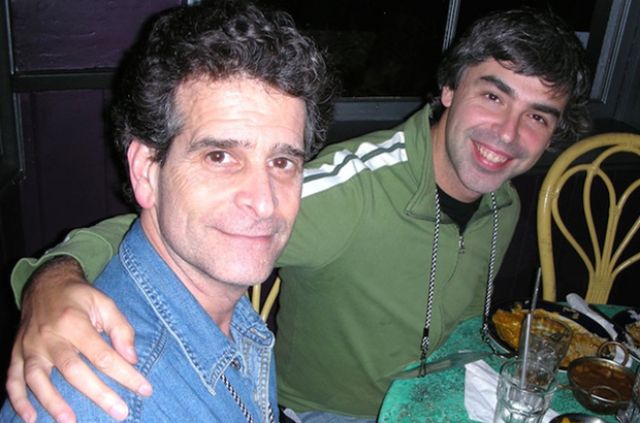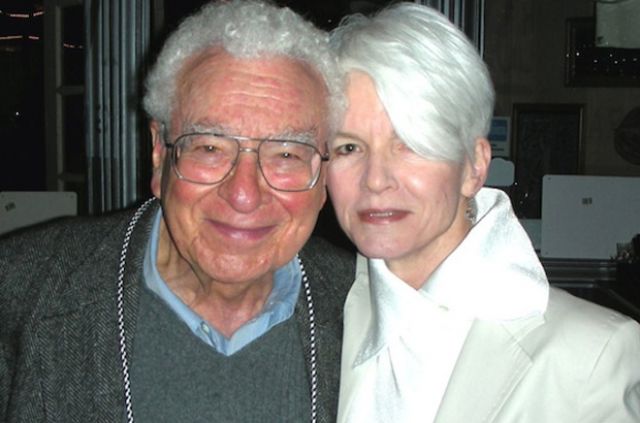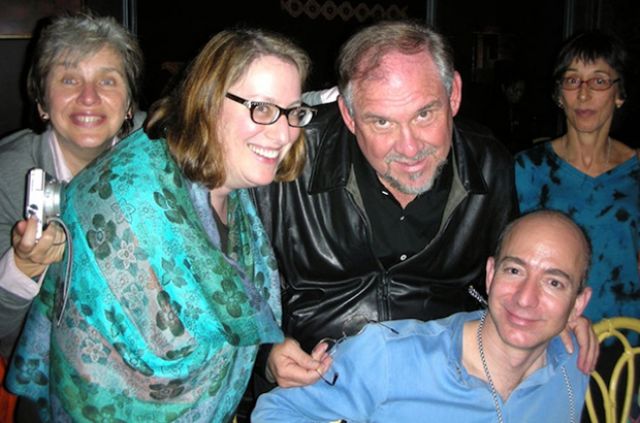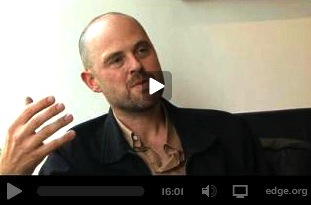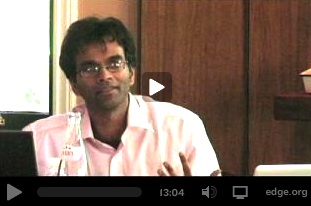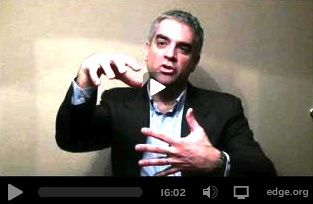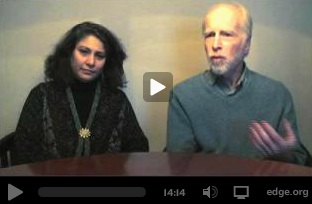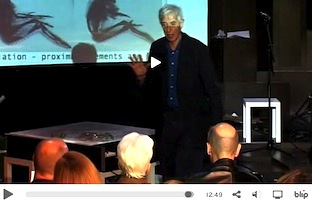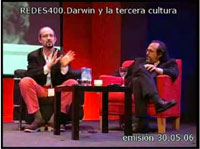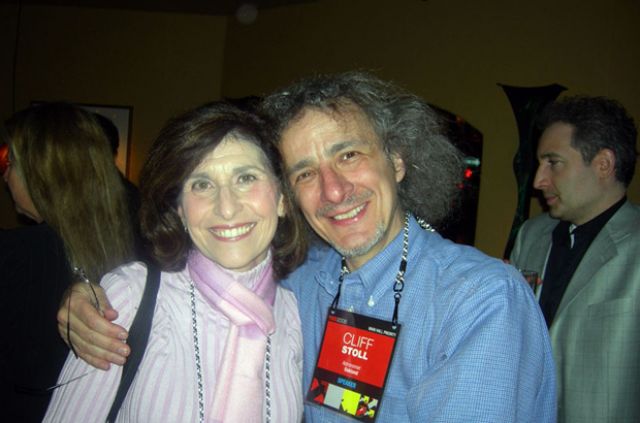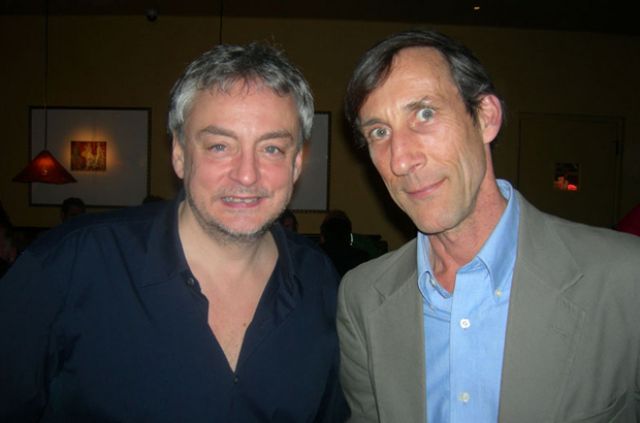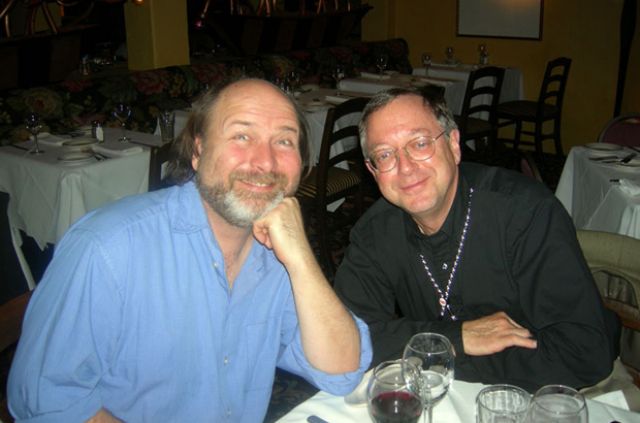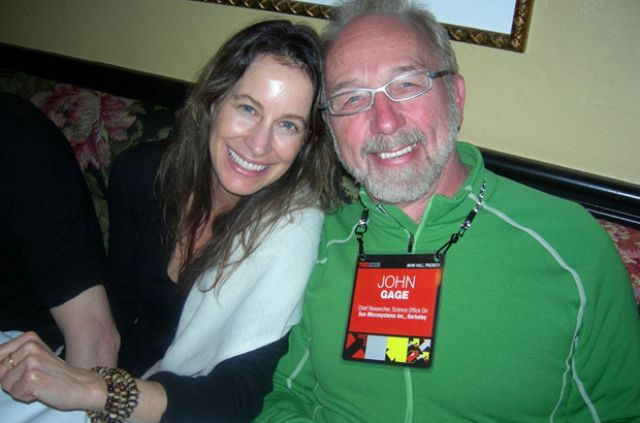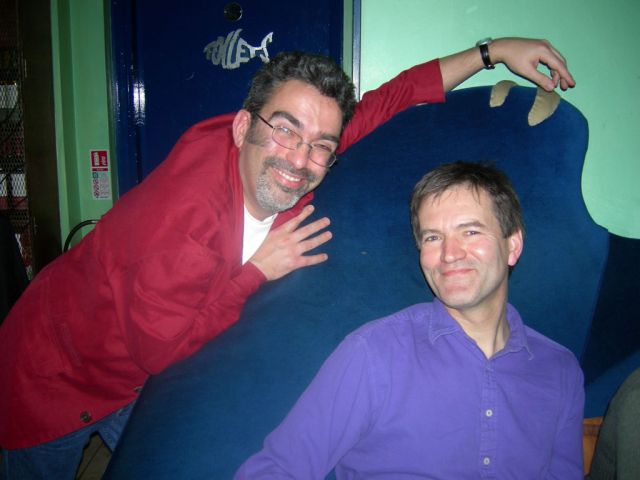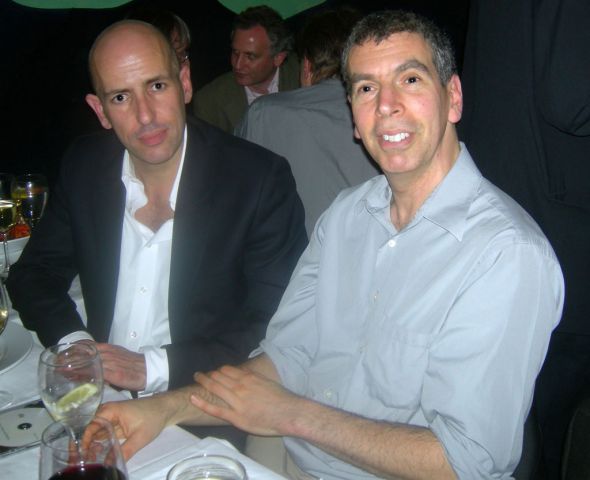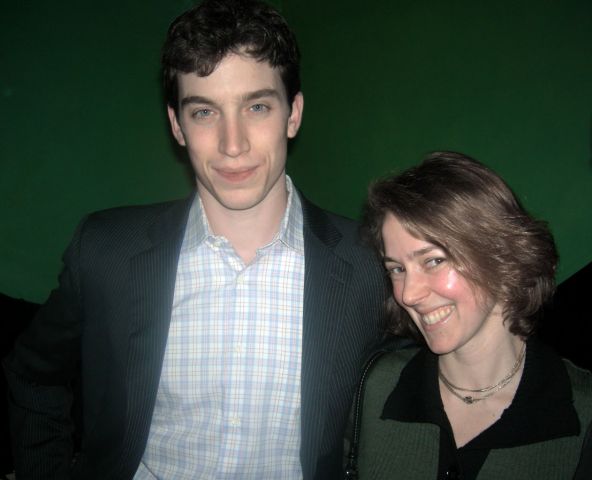On October 14, 2007, Edge participated in a morning of "table-top experiments" as part of the Serpentine Gallery Experiment Marathon in London. This live event was featured along with the Edge/Serpentine collaboration: "What Is Your Formula? Your Equation? Your Algorithm? Formulae For the 21st Century."
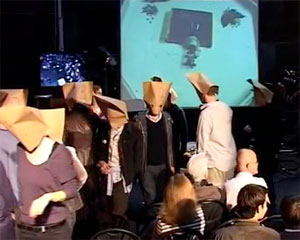
Seirian Sumner
A cooperative foraging experiment - lessons from ants

Timothy Taylor
The Tradescant's Ark Experiment
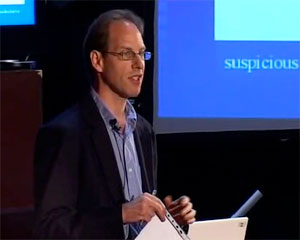
Simon Baron-Cohen
Do women have better empathy than men?
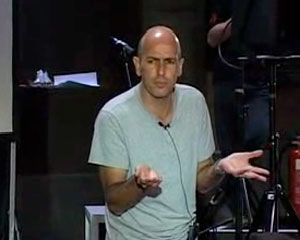
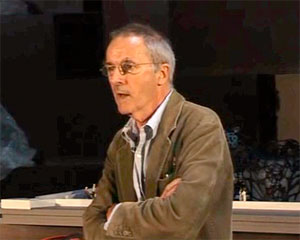
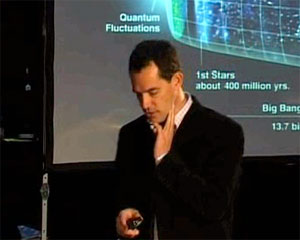
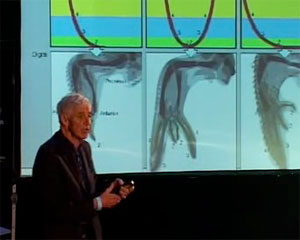
Lewis Wolpert
How our limbs are patterned like the French flag
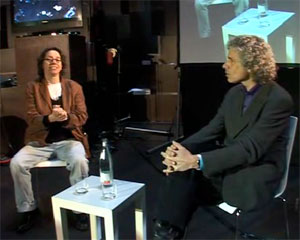
Steven Pinker in conversation with Marcy Kahan
The Stuff of Thought
"Life consists of propositions about life."
— Wallace Stevens ("Men Made Out Of Words")

"I just read the Life transcript book and it is fantastic. One of the better books I've read in a while. Super rich, high signal to noise, great subject."
— Kevin Kelly, Editor-At-Large, Wired
"The more I think about it the more I'm convinced that Life: What A Concept! was one of those memorable events that people in years to come will see as a crucial moment in history. After all, it's where the dawning of the age of biology was officially announced."
— Andrian Kreye, Süddeutsche Zeitung
EDGE PUBLISHES "LIFE: WHAT A CONCEPT!" TRANSCRIPT AS DOWNLOADABLE PDF BOOK [1.14.08]
Edge is pleased to announce the online publication of the complete transcript of this summer's Edge event, Life: What a Concept! as a 43,000- word downloadable PDF Edgebook.
The event took place at Eastover Farm in Bethlehem, CT on Monday, August 27th (see below). Invited to address the topic "Life: What a Concept!" were Freeman Dyson, J. Craig Venter, George Church, Robert Shapiro, Dimitar Sasselov, and Seth Lloyd, who focused on their new, and in more than a few cases, startling research, and/or ideas in the biological sciences.
Reporting on the August event, Andrian Kreye, Feuilleton (Arts & Ideas) Editor of Süddeutsche Zeitung wrote:
Soon genetic engineering will shape our daily life to the same extent that computers do today. This sounds like science fiction, but it is already reality in science. Thus genetic engineer George Church talks about the biological building blocks that he is able to synthetically manufacture. It is only a matter of time until we will be able to manufacture organisms that can self-reproduce, he claims. Most notably J. Craig Venter succeeded in introducing a copy of a DNA-based chromosome into a cell, which from then on was controlled by that strand of DNA.
Jordan Mejias, Arts Correspondent of Frankfurter Allgemeine Zeitung, noted that:
These are thoughts to make jaws drop...Nobody at Eastover Farm seemed afraid of a eugenic revival. What in German circles would have released violent controversies, here drifts by unopposed under mighty maple trees that gently whisper in the breeze.
The following Edge feature on the "Life: What a Concept!" August event includes a photo album; streaming video; and html files of each of the individual talks.
In April, Dennis Overbye, writing in the New York Times "Science Times," broke the story of the discovery by Dimitar Sasselov and his colleagues of five earth-like exo-planets, one of which "might be the first habitable planet outside the solar system."
At the end of June, Craig Venter has announced the results of his lab's work on genome transplantation methods that allows for the transformation of one type of bacteria into another, dictated by the transplanted chromosome. In other words, one species becomes another. In talking to Edge about the research, Venter noted the following:
Now we know we can boot up a chromosome system. It doesn't matter if the DNA is chemically made in a cell or made in a test tube. Until this development, if you made a synthetic chomosome you had the question of what do you do with it. Replacing the chomosome with existing cells, if it works, seems the most effective to way to replace one already in an existing cell systems. We didn't know if it would work or not. Now we do. This is a major advance in the field of synthetic genomics. We now know we can create a synthetic organism. It's not a question of 'if', or 'how', but 'when', and in this regard, think weeks and months, not years.
In July, in an interesting and provocative essay in New York Review of Books entitled "Our Biotech Future," Freeman Dyson wrote:
The Darwinian interlude has lasted for two or three billion years. It probably slowed down the pace of evolution considerably. The basic biochemical machinery o life had evolved rapidly during the few hundreds of millions of years of the pre-Darwinian era, and changed very little in the next two billion years of microbial evolution. Darwinian evolution is slow because individual species, once established evolve very little. With rare exceptions, Darwinian evolution requires established species to become extinct so that new species can replace them.
Now, after three billion years, the Darwinian interlude is over. It was an interlude between two periods of horizontal gene transfer. The epoch of Darwinian evolution based on competition between species ended about ten thousand years ago, when a single species, Homo sapiens, began to dominate and reorganize the biosphere. Since that time, cultural evolution has replaced biological evolution as the main driving force of change. Cultural evolution is not Darwinian. Cultures spread by horizontal transfer of ideas more than by genetic inheritance. Cultural evolution is running a thousand times faster than Darwinian evolution, taking us into a new era of cultural interdependence which we call globalization. And now, as Homo sapiens domesticates the new biotechnology, we are reviving the ancient pre-Darwinian practice of horizontal gene transfer, moving genes easily from microbes to plants and animals, blurring the boundaries between species. We are moving rapidly into the post-Darwinian era, when species other than our own will no longer exist, and the rules of Open Source sharing will be extended from the exchange of software to the exchange of genes. Then the evolution of life will once again be communal, as it was in the good old days before separate species and intellectual property were invented.
It's clear from these developments as well as others, that we are at the end of one empirical road and ready for adventures that will lead us into new realms.
This year's Annual Edge Event took place at Eastover Farm in Bethlehem, CT on Monday, August 27th. Invited to address the topic "Life: What a Concept!" were Freeman Dyson, J. Craig Venter, George Church, Robert Shapiro, Dimitar Sasselov, and Seth Lloyd, who focused on their new, and in more than a few cases, startling research, and/or ideas in the biological sciences.
Physicist Freeman Dyson envisions a biotech future which supplants physics and notes that after three billion years, the Darwinian interlude is over. He refers to an interlude between two periods of horizontal gene transfer, a subject explored in his abovementioned essay.
Craig Venter, who decoded the human genome, surprised the world in late June by announcing the results of his lab's work on genome transplantation methods that allows for the transformation of one type of bacteria into another, dictated by the transplanted chromosome. In other words, one species becomes another.
George Church, the pioneer of the Synthetic Biology revolution, thinks of the cell as operating system, and engineers taking the place of traditional biologists in retooling stripped down components of cells (bio-bricks) in much the vein as in the late 70s when electrical engineers were working their way to the first personal computer by assembling circuit boards, hard drives, monitors, etc.
Biologist Robert Shapiro disagrees with scientists who believe that an extreme stroke of luck was needed to get life started in a non-living environment. He favors the idea that life arose through the normal operation of the laws of physics and chemistry. If he is right, then life may be widespread in the cosmos.
Dimitar Sasselov, Planetary Astrophysicist, and Director of the Harvard Origins of Life Initiative, has made recent discoveries of exo-planets ("Super-Earths"). He looks at new evidence to explore the question of how chemical systems become living systems.
Quantum engineer Seth Lloyd sees the universe as an information processing system in which simple systems such as atoms and molecules must necessarily give rise complex structures such as life, and life itself must give rise to even greater complexity, such as human beings, societies, and whatever comes next.
A small group of journalists interested in the kind of issues that are explored on Edge were present: Corey Powell, Discover, Jordan Mejias, Frankfurter Allgemeine Zeitung, Heidi Ledford, Nature, Greg Huang, New Scientist, Deborah Treisman, New Yorker, Edward Rothstein, The New York Times, Andrian Kreye, Süddeutsche Zeitung, Antonio Regalado, Wall Street Journal. Guests included Heather Kowalski, The J. Craig Venter Institute, Ting Wu, The Wu Lab, Harvard Medical School, and the artist Stephanie Rudloe. Attending for Edge: Katinka Matson, Russell Weinberger, Max Brockman, and Karla Taylor.
We are witnessing a point in which the empirical has intersected with the epistemological: everything becomes new, everything is up for grabs. Big questions are being asked, questions that affect the lives of everyone on the planet. And don't even try to talk about religion: the gods are gone.
Following the theme of new technologies=new perceptions, I asked the speakers to take a third culture slant in the proceedings and explore not only the science but the potential for changes in the intellectual landscape as well.
We are pleased to present the transcripts of the talks and conversation along with streaming video clips (links below).
— JB
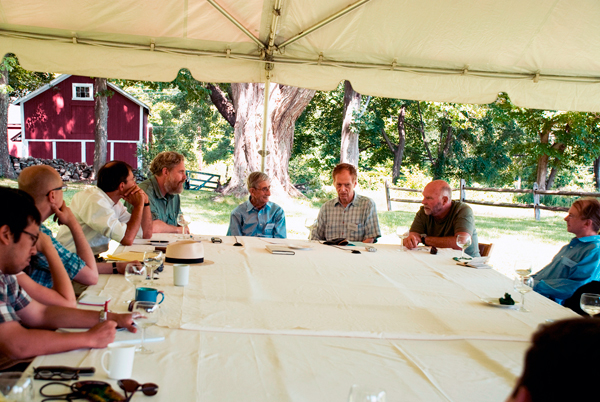

FREEMAN DYSON

The essential idea is that you separate metabolism from replication. We know modern life has both metabolism and replication, but they're carried out by separate groups of molecules. Metabolism is carried out by proteins and all kinds of other molecules, and replication is carried out by DNA and RNA. That maybe is a clue to the fact that they started out separate rather than together. So my version of the origin of life is that it started with metabolism only.
FREEMAN DYSON: First of all I wanted to talk a bit about origin of life. To me the most interesting question in biology has always been how it all got started. That has been a hobby of mine. We're all equally ignorant, as far as I can see. That's why somebody like me can pretend to be an expert.
I was struck by the picture of early life that appeared in Carl Woese's article three years ago. He had this picture of the pre-Darwinian epoch when genetic information was open source and everything was shared between different organisms. That picture fits very nicely with my speculative version of origin of life.
The essential idea is that you separate metabolism from replication. We know modern life has both metabolism and replication, but they're carried out by separate groups of molecules. Metabolism is carried out by proteins and all kinds of small molecules, and replication is carried out by DNA and RNA. That maybe is a clue to the fact that they started out separate rather than together. So my version of the origin of life is it started with metabolism only. ...
___
FREEMAN DYSON is professor of physics at the Institute for Advanced Study, in Princeton. His professional interests are in mathematics and astronomy. Among his many books are Disturbing the Universe, Infinite in All Directions Origins of Life, From Eros to Gaia, Imagined Worlds, The Sun, the Genome, and the Internet, and most recently A Many Colored Glass: Reflections on the Place of Life in the Universe.
CRAIG VENTER

I have come to think of life in much more a gene-centric view than even a genome-centric view, although it kind of oscillates. And when we talk about the transplant work, genome-centric becomes more important than gene-centric. From the first third of the Sorcerer II expedition we discovered roughly 6 million new genes that has doubled the number in the public databases when we put them in a few months ago, and in 2008 we are likely to double that entire number again. We're just at the tip of the iceberg of what the divergence is on this planet. We are in a linear phase of gene discovery maybe in a linear phase of unique biological entities if you call those species, discovery, and I think eventually we can have databases that represent the gene repertoire of our planet.
One question is, can we extrapolate back from this data set to describe the most recent common ancestor. I don't necessarily buy that there is a single ancestor. It’s counterintuitive to me. I think we may have thousands of recent common ancestors and they are not necessarily so common.
J. CRAIG VENTER: Seth's statement about digitization is basically what I've spent the last fifteen years of my career doing, digitizing biology. That's what DNA sequencing has been about. I view biology as an analog world that DNA sequencing has taking into the digital world . I'll talk about some of the observations that we have made for a few minutes, and then I will talk about once we can read the genetic code, we've now started the phase where we can write it. And how that is going to be the end of Darwinism.
On the reading side, some of you have heard of our Sorcerer II expedition for the last few years where we've been just shotgun sequencing the ocean. We've just applied the same tools we developed for sequencing the human genome to the environment, and we could apply it to any environment; we could dig up some soil here, or take water from the pond, and discover biology at a scale that people really have not even imagined.
The world of microbiology as we've come to know it is based on over a hundred year old technology of seeing what will grow in culture. Only about a tenth of a percent of microbiological organisms, will grow in the lab using traditional techniques. We decided to go straight to the DNA world to shotgun sequence what's there; using very simple techniques of filtering seawater into different size fractions, and sequencing everything at once that's in the fractions. ...
___
J. CRAIG VENTER is one of leading scientists of the 21st century for his visionary contributions in genomic research. He is founder and president of the J. Craig Venter Institute. The Venter Institute conducts basic research that advances the science of genomics; specializes inhuman genome based medicine, infectious disease, environmental genomics and synthetic genomics and synthetic life, and explores the ethical and policy implications of genomic discoveries and advances. The Venter Institute employes more than 400 scientist and staff in Rockville, Md and in La Jolla, Ca. He is the author of A Life Decoded: My Genome: My Life.
GEORGE CHURCH
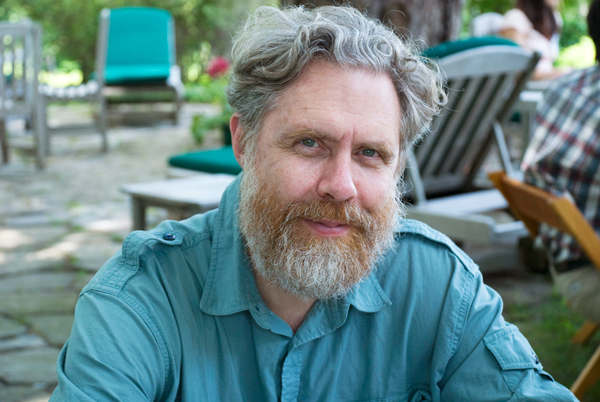
Many of the people here worry about what life is, but maybe in a slightly more general way, not just ribosomes, but inorganic life. Would we know it if we saw it? It's important as we go and discover other worlds, as we start creating more complicated robots, and so forth, to know, where do we draw the line?
GEORGE CHURCH: We've heard a little bit about the ancient past of biology, and possible futures, and I'd like to frame what I'm talking about in terms of four subjects that elaborate on that. In terms of past and future, what have we learned from the past, how does that help us design the future, what would we like it to do in the future, how do we know what we should be doing? This sounds like a moral or ethical issue, but it's actually a very practical one too.
One of the things we've learned from the past is that diversity and dispersion are good. How do we inject that into a technological context? That brings the second topic, which is, if we're going to do something, if we have some idea what direction we want to go in, what sort of useful constructions we would like to make, say with biology, what would those useful constructs be? By useful we might mean that the benefits outweigh the costs — and the risks. Not simply costs, you have to have risks, and humans as a species have trouble estimating the long tails of some of the risks, which have big consequences and unintended consequences. So that's utility. 1) What we learn from the future and the past 2) the utility 3) kind of a generalization of life.
Many of the people here worry about what life is, but maybe in a slightly more general way, not just ribosomes, but inorganic life. Would we know it if we saw it? It's important as we go and discover other worlds, as we start creating more complicated robots, and so forth, to know, where do we draw the line? I think that's interesting. And then finally — that's kind of generalizational life, at a basic level — but 4) the kind of life that we are particularly enamored of — partly because of egocentricity, but also for very philosophical reasons — is intelligent life. But how do we talk about that? ...
___
GEORGE CHURCH is Professor of Genetics at Harvard Medical School and Director of the Center for Computational Genetics. He invented the broadly applied concepts of molecular multiplexing and tags, homologous recombination methods, and array DNA synthesizers. Technology transfer of automated sequencing & software to Genome Therapeutics Corp. resulted in the first commercial genome sequence (the human pathogen, H. pylori,1994). He has served in advisory roles for 12 journals, 5 granting agencies and 22 biotech companies. Current research focuses on integrating biosystems-modeling with personal genomics & synthetic biology.
ROBERT SHAPIRO

I looked at the papers published on the origin of life and decided that it was absurd that the thought of nature of its own volition putting together a DNA or an RNA molecule was unbelievable.
I'm always running out of metaphors to try and explain what the difficulty is. But suppose you took Scrabble sets, or any word game sets, blocks with letters, containing every language on Earth, and you heap them together and you then took a scoop and you scooped into that heap, and you flung it out on the lawn there, and the letters fell into a line which contained the words “To be or not to be, that is the question,” that is roughly the odds of an RNA molecule, given no feedback — and there would be no feedback, because it wouldn't be functional until it attained a certain length and could copy itself — appearing on the Earth.
ROBERT SHAPIRO: I was originally an organic chemist — perhaps the only one of the six of us — and worked in the field of organic synthesis, and then I got my PhD, which was in 1959, believe it or not. I had realized that there was a lot of action in Cambridge, England, which was basically organic chemistry, and I went to work with a gentleman named Alexander Todd, promoted eventually to Lord Todd, and I published one paper with him, which was the closest I ever got to the Lord. I then spent decades running a laboratory in DNA chemistry, and so many people were working on DNA synthesis — which has been put to good use as you can see — that I decided to do the opposite, and studied the chemistry of how DNA could be kicked to Hell by environmental agents. Among the most lethal environmental agents I discovered for DNA — pardon me, I'm about to imbibe it — was water. Because water does nasty things to DNA. For example, there's a process I heard you mention called DNA animation, where it kicks off part of the coding part of DNA from the units — that was discovered in my laboratory.
Another thing water does is help the information units fall off of DNA, which is called depurination and ought to apply only one of the subunits — but works under physiological conditions for the pyrimidines as well, and I helped elaborate the mechanism by which water helped destroy that part of DNA structure. I realized what a fragile and vulnerable molecule it was, even if was the center of Earth life. After water, or competing with water, the other thing that really does damage to DNA, that is very much the center of hot research now — again I can't tell you to stop using it — is oxygen. If you don't drink the water and don't breathe the air, as Tom Lehrer used to say, and you should be perfectly safe. ...
___
ROBERT SHAPIRO is professor emeritus of chemistry and senior research scientist at New York University. He has written four books for the general public: Life Beyond Earth (with Gerald Feinberg); Origins, a Skeptic's Guide to the Creation of Life on Earth; The Human Blueprint (on the effort to read the human genome); and Planetary Dreams (on the search for life in our Solar System).
DIMITAR SASSELOV
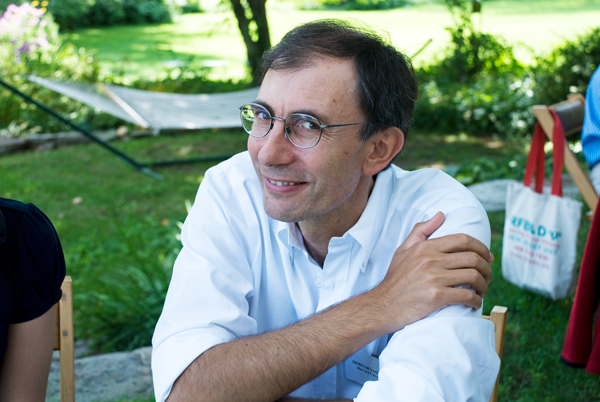
Is Earth the ideal planet for life? What is the future of life in our universe? We often imagine our place in the universe in the same way we experience our lives and the places we inhabit. We imagine a practically static eternal universe where we, and life in general, are born, grow up, and mature; we are merely one of numerous generations.
This is so untrue! We now know that the universe is 14 and Earth life is 4 billion years old: life and the universe are almost peers. If the universe were a 55-year old, life would be a 16-year old teenager. The universe is nowhere close to being static and unchanging either.
Together with this realization of our changing universe, we are now facing a second, seemingly unrelated realization: there is a new kind of planet out there which have been named super-Earths, that can provide to life all that our little Earth does. And more.
DIMITAR SASSELOV: I will start the same way, by introducing my background. I am a physicist, just like Freeman and Seth, in background, but my expertise is astrophysics, and more particularly planetary astrophysics. So that means I'm here to try to tell you a little bit of what's new in the big picture, and also to warn you that my background basically means that I'm looking for general relationships — for generalities rather than specific answers to the questions that we are discussing here today.
So, for example, I am personally more interested in the question of the origins of life, rather than the origin of life. What I mean by that is I'm trying to understand what we could learn about pathways to life, or pathways to the complex chemistry that we recognize as life. As opposed to narrowly answering the question of what is the origin of life on this planet. And that's not to say there is more value in one or the other; it's just the approach that somebody with my background would naturally try to take. And also the approach, which — I would agree to some extent with what was said already — is in need of more research and has some promise.
One of the reasons why I think there are a lot of interesting new things coming from that perspective, that is from the cosmic perspective, or planetary perspective, is because we have a lot more evidence for what is out there in the universe than we did even a few years ago. So to some extent, what I want to tell you here is some of this new evidence and why is it so exciting, in being able to actually inform what we are discussing here. ...
___
DIMITAR SASSELOV is Professor of Astronomy at Harvard University and Director, Harvard Origins of Life Initiative. Most recently his research has led him to explore the nature of planets orbiting other stars. Using novel techniques, he has discovered a few such planets, and his hope is to use these techniques to find planets like Earth. He is the founder and director of the new Harvard Origins of Life Initiative, a multidisciplinary center bridging scientists in the physical and in the life sciences, intent to study the transition from chemistry to life and its place in the context of the Universe.
Dimitar Sasselov's Edge Bio Page
SETH LLOYD
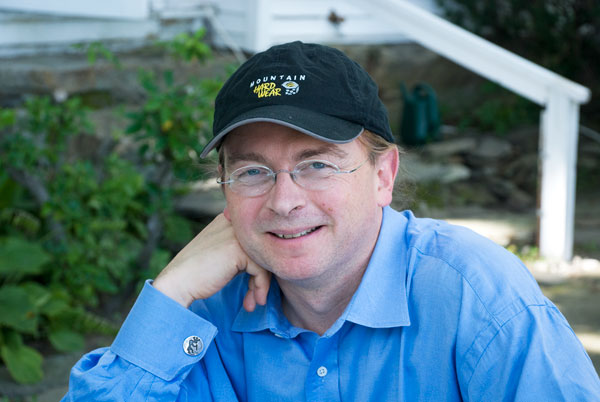
If you program a computer at random, it will start producing other computers, other ways of computing, other more complicated, composite ways of computing. And here is where life shows up. Because the universe is already computing from the very beginning when it starts, starting from the Big Bang, as soon as elementary particles show up. Then it starts exploring — I'm sorry to have to use anthropomorphic language about this, I'm not imputing any kind of actual intent to the universe as a whole, but I have to use it for this to describe it — it starts to explore other ways of computing.
SETH LLOYD: I'd like to step back from talking about life itself. Instead I'd like to talk about what information processing in the universe can tell us about things like life. There's something rather mysterious about the universe. Not just rather mysterious, extremely mysterious. At bottom, the laws of physics are very simple. You can write them down on the back of a T-shirt: I see them written on the backs of T-shirts at MIT all the time, even in size petite. IN addition to that, the initial state of the universe, from what we can tell from observation, was also extremely simple. It can be described by a very few bits of information.
So we have simple laws and simple initial conditions. Yet if you look around you right now you see a huge amount of complexity. I see a bunch of human beings, each of whom is at least as complex as I am. I see trees and plants, I see cars, and as a mechanical engineer, I have to pay attention to cars. The world is extremely complex.
If you look up at the heavens, the heavens are no longer very uniform. There are clusters of galaxies and galaxies and stars and all sorts of different kinds of planets and super-earths and sub-earths, and super-humans and sub-humans, no doubt. The question is, what in the heck happened? Who ordered that? Where did this come from? Why is the universe complex? Because normally you would think, okay, I start off with very simple initial conditions and very simple laws, and then I should get something that's simple. In fact, mathematical definitions of complexity like algorithmic information say, simple laws, simple initial conditions, imply the state is always simple. It's kind of bizarre. So what is it about the universe that makes it complex, that makes it spontaneously generate complexity? I'm not going to talk about super-natural explanations. What are natural explanations — scientific explanations of our universe and why it generates complexity, including complex things like life? ...
___
SETH LLOYD is Professor of Mechanical Engineering at MIT and Director of the W.M. Keck Center for Extreme Quantum Information Theory (xQIT). He works on problems having to do with information and complex systems from the very small—how do atoms process information, how can you make them compute, to the very large — how does society process information? And how can we understand society in terms of its ability to process information? He is the author if Programming the Universe: A Quantum Computer Scientist Takes On the Cosmos.


FRANKFURTER
August 31,.2007
FEUILLETON — Front Page

Let's play God!; Life's questions: J. Craig Venter programs the future(Lasst uns Gott spielen!)By Jordan Mejias
Was Evolution only an interlude? At the invitation of John Brockman, science luminaries such as J. Craig Venter, Freeman Dyson, Seth Lloyd, Robert Shapiro and others discussed the question: What is Life?
EASTOVER FARM, August 30th
It sounds like seaman's yarn that the scientist with the look of an experienced seafarer has in store for us. The suntanned adventurer with the close-clipped grey beard vaunts the ocean as a sea of bacteria and viruses, unimaginable in their varieties. And in their lifestyle, as we might call it. But what do organisms live off? Like man, not off air or love alone. There can be no life without nutrients, it is said. Not true, says the sea dog. Sometimes a source of energy is enough, for instance, when energy is abundantly provided by sunlight. Could that teach us anything about our very special form of life?
J. Craig Venter, the ingenious decoder of the genome, who takes time off to sail around the world on expeditions, balances his flip-flops on his naked feet as he tells us about such astounding phenomena of life. Us, that means a few hand-picked journalists and half a dozen stars of science, invited by John Brockman, the Guru of the all encompassing "Third Culture", to his farm in Connecticut.
Relaxed, always open for a witty remark, but nevertheless with the indispensable seriousness, the scientific luminaries go to work under Brockman's direction. He, the master of the easy, direct question that unfailingly draws out the most complicated answers, the hottest speculations and debates, has for today transferred his virtual salon, always accessible on the Internet under the name Edge, to a very real and idyllic summer's day. This time the subject matter is nothing other than life itself.
When Venter speaks of life, it's almost as if he were reading from the script of a highly elaborate Science Fiction film. We are told to imagine organisms that not only can survive dangerous radiations, but that remain hale and hearty as they journey through the Universe. Still, he of all people, the revolutionary geneticist, warns against setting off in an overly gene-centric direction when trying to track down Life. For the way in which a gene makes itself known, will depend to a large degree upon the aid of overlooked transporter genes. In spite of this he considers the genetic code a better instrument to organize living organisms than the conventional system of classification by species.
Many colleagues nod in agreement, when they are not smiling in agreement. But this cannot be all that Venter has up his sleeve. Just a short while ago, he created a stir with the announcement that his Institute had succeeded in transplanting the genome of one bacterium into another. With this, he had newly programmed an organism. Should he be allowed to do this? A question not only for scientists. Eastover Farm was lacking in ethicists, philosophers and theologians, but Venter had taken precautions. He took a year to learn from the world's large religions whether it was permissible to synthesize life in the lab. Not a single religious representative could find grounds to object. All essentially agreed: It's okay to play God.
Maybe some of the participants would have liked to hear more on the subject, but the day in Nature's lap was for identifying themes, not giving and receiving exhaustive amounts of information. A whiff of the most breathtaking visions, both good and bad, was enough. There were already frightening hues in the ultimate identity theft, to which Venter admitted with his genome exchange. What if a cell were captured by foreign DNA? Wouldn't it be a nightmare in the shape of a genuine Darwinian victory of the strong over the weak? Venter was applying dark colors here, whereas Freeman Dyson had painted us a much more mellow picture of the future.
Dyson, the great, not yet quite eighty-four year old youngster, physicist and futurist, regards evolution as an interlude. According to his calculations, the competition between species has gone on for just three billion years. Before that, according to Dyson, living organisms participated in horizontal gene transfers; if you will, they preferred the peaceful exchange of information among themselves. In the ten thousand years since Homo sapiens conquered the biosphere, Dyson once again sees a return of the old Modus Operandi, although in a modified form.
The scenario goes as follows: Cultural evolution, characterized by the transfer of ideas, has replaced the much slower biological evolution. Today, ideas, not genes, tip the scales. In availing himself of biotechnology, Man has picked up the torn pre-evolutionary thread and revived the genetic back and forth between microbes, plants and animals. Bit by bit the borders between species are disappearing. Soon only one species will remain, namely the genetically modified human, while the rules of Open Source, which guarantee the unhindered exchange of software in computers, will also apply to the exchange of genes. The evolution of life, in nutshell, will return soon to a state of agreeable unity, as it existed in good old pre-Darwinian times, when life had not yet been separated into distinct species.
Though Venter may not trust in this future peace, he nearly matches Dyson in his futuristic enthusiasm. But he is enough of a realist to stress that he has never talked of creating new life from scratch. He is confident that he can develop new species and life forms, but will always have to rely on existing materials that he finds. Even he cannot conjure a cell out of nothing. So far, so good and so humble.
The rest is sheer bravado. He considers manipulation of human genes not only possible, but desirable. There's no question that he will continue to disappoint the inmate who once asked him to fashion an attractive cellmate, just as he refused the wish of an unsavory gentleman who yearned for mentally underdeveloped working-class people. But, Venter asks, who can object to humans having genetically beefed-up Intelligence? Or to new genomes that open the door to new, undreamt-of sources of bio fuel? Nobody at Eastover Farm seemed afraid of a eugenic revival. What in German circles would have released violent controversies, here drifts by unopposed under mighty maple trees that gently whisper in the breeze.
All the same, Venter does confess that such life transforming technology, more powerful than any, humanity could harness until now, inevitably plunges him in doubt, particularly when looking back on human history. Still, he looks toward the future with hope and confidence. As does George Church, the molecular geneticist from Harvard, who wouldn't be surprised if a future computer would be able outperform the human brain. Could resourcefully mixed DNA be helpful to us? The organic chemist Robert Shapiro, Emeritus of New York University, objects strongly to viewing DNA as a monopolistic force. Will he assure us, that life consists of more than DNA? But of what? Is it conceivable that there are certain forms of life we still are unable to recognize? Who wants to confirm that nothing runs without DNA? Why should life not also arise from minerals???These are thoughts to make jaws drop, not only among laymen. Venter also is concerned that Shapiro defines life all too loosely. But both, the geneticist and the chemist focus on the moment at which life is breathed into an inanimate object. This will be, in Venter's opinion, the next milestone in the investigation and conditioning of life. We can no longer beat around the bush: What is Life? Venter declines to answer, he doesn't want to be drawn into philosophical bullshit, as he says. Is a virus a life form? Must life, in order to be recognized as life, be self-reproducing? A colorful butterfly glides through the debate. Life can appear so weightless. And it is so difficult to describe and define.
Seth Lloyd, the quantum mechanic from MIT points out mischievously that we know far more about the origin of the universe than we do about the origin of life. Using the quantum computer as his departing point, he tries to give us an idea of the huge number of possibilities out of which life could have developed. If Albert Einstein did not wish to envisage a dice-playing god, Lloyd, the entertaining thinker, can't help to see only dice-playing, though presumably without the assistance of god. Everything reveals itself in his life panorama as a result of chance, whether here on Earth or in an incomprehensible distance
Astrophysicist Dimitar Sasselov works also under the auspices of chance. Although his field of research necessarily widens our perspective, he can present us only a few places in the universe that could be suitable for life. Only five Super-Earths, as Sasselov calls those planets that are larger than Earth, are known to us at this point. With improved recognition technologies, perhaps a hundred million could be found in the universe in all. No, that is still, distributed throughout and applied to the entire universe, not a grand number. But the number is large enough to give us hope for real co-inhabitants of our universe. Somewhere, sometime, we could encounter microbial life.
Most likely this would be life in a form that we cannot even fathom yet. It will all depend on what we, strange life forms that we are, can acknowledge as life. At Eastover Farm our imaginative powers were already being vigorously tested.
Text: F.A.Z., 31.08.2007, No. 202 / page 33
Translated by Karla taylor

SUEDDEUTSCHE ZEITUNG
September 3, 2007
FEUILLETON — Front Page
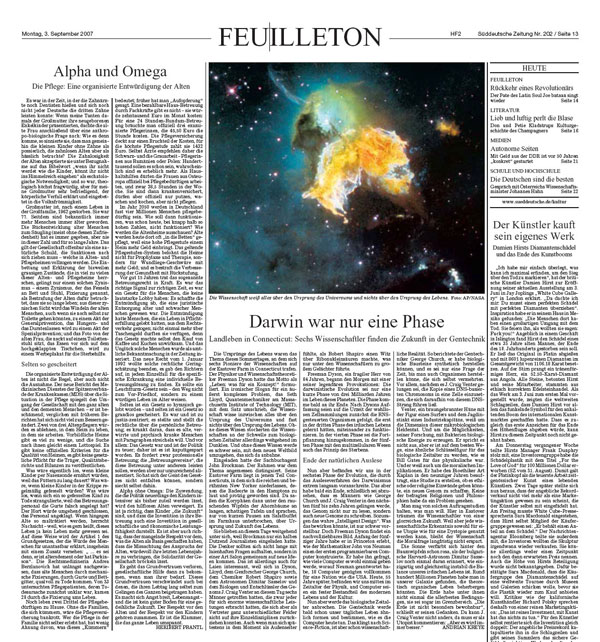
DARWIN WAS JUST A PHASE?(Darwin war nur eine Phase)Country Life in Connecticut: Six scientists find the future in genetic engineering??By Andrian Kreye
The origins of life were the subject of discussion on a summer day when six pioneers of science convened at Eastover Farm in Connecticut. The physicist and scientific theorist Freeman Dyson was the first of the speakers to talk on the theme: "Life: What a Concept!" An ironic slogan for one of the most complex problems. Seth Lloyd, quantum physicist at MIT, summed it up with his remark that scientists now know everything about the origin of the Universe and virtually nothing about the origin of life. Which makes it rather difficult to deal with the new world view currently taking shape in the wake of the emerging age of biology.
The roster of thinkers had assembled at the invitation of literary agent John Brockman, who specializes in scientific ideas. The setting was distinguished. Eastover Farm sits in the part of Connecticut where the rich and famous New Yorkers who find the beach resorts of the Hamptons too loud and pretentious have settled. Here the scientific luminaries sat at long tables in the shade of the rustling leaves of maple trees, breaking just for lunch at the farmhouse.
The day remained on topic, as Brockman had invited only half a dozen journalists, to avoid slowing the thinkers down with an onslaught of too many layman's questions. The object was to have them talk about ideas mainly amongst themselves in the manner of a salon, not unlike his online forum edge.org. Not that the day went over the heads of the non-scientist guests. With Dyson, Lloyd, genetic engineer George Church, chemist Robert Shapiro, astronomer Dimitar Sasselov and biologist and decoder of the genome J. Craig Venter, six men came together, each of whom have made enormous contributions in interdiscplinary sciences, and as a consequence have mastered the ability to talk to people who are not well-read in their respective fields. This made it possible for an outsider to follow the discussions, even if at moments, he was made to feel just that, as when Robert Shapiro cracked a joke about RNA that was met with great laughter from the scientists.
Freeman Dyson, a fragile gentleman of 84 years, opened the morning with his legendary provocation that Darwinian evolution represents only a short phase of three billion years in the life of this planet, a phase that will soon reach its end. According to this view, life began in primeval times with a haphazard assemblage of cells, RNA-driven organisms ensued, which, in the third phase of terrestrial life would have learned to function together. Reproduction appeared on the scene in the fourth phase, multicellular beings and the principle of death appeared in the fifth phase.
The End of Natural Selection
We humans belong to the sixth phase of evolution, which progresses very slowly by way of Darwinian natural selection. But this according to Dyson will soon come to an end, because men like George Church and J. Craig Venter are expected to succeed not only in reading the genome, but also in writing new genomes in the next five to ten years. This would constitute the ultimate "Intelligent Design", pun fully intended. Where this could lead is still difficult to anticipate. Yet Freeman Dyson finds a meaningful illustration. He spent the early nineteen fifties at Princeton, with mathematician John von Neuman, who designed one of the earliest programmable computers. When asked how many computers might be in demand, von Neumann assured him that 18 would be sufficient to meet the demand of a nation like the United States. Now, 55 years later, we are in the middle of the age of physics where computers play an integral role in modern life and culture.
Now though we are entering the age of biology. Soon genetic engineering will shape our daily life to the same extent that computers do today. This sounds like science fiction, but it is already reality in science. Thus genetic engineer George Church talks about the biological building blocks that he is able to synthetically manufacture. It is only a matter of time until we will be able to manufacture organisms that can self-reproduce, he claims. Most notably J. Craig Venter succeeded in introducing a copy of a DNA-based chromosome into a cell, which from then on was controlled by that strand of DNA.
Venter, a suntanned giant with the build of a surfer and the hunting instinct of a captain of industry, understands the magnitude of this feat in microbiology. And he understands the potential of his research to create biofuel from bacteria. He wouldn't dare to say it, but he very well might be a Bill Gates of the age of biology. Venter also understands the moral implications. He approached bioethicist Art Kaplan in the nineties and asked him to do a study on whether in designing a new genome he would raise ethical or religious objections. Not a single religious leader or philosopher involved in the study could find a problem there. Such contract studies are debatable. But here at Eastover Farm scientists dream of a glorious future. Because science as such is morally neutral—every scientific breakthrough can be applied for good or for bad.
The sun is already turning pink behind the treetops, when Dimitar Sasselov, the Bulgarian astronomer from Harvard, once more reminds us how unique and at the same time, how unstable the balance of our terrestrial life is. In our galaxy, astronomers have found roughly one hundred million planets that could theoretically harbor organic life. Not only does Earth not have the best conditions among them; it is actually at the very edge of the spectrum. "Earth is not particularly inhabitable," he says, wrapping up his talk. Here J. Craig Venter cannot help but remark as an idealist: "But it is getting better all the time".
Translated by Karla Taylor
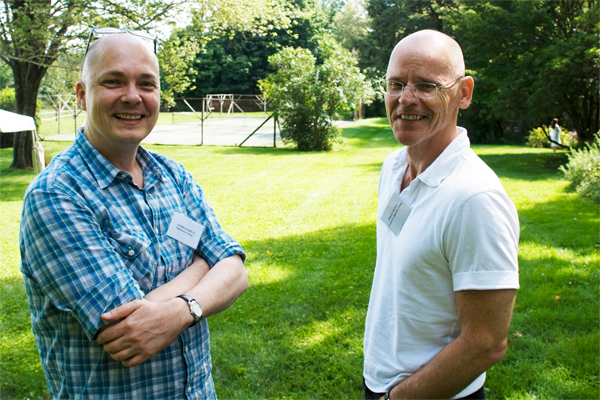
Andrian Kreye, Süddeutsche Zeitung
Jordan Mejias, Frankfurter Allgemeine Zeitung

RICHARD DAWKINS—FREEMAN DYSON: AN EXCHANGE
As part of this year's Edge Event at Eastover Farm in Bethlehem, CT, I invited three of the participants—Freeman Dyson, George Church, and Craig Venter—to come up a day early, which gave me an opportunity to talk to Dyson about his abovementioned essay in New York Review of Books entitled "Our Biotech Future".
I also sent the link to the essay to Richard Dawkins, and asked if he would would comment on what Dyson termed the end of "the Darwinian interlude".
Early the next morning, prior to the all-day discussion (which also included as participants Robert Shapiro, Dimitar Sasselov, and Seth Lloyd) Dawkins emailed his thoughts which I read to the group during the discussion following Dyson's talk. [NOTE: Dawkins asked me to make it clear that his email below "was written hastily as a letter to you, and was not designed for publication, or indeed to be read out at a meeting of biologists at your farm!"].
Now Dyson has responded and the exchange is below.
—JB
RICHARD DAWKINS [8.27.07] Evolutionary Biologist, Charles Simonyi Professor For The Understanding Of Science, Oxford University; Author, The God Delusion

"By Darwinian evolution he [Woese] means evolution as Darwin understood it, based on the competition for survival of noninterbreeding species."
"With rare exceptions, Darwinian evolution requires established species to become extinct so that new species can replace them."
These two quotations from Dyson constitute a classic schoolboy howler, a catastrophic misunderstanding of Darwinian evolution. Darwinian evolution, both as Darwin understood it, and as we understand it today in rather different language, is NOT based on the competition for survival of species. It is based on competition for survival WITHIN species. Darwin would have said competition between individuals within every species. I would say competition between genes within gene pools. The difference between those two ways of putting it is small compared with Dyson's howler (shared by most laymen: it is the howler that I wrote The Selfish Gene partly to dispel, and I thought I had pretty much succeeded, but Dyson obviously hasn't read it!) that natural selection is about the differential survival or extinction of species. Of course the extinction of species is extremely important in the history of life, and there may very well be non-random aspects of it (some species are more likely to go extinct than others) but, although this may in some superficial sense resemble Darwinian selection, it is NOT the selection process that has driven evolution. Moreover, arms races between species constitute an important part of the competitive climate that drives Darwinian evolution. But in, for example, the arms race between predators and prey, or parasites and hosts, the competition that drives evolution is all going on within species. Individual foxes don't compete with rabbits, they compete with other individual foxes within their own species to be the ones that catch the rabbits (I would prefer to rephrase it as competition between genes within the fox gene pool).
The rest of Dyson's piece is interesting, as you'd expect, and there really is an interesting sense in which there is an interlude between two periods of horizontal transfer (and we mustn't forget that bacteria still practise horizontal transfer and have done throughout the time when eucaryotes have been in the 'Interlude'). But the interlude in the middle is not the Darwinian Interlude, it is the Meiosis / Sex / Gene-Pool / Species Interlude. Darwinian selection between genes still goes on during eras of horizontal transfer, just as it does during the Interlude. What happened during the 3-billion-year Interlude is that genes were confined to gene pools and limited to competing with other genes within the same species. Previously (and still in bacteria) they were free to compete with other genes more widely (there was no such thing as a species outside the 'Interlude'). If a new period of horizontal transfer is indeed now dawning through technology, genes may become free to compete with other genes more widely yet again.
As I said, there are fascinating ideas in Freeman Dyson's piece. But it is a huge pity it is marred by such an elementary mistake at the heart of it.
FREEMAN DYSON [8.30.07] Physicist, Institute of Advanced Study, Author, Many Colored Glass: Reflections on the Place of Life in the Universe

Dear Richard Dawkins,
Thank you for the E-mail that you sent to John Brockman, saying that I had made a "school-boy howler" when I said that Darwinian evolution was a competition between species rather than between individuals. You also said I obviously had not read The Selfish Gene. In fact I did read your book and disagreed with it for the following reasons.
Here are two replies to your E-mail. The first was a verbal response made immediately when Brockman read your E-mail aloud at a meeting of biologists at his farm. The second was written the following day after thinking more carefully about the question.
First response. What I wrote is not a howler and Dawkins is wrong. Species once established evolve very little, and the big steps in evolution mostly occur at speciation events when new species appear with new adaptations. The reason for this is that the rate of evolution of a population is roughly proportional to the inverse square root of the population size. So big steps are most likely when populations are small, giving rise to the ``punctuated equilibrium'' that is seen in the fossil record. The competition is between the new species with a small population adapting fast to new conditions and the old species with a big population adapting slowly.
In my opinion, both these responses are valid, but the second one goes more directly to the issue that divides us. Yours sincerely, Freeman Dyson.
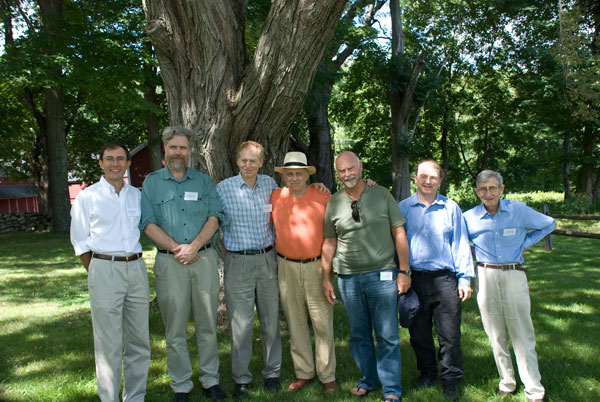
Dimitar Sasselov, George Church, Robert Shapiro, John Brockman,
J. Craig Venter,Seth Lloyd, Freeman Dyson
A SHORT COURSE IN THINKING ABOUT THINKING
Edge Master Class '07
DANIEL KAHNEMAN
Auberge du Soleil, Rutherford, CA, July 20-22, 2007
AN EDGE SPECIAL PROJECT
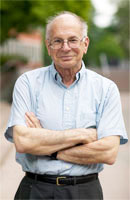

ATTENDEES: Jeff Bezos, Founder, Amazon.com; Stewart Brand, Cofounder, Long Now Foundation, Author, How Buildings Learn; Sergey Brin, Founder, Google; John Brockman, Edge Foundation, Inc.; Max Brockman, Brockman, Inc.; Peter Diamandis, Space Entrepreneur, Founder, X Prize Foundation; George Dyson, Science Historian; Author, Darwin Among the Machines; W. Daniel Hillis, Computer Scientist; Cofounder, Applied Minds; Author, The Pattern on the Stone; Daniel Kahneman, Psychologist; Nobel Laureate, Princeton University; Dean Kamen, Inventor, Deka Research; Salar Kamangar, Google; Seth Lloyd, Quantum Physicist, MIT, Author, Programming The Universe; Katinka Matson, Cofounder, Edge Foundation, Inc.; Nathan Myhrvold, Physicist; Founder, Intellectual Venture, LLC; Event Photographer; Tim O'Reilly, Founder, O'Reilly Media; Larry Page, Founder, Google; George Smoot, Physicist, Nobel Laureate, Berkeley, Coauthor, Wrinkles In Time; Anne Treisman, Psychologist, Princeton University;Jimmy Wales, Founder, Chair, Wikimedia Foundation (Wikipedia).
INTRODUCTION
By John Brockman
Recently, I spent several months working closely with Danny Kahneman, the psychologist who is the co-creator of behavioral economics (with his late collaborator Amos Tversky), for which he won the Nobel Prize in Economics in 2002.
My discussions with him inspired a 2-day "Master Class" given by Kahneman for a group of twenty leading American business/Internet/culture innovators—a microcosm of the recently dominant sector of American business—in Napa, California in July. They came to hear him lecture on his ideas and research in diverse fields such as human judgment, decision making and behavioral economics and well-being.
 Dean Kamen |
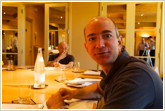 Jeff Bezos |
 Larry Page |
While Kahneman has a wide following among people who study risk, decision-making, and other aspects of human judgment, he is not exactly a household name. Yet among many of the top thinkers in psychology, he ranks at the top of the field.
Harvard psychologist Daniel Gilbert (Stumbling on Happiness) writes: "Danny Kahneman is simply the most distinguished living psychologist in the world, bar none. Trying to say something smart about Danny's contributions to science is like trying to say something smart about water: It is everywhere, in everything, and a world without it would be a world unimaginably different than this one." And according to Harvard's Steven Pinker (The Stuff of Thought): "It's not an exaggeration to say that Kahneman is one of the most influential psychologists in history and certainly the most important psychologist alive today. He has made seminal contributions over a wide range of fields including social psychology, cognitive science, reasoning and thinking, and behavioral economics, a field he and his partner Amos Tversky invented."
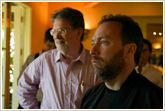 Jimmy Wales |
 Nathan Myhrvold |
 Stewart Brand |
Here are some examples from the national media which illustrate how Kahneman's ideas are reflected in the public conversation:
In the Economist "Happiness & Economics " issue in December, 2006, Kahneman is credited with the new hedonimetry regarding his argument that people are not as mysterious as less nosy economists supposed. "The view that hedonic states cannot be measured because they are private events is widely held but incorrect."
Paul Krugman, in his New York Times column, "Quagmire Of The Vanities" (January 8, 2007), asks if the proponents of the "surge" in Iraq are cynical or delusional. He presents Kahneman's view that "the administration's unwillingness to face reality in Iraq reflects a basic human aversion to cutting one's losses—the same instinct that makes gamblers stay at the table, hoping to break even."
His articles have been picked up by the press and written about extensively. The most recent example is Jim Holt's lede piece in The New York Times Magazine, "You are What You Expect" (January 21, 2007), an article about this year's Edge Annual Question "What Are You Optimistic About?". It was prefaced with a commentary regarding Kahneman's ideas on "optimism bias".
In Jerome Groopman's New Yorker article, "What's the trouble? How Doctors Think" (January 29, 2007), Groopman looks at a medical misdiagnosis through the prism of a heuristic called "availability," which refers to the tendency to judge the likelihood of an event by the ease with which relevant examples come to mind. This tendency was first described in 1973, in Kahneman's paper with Amos Tversky when they were psychologists at the Hebrew University of Jerusalem.
Kahneman's article (with Jonathan Renshon) "Why Hawks Win" was published in Foreign Policy (January/February 2007); Kahneman points out that the answer may lie deep in the human mind. People have dozens of decision-making biases, and almost all favor conflict rather than concession. The article takes a look at why the tough guys win more than they should. Publication came during the run up to Davis, and the article became a focus of numerous discussions and related articles.
The event was an unqualified success. As one of the attendees later wrote: "Even with the perspective a few weeks, I can still think it is one of the all time best conferences that I have ever attended."
 George Smoot |
 Daniel Kahneman |
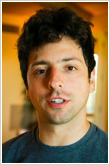 Sergey Brin |
Over a period of two days, Kahneman presided over six sessions lasting about eight hours. The entire event was videotaped as an archive. Edge is pleased to present a sampling from the event consisting of streaming video of the first 10-15 minutes of each session along with the related verbatim transcripts.
—JB
DANIEL KAHNEMAN is Eugene Higgins Professor of Psychology, Princeton University, and Professor of Public Affairs, Woodrow Wilson School of Public and International Affairs. He is winner of the 2002 Nobel Prize in Economic Sciences for his pioneering work integrating insights from psychological research into economic science, especially concerning human judgment and decision-making under uncertainty.
Daniel Kahneman's Edge Bio Page
Daniel Kahneman's Nobel Prize Lecture
SESSION ONE
I'll start with a topic that is called an inside-outside view of the planning fallacy. And it starts with a personal story, which is a true story....
KAHNEMAN: I'll start with a topic that is called an inside-outside view of the planning fallacy. And it starts with a personal story, which is a true story.
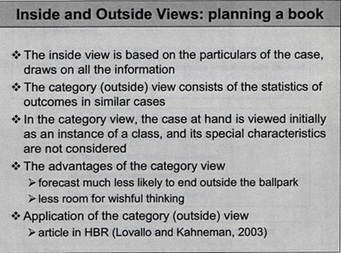
Well over 30 years ago I was in Israel, already working on judgment and decision making, and the idea came up to write a curriculum to teach judgment and decision making in high schools without mathematics. I put together a group of people that included some experienced teachers and some assistants, as well as the Dean of the School of Education at the time, who was a curriculum expert. We worked on writing the textbook as a group for about a year, and it was going pretty well—we had written a couple of chapters, we had given a couple of sample lessons. There was a great sense that we were making progress. We used to meet every Friday afternoon, and one day we had been talking about how to elicit information from groups and how to think about the future, and so I said, Let's see how we think about the future.
I asked everybody to write down on a slip of paper his or her estimate of the date on which we would hand the draft of the book over to the Ministry of Education. That by itself by the way was something that we had learned: you don't want to start by discussing something, you want to start by eliciting as many different opinions as possible, which you then you pool. So everybody did that, and we were really quite narrowly centered around two years; the range of estimates that people had—including myself and the Dean of the School of Education—was between 18 months and two and a half years.
But then something else occurred to me, and I asked the Dean of Education of the school whether he could think of other groups similar to our group that had been involved in developing a curriculum where no curriculum had existed before. At that period—I think it was the early 70s—there was a lot of activity in the biology curriculum, and in mathematics, and so he said, yes, he could think of quite a few. I asked him whether he knew specifically about these groups and he said there were quite a few of them about which he knew a lot. So I asked him to imagine them, thinking back to when they were at about the same state of progress we had reached, after which I asked the obvious question—how long did it take them to finish?
It's a story I've told many times, so I don't know whether I remember the story or the event, but I think he blushed, because what he said then was really kind of embarrassing, which was, You know I've never thought of it, but actually not all of them wrote a book. I asked how many, and he said roughly 40 percent of the groups he knew about never finished. By that time, there was a pall of gloom falling over the room, and I asked, of those who finished, how long did it take them? He thought for awhile and said, I cannot think of any group that finished in less than seven years and I can't think of any that went on for more than ten.
I asked one final question before doing something totally irrational, which was, in terms of resources, how good were we are at what we were doing, and where he would place us in the spectrum. His response I do remember, which was, below average, but not by much. [much laughter]
I'm deeply ashamed of the rest of the story, but there was something really instructive happening here, because there are two ways of looking at a problem; the inside view and the outside view. The inside view is looking at your problem and trying to estimate what will happen in your problem. The outside view involves making that an instance of something else—of a class. When you then look at the statistics of the class, it is a very different way of thinking about problems. And what's interesting is that it is a very unnatural way to think about problems, because you have to forget things that you know—and you know everything about what you're trying to do, your plan and so on—and to look at yourself as a point in the distribution is a very un-natural exercise; people actually hate doing this and resist it.
There are also many difficulties in determining the reference class. In this case, the reference class is pretty straightforward; it's other people developing curricula. But what's psychologically interesting about the incident is all of that information was in the head of the Dean of the School of Education, and still he said two years. There was no contact between something he knew and something he said. What psychologically to me was the truly insightful thing, was that he had all the information necessary to conclude that the prediction he was writing down was ridiculous.
COMMENT: Perhaps he was being tactful.
KAHNEMAN: No, he wasn't being tactful; he really didn't know. This is really something that I think happens a lot—the outside view comes up in something that I call ‘narrow framing,' which is, you focus on the problem at hand and don't see the class to which it belongs. That's part of the psychology of it. There is no question as to which is more accurate—clearly the outside view, by and large, is the better way to go.
Let me just add two elements to the story. One, which I'm really ashamed of, is that obviously we should have quit. None of us was willing to spend seven years writing the bloody book. It was out of the question. We didn't stop and I think that really was the end of rational planning. When I look back on the humor of our writing a book on rationality, and going on after we knew that what we were doing was not worth doing, is not something I'm proud of.
COMMENT: So you were one of the 40 percent in the end.
KAHNEMAN: No, actually I wasn't there. I got divorced, I got married, I left the country. The work went on. There was a book. It took eight years to write. It was completely worthless. There were some copies printed, they were never used. That's the end of that story. ...
SESSION TWO
Let me introduce a plan for this session. I'd like to take a detour, but where I would like to end up is with a realistic theory of risk taking. But I need to take a detour to make that sensible. I'd like to start by telling you what I think is the idea that got me the Nobel Prize—should have gotten Amos Tversky and me the Nobel Prize because it was something that we did together—and it's an embarrassingly simple idea. I'm going to tell you the personal story of this, and I call it "Bernoulli's Error"—the major theory of how people take risks...
KAHNEMAN: Let me introduce a plan for this session. I'd like to take a detour, but where I would like to end up is with a realistic theory of risk taking. But I need to take a detour to make that sensible. I'd like to start by telling you what I think is the idea that got me the Nobel Prize—should have gotten Amos Tversky and me the Nobel Prize because it was something that we did together—and it's an embarrassingly simple idea. I'm going to tell you the personal story of this, and I call it "Bernoulli's Error"—the major theory of how people take risks.
The quick history of the field is that in 1738 Daniel Bernoulli wrote a magnificent essay in which he presented many of the seminal ideas of how people take risks, published at the St. Petersburg Academy of Sciences. And he had a theory that explained why people take risks. Up to that time people were evaluating gambles by expected value, but expected value was never explained with conversion, and why people prefer to get sure things rather than gambles of equal expected value. And so he introduced the idea of utility (as a psychological variable), and that's what people assign to outcomes so they're not computing the weighted average of outcomes where the weights are the probabilities, they're computing the weighted average of the utilities of outcomes. Big discovery—big step in the understanding of it. It moves the understanding of risk taking from the outside world, where you're looking at values, to the inside world, where you're looking at the assignment of utilities. That was a great contribution.
He was trying to understand the decisions of merchants, really, and the example that he analyzes in some depth is the example of the merchant who has a ship loaded with spices, which he is going to send from Amsterdam to St. Petersburg – during the winter—with a 5 percent probability that the ship will be lost. That's the problem. He wants to figure out how the merchant is going to do this, when the merchant is going to decide that it's worth it, and how much insurance the merchant should be willing to pay. All of this he solves. And in the process, he goes through a very elaborate derivation of logarithms. He really explains the idea.
Bernoulli starts out from the psychological insight, which is very straightforward, that losing one ducat if you have ten ducats is like losing a hundred ducats if you have a thousand. The psychological response is proportional to your wealth. That very quickly forces a logarithmic utility function. The merchant assigns a psychological value to different states of wealth and says, if the ship makes it this is how wealthy I will be; if the ship sinks this is my wealth; this is my current wealth; these are the odds; you have a logarithmic utility function, and you figure it out. You know if it's positive, you do it; if it's not positive you don't; and the difference tells you how much you'd be willing to pay for insurance.
This is still the basic theory you learn when you study economics, and in business you basically learn variants on Bernoulli's utility theory. It's been modified, it's axiomatic and formalized, and it's no longer logarithmic necessarily, but that's the basic idea.
When Amos Tversky and I decided to work on this, I didn't know a thing about decision-making—it was his field of expertise. He had written a book with his teacher and a colleague called "Mathematical Psychology" and he gave me his copy of the book and told me to read the chapter that explained utility theory. It explained utility theory and the basic paradoxes of utility theory that have been formulated and the problems with the theory. Among the other things in that chapter were some really extraordinary people—Donald Davidson, one of the great philosophers of the twentieth century, Patrick Suppes—who had fallen love with the modern version of expected utility theory and had tried to measure the utility of money by actually running experiments where they asked people to choose between gambles. And that's what the chapter was about.
I read the chapter, but I was puzzled by something, that I didn't understand, and I assumed there was a simple answer. The gambles were formulated in terms of gains and losses, which is the way that you would normally formulate a gamble—actually there were no losses; there was always the choice between a sure thing and a probability of gaining something. But they plotted it as if you could infer the utility of wealth—the function that they drew was the utility of wealth, but the question they were asking was about gains.
I went back to Amos and I said, this is really weird: I don't see how you can get from gambles of gains and losses to the utility of wealth. You are not asking about wealth. As a psychologist you would know that if it demands complicated mathematical transformation, something is going wrong. If you want the utility of wealth you had better ask about wealth. If you're asking about gains, you are getting the utility of gains; you are not getting the utility of wealth. And that actually was the beginning of the theory that's called "Prospect Theory," which is considered a main contribution that we made. And the contribution is what I call "Bernoulli's Error". Bernoulli thought in terms of states of wealth, which maybe makes intuitive sense when you're thinking of the merchant. But that's not how you think when you're making everyday decisions. When those great philosophers went out to do their experiments measuring utility, they did the natural thing—you could gain that much, you could have that much for sure, or have a certain probability of gaining more. And wealth is not anywhere in the picture. Most of the time people think in terms of gains and losses.
There is no question that you can make people think in terms of wealth, but you have to frame it that way, you have to force them to think in terms of wealth. Normally they think in terms of gains and losses. Basically that's the essence of Prospect Theory. It's a theory that's defined on gains and losses. It adds a parameter to Bernoulli's theory so what I call Bernoulli's Error is that he is short one parameter.
I will tell you for example what this means. You have somebody who's facing a choice between having—I won't use large units, I'll use the units I use for my students—2 million, or an equal probability of having one or four. And those are states of wealth. In Bernoulli's account, that's sufficient. It's a well-defined problem. But notice that there is something that you don't know when you're doing this: you don't know how much the person has now.
So Bernoulli in effect assumes, having utilities for wealth, that your current wealth doesn't matter when you're facing that choice. You have a utility for wealth, and what you have doesn't matter. Basically the idea that you're figuring gains and losses means that what you have does matter. And in fact in this case it does.
When you stop to think about it, people are much more risk-averse when they are looking at it from below than when they're looking at it from above. When you ask who is more likely to take the two million for sure, the one who has one million or the one who has four, it is very clear that it's the one with one, and that the one with four might be much more likely to gamble. And that's what we find.
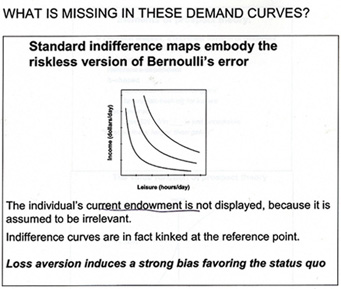
So Bernoulli's theory lacks a parameter. Here you have a standard function between leisure and income and I ask what's missing in this function. And what's missing is absolutely fundamental. What's missing is, where is the person now, on that tradeoff? In fact, when you draw real demand curves, they are kinked; they don't look anything like this. They are kinked where the person is. Where you are turns out to be a fundamentally important parameter.
Lots of very very good people went on with the missing parameter for three hundred years—theory has the blinding effect that you don't even see the problem, because you are so used to thinking in its terms. There is a way it's always done, and it takes somebody who is naïve, as I was, to see that there is something very odd, and it's because I didn't know this theory that I was in fact able to see that.
But demand curves are wrong. You always want to know where the person is. ...
SESSION THREE
The word "utility" that was mentioned this morning has a very interesting history – and has had two very different meanings. As it was used by Jeremy Bentham, it was pain and pleasure—the sovereign masters that govern what we do and what we should do – that was one concept of utility. In economics in the twentieth century, and that's closely related to the idea of the rational agent model, the meaning of utility changed completely to become what people want. Utility is inferred from watching what people choose, and it's used to explain what they choose. Some columnist called it "wantability". It's a very different concept...
The word "utility" that was mentioned this morning has a very interesting history – and has had two very different meanings. As it was used by Jeremy Bentham, it was pain and pleasure—the sovereign masters that govern what we do and what we should do – that was one concept of utility. In economics in the twentieth century, and that's closely related to the idea of the rational agent model, the meaning of utility changed completely to become what people want. Utility is inferred from watching what people choose, and it's used to explain what they choose. Some columnist called it "wantability". It's a very different concept.
One of the things I did some 15 years ago was draw a distinction, which obviously needed drawing. between them just to give them names. So "decision utility" is the weight that you assign to something when you're choosing it, and "experience utility", which is what Bentham wanted, is the experience. Once you start doing that, a lot of additional things happen, because it turns out that experience utility can be defined in at least two very different ways. One way is when a dentist asks you, does it hurt? That's one question that's got to do with your experience of right now. But what about when the dentist asks you, Did it hurt? and he's asking about a past session. Or it can be Did you have a good vacation? You have experience utility, which is everything that happens moment by moment by moment, and you have remembered utility, which is how you score the experience once it's over.
And some fifteen years ago or so, I started studying whether people remembered correctly what had happened to them. It turned out that they don't. And I also began to study whether people can predict how well they will enjoy what will happen to them in future. I used to call that "predictive utility", but Dan Gilbert has given it a much better name; he calls it "affective forecasting". This predicts what your emotional reactions will be. It turns out people don't do that very well, either.
Just to give you a sense of how little people know, my first experiment with predictive utility asked whether people knew how their taste for ice cream would change. We ran an experiment at Berkeley when we arrived, and advertised that you would get paid to eat ice cream. We were not short of volunteers. People at the first session were asked to list their favorite ice cream and were asked to come back. In the first experimental session they were given a regular helping of their favorite ice cream, while listening to a piece of music—Canadian rock music—that I had actually chosen. That took about ten-fifteen minutes, and then they were asked to rate their experience.
Afterward, they were also told, because they had undertaken to do so, that they would be coming to the lab every day at the same hour for I think eight working days, and every day they would have the same ice cream, the same music, and rate it. And they were asked to predict their rating tomorrow and their rating on the last day.
It turns out that people can't do this. Most people get tired of the ice cream, but some of them get kind of addicted to the ice cream, and people do not know in advance which category they will belong to. The correlation between what the change that actually happened in their tastes and the change that they predicted was absolutely zero.
It turns out—this I think is now generally accepted—that people are not good at affective forecasting. We have no problem predicting whether we'll enjoy the soup we're going to have now if it's a familiar soup, but we are not good if it's an unfamiliar experience, or a frequently repeated familiar experience. Another trivial case: we ran an experiment with plain yogurt, which students at Berkeley really didn't like at all, we had them eat yogurt for eight days, and after eight days they kind of liked it. But they really had no idea that that was going to happen. ...
SESSION FOUR
Fifteen years ago when I was doing those experiments on colonoscopies and the cold pressure stuff, I was convinced that the experience itself is the only one that matters, and that people just make a mistake when they choose to expose themselves to more pain. I thought it was kind of obvious that people are making a mistake—particularly because when you show people the choice, they regret it—they would rather have less pain than more pain. That led me to the topic of well-being, which is the topic that I've been focusing on for more than ten years now...
Fifteen years ago when I was doing those experiments on colonoscopies and the cold pressure stuff, I was convinced that the experience itself is the only one that matters, and that people just make a mistake when they choose to expose themselves to more pain. I thought it was kind of obvious that people are making a mistake—particularly because when you show people the choice, they regret it—they would rather have less pain than more pain. That led me to the topic of well-being, which is the topic that I've been focusing on for more than ten years now. And the reason I got interested in that was that in the research on well-being, you can again ask, whose well-being do we care for? The remembering self?—and I'll call that the remembering-evaluating self; the one that keeps score on the narrative of our life—or the experiencing self? It turns out that you can distinguish between these two. Not surprisingly, essentially all the literature on well-being is about the remembering self.
Millions of people have been asked the question, how satisfied are you with your life? That is a question to the remembering self, and there is a fair amount that we know about the happiness or the well-being of the remembering self. But the distinction between the remembering self and the experiencing self suggests immediately that there is another way to ask about well-being, and that's the happiness of the experiencing self.
It turns out that there are techniques for doing that. And the technique—it's not at all my idea—is experience sampling. You may be familiar with that—people have a cell phone or something that vibrates several times a day at unpredictable intervals. Then they get questions on the screen that say, what are you doing? and there is a menu—and Who are you with? and there is a menu—and How do you feel about it ?—and there is a menu of feelings.
This comes as close as you can to dispensing with the remembering self. There is an issue of memory, but the span of memory is really seconds, and people take a few seconds to do that; it's quite efficient, then you can collect a fair amount of data. So some of what I'm going to talk about is the two pictures that you get, which are not exactly the same, when you look at what makes people satisfied with their life and makes them have a good time.
But first I thought I'd show you the basic puzzles of well-being. There is a line on the "Easterlin Paradox" that goes almost straight up, which is GDP per capita. The line that isn't going anywhere is the percentage of people who say they are very happy. And that's a remembering self-type of question. It's one big puzzle of the well-being research, and it has gotten worse in the last two weeks because there are now new data on international comparisons that makes the puzzle even more surprising.
But this is within-country. And within the United States, it's the same for Japan, over a period where real income grew by a factor of four or more, you get nothing on life satisfaction. Which is sort of troubling for economists, because things are improving. I once had that conversation with an economist, David Card, at Berkeley—he used to be at Princeton—and asked him, how would an economist measure well-being? He looked at me as if I were asking a silly question and said, "income of course". I said, well what's the next measure? He said, "log income". [laughter] And the general idea is that the more money you have, the more choices you have—the more options you have—and that giving people more options can only make them better off . This is the fundamental idea of economic analysis. It turns out probably to be false, but it doesn't correspond to these data. So Easterlin as an economist caused some distress in the profession with these results.
So what is the puzzle here? The puzzle is related to the affective forecasting that most people believe that circumstances like becoming richer will make them happier. It turns out that people's beliefs about what will make them happier are mostly wrong, and they are wrong in a directional way, and they are wrong very predictably. And there is a story here that I think is interesting.
When people did studies of various categories of people, like the rich and the poor, you find differences in life satisfaction. But everybody looks at those differences is surprised by how small they are relative to the variability within each of these categories. You address the healthy and the unhealthy: very small differences.
Age—people don't like the idea of aging, but, at least in the United States, people do not become less happy or less satisfied with their life as they age. So a lot of the standard beliefs that people have about life satisfaction turn out to be false. This is a whole line of research—I was doing predictive utility, and Dan Gilbert invented the term "affective forecasting", which is a wonderful term, and did a lot of very insightful studies on that.
As an example of the kinds of studies he did, he asked people —I think he started that research in '92 when Bush became governor of Texas, running against Ann Richards—before the election, (Democrats and Republicans), how happy do you think you will be depending on whether Ann Richards or George Bush is elected. People thought that it would actually make a big difference. But two weeks after the election, you come back and you get their life satisfaction or their happiness and it's a blip, or nothing at all.
QUESTION: What about four years later?
KAHNEMAN: And interestingly enough, you know, there is an effect of political events on life satisfaction. But that effect, like the effect of other things like being a paraplegic or getting married, are all smaller than people expect.
COMMENT: Unless something goes really wrong.
KAHNEMAN: Unless something goes terribly wrong. ...
SESSION FIVE
I'll start with a couple of psychological notions.
There seems to be a very general psychological principle at work here, which is that sometimes when you are asked a question that is difficult, the mind doesn't stay silent if it doesn't have the answer. The mind produces something, and what it produces very characteristically is the answer to an easier but related question. That's one of the heuristics of good problem-solving, but it is a system one operation, which is an operation that takes place by itself.
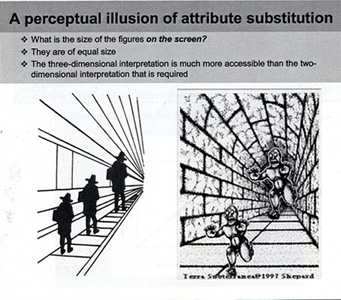
The visual illusions that you have here are that kind of thing because the question that people are asked is, what is the size of the three men on the page? When you look at it, you get a pretty compelling illusion (as it turns out to be) that the three men are not the same size on the page. They are different sizes. It is the same thing with the two monsters. When you take a ruler to them, they are of course absolutely identical. Now what seems to be happening here, is that we see the images three-dimensionally. If they were photographs of three-dimensional objects, of scenes, then indeed the person to the right would be taller than the person to the left. What's interesting about this is that people are not confused about the question that they've been asked; if you ask them how large the people are, they answer in fractions of an inch. They answer in centimeters, not meters. They know that they are supposed to give the two-dimensional size. they just cannot. What they do is give you something that is a scaling of a three-dimensional experience, and we call that "attribute substitution". That is, you try to judge an attribute and you end up judging something else. It turns out that this happens everywhere.
So the example I gave yesterday about happiness and dating is the same thing; you ask people how happy they are, and they tell you how happy they are with their romantic life, if that happens to be what's on the top of their mind at that moment. They are just substituting.
Here is another example. Some ten or fifteen years ago when there were terrorism scares in Europe but not in the States, people who were about to travel to Europe were asked questions like, How much would you pay for insurance that would return a hundred thousand dollars if during your trip you died for any reason. Alternatively other people were asked, how much would you pay for insurance that could pay a hundred thousand dollars if you died in a terrorist incident during your trip. People pay a lot more for the second policy than for the first. What is happening here is exactly what was happening with prolonging, the colonoscopy. And in fact psychologically– I won't have the time to go into the psychology unless you press me—but psychologically the same mechanism produces those violations of dominance, and basically what you're doing there is substituting fear.
You are asked how much insurance you would pay, and you don't know—it's a very hard thing to do. You do know how afraid you are, and you're more afraid of dying in a terrorist accident than you're afraid of dying. So you end up paying more because you map your fear into dollars and that's what you get.
Now if you ask people the two questions next to each other, you may get a different answer, because they see that one contains the other. A post-doc had a very nice idea. You ask people, How many murders are there every year in Michigan, and the median answer is about a hundred. You ask people how many murders are there every year in Detroit, and the median estimate is about two hundred. And again, you can see what is happening. The people who notice that, "oh, Michigan: Detroit is there" will not make that mistake. Or if asked the two questions next to each other, many people will understand and will do it right.
The point is that life serves us problems one at a time; we're not served with problems where the logic of the comparison is immediately evident so that we'll be spared the mistake. We're served with problems one at a time, and then as a result we answer in ways that do not correspond to logic.
In the case of time, we took the average instead of the integral. And we take the average instead of the integral in many other situations. Contingent valuation is a method where you survey people and ask them how much you should pay for different public goods. It's used in litigation, especially in environmental litigation; it's used in cost-benefit analysis—I think it's no good whatsoever, but this is an example to study.
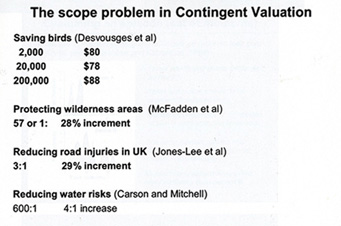
How much would you pay to save birds from drowning in oil ponds? There is a whole scenario of how the poor birds mistake the oil ponds for real water ponds, and so how much should we pay to basically cover the oil ponds with netting to prevent that from happening. Surprisingly, people are willing to pay quite a bit once you describe the scenario well enough. But one thing is, it doesn't matter what the number of birds is. Two thousand birds, two hundred thousand, two million, they will pay exactly the same amount.
QUESTION: This is not price per bird?
KAHNEMAN: No, this is total. And so the reason is the same reason that you had with time, taking an average instead of an integral. You're not thinking of saving two hundred thousand birds. You are thinking of saving a bird. The emotion is associated with the idea of saving a bird from drowning. The quantity is completely separate. Basically you're representing the whole set by a prototype incident, and you evaluate the prototype incident. All the rest are like that.
When I was living in Canada, we asked people how much money they would be willing to pay to clean lakes from acid rain in the Halliburton region of Ontario, which is a small region of Ontario. We asked other people how much they would be willing to pay to clean lakes in all of Ontario.
People are willing to pay the same amount for the two quantities because they are paying to participate in the activity of cleaning a lake, or of cleaning lakes. How many lakes there are to clean is not their problem. This is a mechanism I think people should be familiar with. The idea that when you're asked a question, you don't answer that question, you answer another question that comes more readily to mind. That question is typically simpler; it's associated, it's not random; and then you map the answer to that other question onto whatever scale there is—it could be a scale of centimeters, or it could be a scale of pain, or it could be a scale of dollars, but you can recognize what is going on by looking at the variation in these variables. I could give you a lot of examples because one of the major tricks of the trade is understanding this attribute substitution business. How people answer questions.
COMMENT: So for example in the Save the Children—types of programs, they focus you on the individual.
KAHNEMAN: Absolutely. There is even research showing that when you show pictures of ten children, it is less effective than when you show the picture of a single child. When you describe their stories, the single instance is more emotional than the several instances and it translates into the size of contributions.
People are almost completely insensitive to amount in system one. Once you involve system two and systematic thinking, then they'll act differently. But emotionally we are geared to respond to images and to instances, and when we do that we get what I call "extension neglect." Duration neglect is an example of, you have a set of moments and you ignore how many moments there are. You have a set of birds and you ignore how many birds there are. ...
SESSION SIX
The question I'd like to raise is something that I'm deeply curious about, which is what should organizations do to improve the quality of their decision-making? And I'll tell you what it looks like, from my point of view.
I have never tried very hard, but I am in a way surprised by the ambivalence about it that you encounter in organizations. My sense is that by and large there isn't a huge wish to improve decision-making—there is a lot of talk about doing so, but it is a topic that is considered dangerous by the people in the organization and by the leadership of the organization. I'll give you a couple of examples. I taught a seminar to the top executives of a very large corporation that I cannot name and asked them, would you invest one percent of your annual profits into improving your decision-making? They looked at me as if I was crazy; it was too much.
I'll give you another example. There is an intelligence agency, and the CIA, and a lot of activity, and there are academics involved, and there is a CIA university. I was approached by someone there who said, will you come and help us out, we need help to improve our analysis. I said, I will come, but on one condition, and I know it will not be met. The condition is: if you can get a workshop where you get one of the ten top people in the organization to spend an entire day, I will come. If you can't, I won't. I never heard from them again.
What you can do is have them organize a conference where some really important people will come for three-quarters of an hour and give a talk about how important it is to improve the analysis. But when it comes to, are you willing to invest time in doing this, the seriousness just vanishes. That's been my experience, and I'm puzzled by it.
Since I'm in the right place to raise that question, with the right people to raise the question, I will. What do you think? Where did this come from; can it be fixed; can it be changed; should it be changed? What is your view, after we have talked about these things?
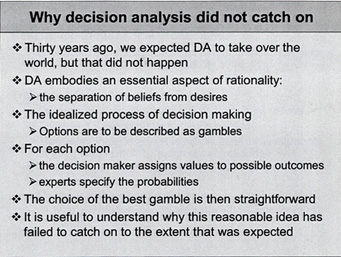
One of my slides concerned why decision analysis didn't catch on. And it's actually a talk I prepared because 30 years ago we all thought that decision analysis was going to conquer the world. It was clearly the best way of doing things—you took Bayesian logic and utility theory, a consistent thing, and—you had beliefs to be separated from values, and you would elicit the values of the organization, the beliefs of the organization, and pull them together. It looked obviously like the way to go, and basically it's a flop.Some organizations are still doing it, but it really isn't what it was intended to be 30 years ago. ...
"This goes beyond all known schmoozing. This is like some kind of virtual-intellectual conspiracy-in-restraint-of-trade."
— Bruce Sterling
|
EDGE CONVERSATION
CHANGING LIFESTYLE CHANGES GENE EXPRESSION Founder and president of the non-profit Preventive Medicine Research Institute
|
|||
|
|
|||
|
EDGE CONVERSATION
LIFE IS THE WAY THE ANIMAL IS IN THE WORLD Professor of Philosophy at the University of California; Author, Out of Our Heads
|
|||
|
|
|||
|
EDGE CONVERSATION
A RULE OF THE GAME Curator, Serpentine Gallery, London; Editor: A Brief History of Curating; Formulas for Now
|
|||
|
|
|||
|
EDGE MASTER CLASS 2008 |
|||
|
|
|||
|
IMPROVING CHOICES WITH MACHINE READABLE DISCLOSURE (CLASS 2) THALER: Father of Behavioral Economics; Director, Center for Decision Research, University of Chicago Graduate School of Business; Co-Author, Nudge At a minimum, what we're saying is that in every market where there is now required written disclosure, you have to give the same information electronically and we think intelligently how best to do that. In a sentence that's the nature of the proposal.
|
|||
|
|
|||
|
THE PSYCHOLOGY OF SCARCITY (CLASS 3) Professor of Economics at Harvard Nathan Myhrvold, Richard Thaler, Daniel Kahneman, France LeClerc, Danny Hillis, Paul Romer, George Dyson, Elon Musk, Jeff Bezos, Sean Parker Let's put aside poverty alleviation for a second, and let's ask, "Is there something intrinsic to poverty that has value and that is worth studying in and of itself?" One of the reasons that is the case is that, purely aside from magic bullets, we need to understand are there unifying principles under conditions of scarcity that can help us understand behavior and to craft intervention. If we feel that conditions of scarcity evoke certain psychology, then that, not to mention pure scientific interest, will affect a vast majority of interventions. It's an important and old question. |
|||
|
|
|||
|
TWO BIG THINGS HAPPENING IN PSYCHOLOGY TODAY (CLASS 4) Eugene Higgins Professor of Psychology; Author, Thinking Fast and Slow
There's new technology emerging from behavioral economics and we are just starting to make use of that. I thought the input of psychology into economics was finished but clearly it's not! THE REALITY CLUB W. Daniel Hillis, Daniel Kahneman, Nathan Myhrvold, Richard Thaler on "Two Big Things Happening In Psychology Today" |
|||
|
|
|||
|
THE IRONY OF POVERTY (CLASS 5) Professor of Economics at Harvard I want to close a loop, which I'm calling "The Irony of Poverty." On the one hand, lack of slack tells us the poor must make higher quality decisions because they don't have slack to help buffer them with things. But even though they have to supply higher quality decisions, they're in a worse position to supply them because they
|
|
EDGE CONVERSATION
MODELING THE FUTURE Climatologist, is a professor in the Department of Biological Sciences Warming is unequivocal, that's true. But that's not a sophisticated question. A much more sophisticated question is how much of the climate Ma Earth, a perverse lady, gives us is from her, and how much is caused by us. That's a much more sophisticated, and much more difficult question. |
|
|
|
|
|
EDGE CONVERSATION
ANTS HAVE ALGORITHMS Assistant Professor, Department of Ecology and Evolutionary Biology, Princeton University
|
|
|
|
|
|
EDGE CONVERSATION
SOCIAL NETWORKS ARE LIKE THE EYE Physician and Social Scientist, Harvard University; Coauthor, Connected: The Surprising Power of Our Social Networks and How They Shape Our Lives
|
|
|
|
|
|
EDGE CONVERSATION
ENGINEERING BIOLOGY Assistant Professor of Bioengineering, Stanford University
|
|
|
|
|
|
EDGE CONVERSATION
THE IMPLICIT ASSOCIATION TEST ANTHONY GREENWALD is Professor of Psychology at University of Washington MAHZARIN BANAJI Psychologist; Richard Clarke Cabot Professor of Social Ethics, Department of Psychology, Harvard University
"The IAT provides a useful window into some otherwise difficult-to-detect contents of our minds. It may be "an inconvenient truth" that what's there is not what we thought was there or want to be there. But I think it is generally something we can come to grips with." — Anthony Greenwald |
|
|
|
|
|
EDGE MASTER CLASS 2007 |
|
|
|
|
|
Eugene Higgins Professor of Psychology; Author, Thinking Fast and Slow
|
|
|
|
|
|
Eugene Higgins Professor of Psychology; Author, Thinking Fast and Slow
|
|
|
|
|
|
Eugene Higgins Professor of Psychology; Author, Thinking Fast and Slow
|
|
|
|
|
|
Eugene Higgins Professor of Psychology; Author, Thinking Fast and Slow
|
|
|
|
|
|
Eugene Higgins Professor of Psychology; Author, Thinking Fast and Slow
|
|
|
|
|
|
Eugene Higgins Professor of Psychology; Author, Thinking Fast and Slow
|
|
|
|
|
|
EDGE SEMINAR 2007 |
|
|
|
|
|
LIFE: WHAT A CONCEPT! Professor of Physics, Institute for Advanced Study; Author, Many Colored Glass; The Scientist as Rebel
|
|
|
|
|
|
LIFE: WHAT A CONCEPT! Professor, Harvard University, Director, Personal Genome Project
|
|
|
|
|
|
LIFE: WHAT A CONCEPT! Leading scientist of the 21st century for Genomic Sciences; Co-Founder, Chairman, CEO, Co-Chief Scientific Officer, Synthetic Genomics, Inc.; Founder, President and Chairman of the J. Craig Venter Institute; author, A Life Decoded We're just at the tip of the iceberg of what the divergence is on this planet. We are in a linear phase of gene discovery maybe in a linear phase of unique biological entities if you call those species, discovery, and I think eventually we can have databases that represent the gene repertoire of our planet. |
|
|
|
|
|
LIFE WHAT A CONCEPT Professor Emeritus of Chemistry and Senior Research Scientist, New York University; Author, Planetary Dreams
|
|
|
|
|
|
LIFE: WHAT A CONCEPT! Professor of Astronomy, Harvard University; Director, Harvard Origins of Life Initiative
|
|
|
|
|
|
LIFE: WHAT A CONCEPT! Professor of Quantum Mechanical Engineering, MIT; Author, Programming the Universe
|
|
|
|
|
|
EDGE CONVERSATION
RECURSION AND HUMAN THOUGHT Linguistic Researcher; Dean of Arts and Sciences, Bentley University; Author, Language: The Cultural Tool
|
|
|
|
|
|
EDGE CONVERSATION Professor of Evolutionary Developmental Biology, Imperial College; Author, Mutants
|
|
|
|
|
|
EDGE CONVERSATION
A COOPERATIVE FORAGING EXPERIMENT: LESSONS FROM ANTS Research Fellow in Evolutionary Biology, Institute of Zoology, Zoological Society of London
|
|
|
|
|
|
EDGE CONVERSATION
HOW OUR LIMBS ARE PATTERNED LIKE THE FRENCH FLAG Professor of Biology, University College London
|
|
|
|
|
|
EDGE CONVERSATION
SO WOMEN HAVE BETTER EMPATHY THAN MEN? Psychologist, Autism Research Centre, Cambridge University; Author, Zero Degrees of Empathy
"It turns out that when you test newborn babies—this experiment was done at the age of 24 hours old, where we had 100 babies who were tested looking at two kinds of objects—a human face and a mechanical mobile. And they were filmed for how long they looked at each of these two objects. What you can see here is that on the first day of life, we had more boys than girls looking for longer at the mechanical mobile and more girls than boys looking at the face. So you can see that these differences when they emerge, first of all they seem to emerge very early—at birth—suggesting that there may be a biological component to a sex difference in, in this case, interest in faces; and secondly, they don't apply to all males or all females, these differences emerge as statistical trends when you compare groups." |
|
|
|
|
|
EDGE CONVERSATION
A FULL-FORCE STORM WITH GALE WINDS BLOWING Evolutionary Biologist; Professor of Anthropology and Biological Sciences, Rutgers University; Author, The Folly of Fools
|
Last year Edge received an invitation from Juan Insua, Director of Kosmpolis, a traditional literary festival in Barcelona, to stage an event at Kosmopolis 05 as part of an overall program "that ranges from the lasting light of Cervantes to the (ambiguous) crisis of the book format, from a literary mapping of Barcelona's Raval district to the dilemma raised by the influence of the Internet in the kitchen of writing, from the emergence of a new third culture humanism to the diverse practices that position literature at the core of urban creativity."
|
|
|
|
Eduard Punset — Redes-TV |
|

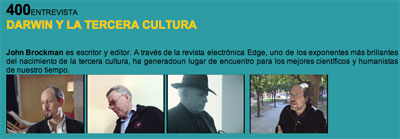
Click for information on "Darwin Y La Tercera Cultura" on Redes TV
Click here for a 2-minute tv clip

Las nuevas lecturas del 'Quijote' copan los actos de Kosmopolis
Israel Punzano — Barcelona
EL PAÍS - Cultura - 04-12-2005
Cervantes was not the the only protagonist of the second day of Kosmopolis. Also debated was the influence of Darwin's theory of the natural selection in the advances of diverse scientific disciplines, that include evolutionary biology to neuroscience to cosmology. In this colloquy, which also covered the future of the humanism, were the cosmologist Lee Smolin, the biologist Robert Trivers and the neurocientist Marc Hauser. The presentation of the event was Eduard Punset and the moderator was John Brockman, who is know for spreading scientific publications. Smolin emphasized the importance of the investigations of Darwin in the later development of Einstein's theory of the relativity and wondered if we were prepared to accept a world without absolute laws, where everything changes. Hauser pointed out that the revolution of Darwin's revolution was also about morality, as it counters the rationality of Kant and the predominance of emotions in Hume.

Brockman: "Hoy la cultura es la ciencia, los intelectuales de letras estan desfasados"
Justo Barranco — 05/12/2005 — Barcelona
"The thinkers of the third culture are the new public intellectuals" as "science is the only news"... "Nobody voted the electricity, the Internet, the birth control pill, or for fire. "The great inventions that change everything involves technology based on science "... "It is critical to participate in the discussion of such questions today as the culture is science."

TRIBUNA: JOHN BROCKMAN
La tercera cultura en Kosmopolis
John Brockman
EL PAÍS - 05-12-2005
In terms of science, the third culture is front and center: geneticist J. Craig Venter is attempting to create synthetic genes as an answer to our energy needs; biologist Robert Trivers is exploring the evolutionary basis for deceit and self-deception in human nature; biologist Ian Wilmut, who cloned Dolly the sheep, is using nuclear transfer to produce embryonic stem cells for research purposes and perhaps eventually as cures for disease; cosmologist Lee Smolin researches the Darwinian evolution of universes; quantum physicist Seth Lloyd is attempting to build quantum computers; psychologist Marc D. Hauser is examining our moral minds; and computer scientists Sergey Brin and Larry Page of Google are radically altering both the way we search for information, as well as the way we think.

CULTURA
Kosmopolis, literatura a la ultima
Eva Belmonte
December 3, 2005
Kosmopolis 2005. Celebration of International of Literature in the Center of Contemporanea Culture of Barcelona (CCCB).
...The relation between science and the third culture was another one of the subjects of debate of this Celebration of Literature. Four personalities of the scientific world participated in the Third Culture event. They are Robert Trivers, John Brockman, Marc Hauser and Lee Smolin. They demonstrated that Literature is not is not just the province of the old school of the humanities culture.

 Can a person be considered cultured today with only slight knowledge of fields such as molecular biology, artificial intelligence, chaos theory, fractals, biodiversity, nanotechnology or the human genome? Can we construct a proposal of universal knowledge without such knowledge? The integration of "literary culture" and "scientific culture" is the basis for what some call the "third culture": a source of metaphors that renews not only the language, but also the conceptual tookit of classic humanism
Can a person be considered cultured today with only slight knowledge of fields such as molecular biology, artificial intelligence, chaos theory, fractals, biodiversity, nanotechnology or the human genome? Can we construct a proposal of universal knowledge without such knowledge? The integration of "literary culture" and "scientific culture" is the basis for what some call the "third culture": a source of metaphors that renews not only the language, but also the conceptual tookit of classic humanism
The New Humanists
SALVADOR PÁNIKER
A polifacética figure
Brockman and the New Intellectuals
Interview
"Science won the battle"
SALVADOR LLOPART
"¿Qué queda del marxismo? ¿Qué queda de Freud? La neurociencia le ha dejado como una superstición del siglo XVIII, de ideas irrelevantes"

...there is a deep relation between Einstein's notion that everything is just a network of relations and Darwin's notion because what is an ecological community but a network of individuals and species in relationship which evolve? There's no need in the modern way of talking about biology for any absolute concepts for any things that were always true and will always be true.—Lee Smolin
...what I'm interested in is how science can now come together with moral philosophy and do some interesting work at the overlap areas. This is not to say that science takes over philosophy, by no means. It works together with philosophy, to figure out what the deep issues are, what the overlapping areas are, and how we can meet together.—Marc D. Hauser
I believe that self-deception evolves in the service of deceit. That is, that the major function of self-deception is to better deceive others. Both make it harder for others to detect your deception, and also allow you to deceive with less immediate cognitive cost. So if I'm lying to you now about something you actually care about, you might pay attention to my shifty eyes if I'm consciously lying, or the quality of my voice, or some other behavioral cue that's associated with conscious knowledge of deception and nervousness about being detected. But if I'm unaware of the fact that I'm lying to you, those avenues of detection will be unavailable to you. —Robert Trivers
TRIVERS, SMOLIN, HAUSER,: "DARWIN Y LA TERCERA CULTURA" IN BARCELONA
 Last year Edge received an invitation from Juan Insua, Director of Kosmpolis, a traditional literary festival in Barcelona, to stage an event at Kosmopolis 05 as part of an overall program "that ranges from the lasting light of Cervantes to the (ambiguous) crisis of the book format, from a literary mapping of Barcelona's Raval district to the dilemma raised by the influence of the Internet in the kitchen of writing, from the emergence of a new third culture humanism to the diverse practices that position literature at the core of urban creativity."
Last year Edge received an invitation from Juan Insua, Director of Kosmpolis, a traditional literary festival in Barcelona, to stage an event at Kosmopolis 05 as part of an overall program "that ranges from the lasting light of Cervantes to the (ambiguous) crisis of the book format, from a literary mapping of Barcelona's Raval district to the dilemma raised by the influence of the Internet in the kitchen of writing, from the emergence of a new third culture humanism to the diverse practices that position literature at the core of urban creativity."
Something radically new is in the air: new ways of understanding physical systems, new focuses that lead to our questioning of many of our foundations. A realistic biology of the mind, advances in physics, information technology, genetics, neurobiology, engineering, the chemistry of materials: all are questions of capital importance with respect to what it means to be human.
Charles Darwin's ideas on evolution through natural selection are central to many of these scientific advances. Lee Smolin, a theoretical physicist, Marc D. Hauser, a cognitive neuroscientist, and Robert Trivers, an evolutionary biologist, travelled to Barcelona last October to explain how the common thread of Darwinian evolution has led them to new advances in their respective fields.
The evening was presented by Eduard Punset, host of the internationally-viewed Spanish-language science television program Redes, and a best-selling author in Spain. A Redes television program based on the event was broadcast throughout Spain and Latin America.
The house was packed. The Barcelona press was present (see El Pais, La Vanguardia, El Pais, El Mundo, and a cover story in "Culturas", the magazine fo La Vanguardia).
I believe that self-deception evolves in the service of deceit. That is, that the major function of self-deception is to better deceive others. Both make it harder for others to detect your deception, and also allow you to deceive with less immediate cognitive cost. So if I'm lying to you now about something you actually care about, you might pay attention to my shifty eyes if I'm consciously lying, or the quality of my voice, or some other behavioral cue that's associated with conscious knowledge of deception and nervousness about being detected. But if I'm unaware of the fact that I'm lying to you, those avenues of detection will be unavailable to you.
ROBERT TRIVERS: DECEIT AND SELF-DECEPTION
(ROBERT TRIVERS:) Why do I talk about, or wish to talk about, deception and self-deception in the same breath? Because I think you miss the truth about each if you are not conscious of the other and the relationship between the two. If by deception you only think of conscious deception, where you're planning to lie or aware of the fact that you're lying, you will miss all the lying that goes on that the individual is unaware of, and this may be the larger portion of lies and deception that is going on.
Conversely, if you think about self-deception without comprehending its connection with deception, then I think you'll miss the major function of self-deception. In particular, you'll be tempted to go the route that psychology went a hundred years ago or so and think of self-deception as defensive: I'm defending my tender ego, I'm defending my weak psyche. And you will not see the offensive characteristic of self-deception.
 What do I mean by that? I mean that I believe that self-deception evolves in the service of deceit. That is, that the major function of self-deception is to better deceive others. Both make it harder for others to detect your deception, and also allow you to deceive with less immediate cognitive cost. So if I'm lying to you now about something you actually care about, you might pay attention to my shifty eyes if I'm consciously lying, or the quality of my voice, or some other behavioral cue that's associated with conscious knowledge of deception and nervousness about being detected. But if I'm unaware of the fact that I'm lying to you, those avenues of detection will be unavailable to you.
What do I mean by that? I mean that I believe that self-deception evolves in the service of deceit. That is, that the major function of self-deception is to better deceive others. Both make it harder for others to detect your deception, and also allow you to deceive with less immediate cognitive cost. So if I'm lying to you now about something you actually care about, you might pay attention to my shifty eyes if I'm consciously lying, or the quality of my voice, or some other behavioral cue that's associated with conscious knowledge of deception and nervousness about being detected. But if I'm unaware of the fact that I'm lying to you, those avenues of detection will be unavailable to you.
Regarding the second argument, it is intrinsically difficult, and mentally demanding, to lie and be conscious about it. The more complex in detail the lie—the longer you have to keep it up—the more costly cognitively. I believe that selection favors rendering a portion of the lie unconscious, or much of the knowledge of it unconscious, so as to reduce the immediate cognitive cost. That is, with self-deception you'll perform better cognitively on unrelated tasks that you might have to do moments later than if you had just undergone a lot of consciously mediated deception.
Let me step back and say a word or two about the underlying logic. First of all, we understand that if we are making an evolutionary argument in terms of natural selection, we are talking about benefits to individuals in terms of the propagation of their own genes, and there are innumerable opportunities in nature to gain a benefit by deceiving another.
However, the reverse is true for the deceived.
The deceived is typically losing knowledge or resources or whatever, resulting in a decrease in the propagation of their genes. So you have what we call a co-evolutionary struggle: with natural selection improving deception on the one hand, and improving the ability to spot deception on the other.
Now let me just say that deception is a very deep feature of nature. At all levels, all interactions, e.g. viruses and bacteria often use deception to get inside you. They may mimic your own cell surface proteins. They may have other tricks to deceive your system into not recognizing them as alien and worthy of attack. Even genes inside yourself, which propagate themselves selfishly during meiosis may do so by mimicking particular sub-sections of other genes so as to get copied an extra time, even though the rest of the genome, if you asked their opinion, would be against this extra copying.
When you turn to insects and larger creatures like those, we know that in relations between species, again there's a huge and rich world of deception. Considering insects alone: they will mimic harmless objects so as to avoid detection by their predators. Or they will mimic poisonous or distasteful objects to avoid being eaten. Or they will mimic a predator of their predator, so as to frighten away their predator. Or, in one case, they will mimic the predator that's trying to eat them, so that the predator misinterprets them as a member of their own species and gives them territorial display instead of eating them.
They will even, I have to tell you, mimic the feces, or droppings, of their predators. That's so common it has a technical term in the literature, forgive me, "shit mimics". And they come in all varieties and sizes. There are moths that look like the splash variety of a bird dropping. And you can understand from the bird's standpoint, you might have a strong supposition that this is a butterfly or a moth, but you'd be unwilling to put it to the test—especially if you have to use your beak to put it to a test.
Now when you turn to relations within species, you find a rich world that we're uncovering now of deception also. To give you two quick examples. Warning cries have evolved in many contexts to warn others of danger. But they can be used in new and deceitful contexts. For example you can give a warning cry in order to grab an item of food from another individual. The individual's startled and runs for cover, you grab the food. You can give a warning cry when your offspring are at each other's throats—they run to cover and then you separate them and protect them from each other. It has even been described that you can give a warning call when you see your mate near a prospective lover—get them dashing to safety, and then you intervene.
In this continually co-evolving struggle regarding truth and falsehood, if you will, there are situations in other creatures as well as ourselves where we have to make tight evaluations of each others' motive in an aggressive encounter. I'm lining up against Marc Hauser; how confident is he of himself? I'm courting someone; the woman is looking at me; how confident am I of myself? And so on. That allows misrepresentation of these kinds of psychological variables and you can see how self-deception can start coming in. Be more confident than you have grounds to be confident and be unconscious of that bias, the better to manipulate others.
Once you have language, that greatly increases the opportunity for both deception and self-deception. We spend a lot of time with each other pushing various theories of reality, which are often biased towards our own interests but sold as being generally useful and true.
Let me just mention a little bit of evidence—and of course there's a huge amount of evidence regarding self-deception, from everyday life, from study of politics and history, autobiography, et cetera. But I just want to talk about some of the scientific evidence in psychology. There's a whole branch of social psychology that's devoted to our tendencies for self-inflation. If you ask students how many of them think they're in the top half of the class in terms of leadership ability, 80 percent say they are. But if you turn to their professors and ask them how many think they're in the top half of their profession, 94 percent say they are.
And people are often unconscious of some of the mechanisms that naturally occur in them in a biased way. For example, if I do something that is beneficial to you or to others, I will use the active voice: I did this, I did that, then benefits rained down on you. But if I did something that harmed others, I unconsciously switch to a passive voice: this happened, then that happened, then unfortunately you suffered these costs. One example I always loved was a man in San Francisco who ran into a telephone pole with his car, and he described it to the police as, "the pole was approaching my car, I attempted to swerve out of the way, when it struck me".
Let me give you another, the way in which group membership can entrain language-usages that are self-deceptive. You can divide people into in-groups or out-groups, or use naturally occurring in-groups and out-groups, and if someone's a member of your in-group and they do something nice, you give a general description of it—"he's a generous person". If they do something negative, you state a particular fact: "in this case he misled me", or something like that. But it's exactly the other way around for an out-group member. If an out-group member does something nice, you give a specific description of it: "she gave me directions to where I wanted to go". But if she does something negative, you say, "she's a selfish person". So these kinds of manipulations of reality are occurring largely unconsciously, in a way that's perhaps similar to what Marc Hauser in his talk was saying about morality.
A new world of the neurophysiology of deceit and self-deception is emerging. For example, it has been shown that consciously directed forgetting can produce results a month later and they are achieved by a particular area of the prefrontal cortex (normally associated with initiating motor responses or overcoming cognitive obstacles) suppressing activity in the hippocomapus, the brain region in which memories are stored. So there is clear evidence that one part of the brain has been co-opted in evolution to serve the function of personal information suppression within self.
What I want to turn to very briefly is the relationship between self-deception and war. Now war, in the sense of battles between large numbers of soldiers, is an evolutionarily very recent phenomenon. A raid, where you run over to another group, kill off a number of individuals, and run back, is something we share with chimpanzees. And that has a long history and is much more likely to be constrained by rational considerations.
But warfare as we experience it now is a ten thousand, (plus or minus a few thousand) year old phenomenon. Not an awful lot of time for selection. And not much selection necessarily on those who start the wars. There may be a lot of selection in the civilian population or the soldiers, but it's not necessarily true that those who start stupid wars end up with as as great a decrease in surviving offspring (and other kin) as one would have wished.
Wars also tempt us easily to self-deception for other reasons. There is often very little overlap in self-interest between your group and another group, in contrast to activities within the group. There is also low feedback from members of an outside group. There's greater ignorance.
And so war is a particular situation where self-deception is expected to be both especially prominent and especially harmful in its general effects.
Let us use the most recent war—the current war launched by my own country, the United States in 2003 against the country of Iraq—to see one simple illustration of how deceit and self-deception is a useful concept in thinking about war. It has been said that the first casualty of war is the truth, but we know regarding the Iraq war that the truth was dead long before this war started. We know the thing was conceived and promulgated based on a lie. The predator, the U.S., saw an opportunity to leap on a prey, and decided almost immediately, within days of 9/11, and certainly within a couple of months, to prepare and launch this war.
Now what's the significance of that fact? Well, one significance of it is, psychologists have shown, very nicely I think, for 20 years now, that when we are considering an option—whether to marry Susan, or to go to the University of Bologna instead of Barcelona, or whatnot—we are much more rational, we weigh options, and we are even, if anything, slightly depressed. But once we decide which way to go, we act as if we want all the cells in our body rowing in the same direction. If it's Susan we're going to marry, we don't want to hear about Maria or some of Susan's less desirable side. If it's Barcelona we're going to, that's the best university to go to and to hell with Bologna.
Now the point about this war is that there was no period of rational discussion of the pluses and minuses. The United States decided—at least a small cabal within it, including the President, decided—to go to war almost instantaneously. They immediately went into the implementation stage—your mood goes up, you downplay the negatives—after all, you have made your decision—and you do not wish to hear contrary opinions. Especially you do not wish to hear contrary opinions if the real reasons for going to war can not be revealed and the whole public pretense is a lie.
Thus, all planning for the aftermath was dismissed because it greatly increased the apparent expense and difficulty and suggested greatly diminished gains from the endeavor. This, of course, implicitly called into question the entire enterprise, so rational planning was dismissed. And witness the dread effects, a continuing bloodbath unleashed on an innocent population.
One other comment: self-deception can not only get you into disastrous situations, but then it gives you a second reward and that is, it deprives you of the ability to deal with the disaster once it's in front of you. And what could be more dramatic than what happened in the first month after the U.S. arrived in Baghdad—the complete looting of the country, 20 billion dollars of resources destroyed, priceless cultural heritage destroyed—all of that and the U.S. sat around and sucked its thumb. Did nothing to deal with it. And has been dealing with an escalating disaster ever since. A blood-letting of dreadful proportions, and still blind about what to do.
Well, I'll just summarize these thoughts by saying that there's good news and there's bad news. The good news is, we do have it in our grasp at last to develop a scientific theory of deceit and self-deception, integrating all kinds of information, but at least sticking this phenomenon out in front of ourselves and studying it objectively. The bad new is that the forces we're dealing with—that is, of deceit and self-deception—are very powerful.
ROBERT TRIVERS' scientific work has concentrated on two areas, social theory based on natural selection and the biology of selfish genetic elements. He is the author of Social Evolution, Natural Selection and Social Theory: Selected Papers of Robert Trivers; and coauthor (with Austin Burt) of Genes in Conflict: The Biology of Selfish Genetic Elements. He was cited in a special Time issue as one of the 100 greatest thinkers and scientists of the 20th Century.
Robert Trivers's Edge Bio Page
...there is a deep relation between Einstein's notion that everything is just a network of relations and Darwin's notion because what is an ecological community but a network of individuals and species in relationship which evolve? There's no need in the modern way of talking about biology for any absolute concepts for any things that were always true and will always be true.
LEE SMOLIN: COSMOLOGICAL EVOLUTION
(LEE SMOLIN:) I'm a theoretical physicist, and I'm here to talk about natural selection and Darwin. The main thing that I'll have to communicate is why somebody who thinks about what the laws of nature are has something to say about Darwin and the impact and the role of Darwin in our contemporary thinking over all fields.
But as a way of getting into that, I want to say something—and you're going to hate me for this—about John. When John talks about the Third Culture, what he has done, besides create the idea, is create a group of people. I don't know if it's a community, there are very close friendships in it, many of which—in my case they are with people whom I met through John. This conversation that he talks about is a real conversation, which, at least as far as I know, was not happening and would not be happening were it not for John.
 I think it is not so usual that John appears with the people whom he talks about and writes about and it is wonderful to be here with him. So I wanted to say ‘thank you' publicly because when I started to think about Darwinism, I didn't know any biologists and I didn't know any psychologists—the academic world is very narrow—and I didn't know any artists or digerati. It is because of this involvement that I met many of the people I admired and whose work has inspired me.
I think it is not so usual that John appears with the people whom he talks about and writes about and it is wonderful to be here with him. So I wanted to say ‘thank you' publicly because when I started to think about Darwinism, I didn't know any biologists and I didn't know any psychologists—the academic world is very narrow—and I didn't know any artists or digerati. It is because of this involvement that I met many of the people I admired and whose work has inspired me.
Now I want to make a claim and my claim is that while Darwin's ideas are certainly completely absorbed and verified within biology, the whole impact of Darwin's ideas is as still yet to be absorbed and felt and the impact is going to happen in my field of theoretical physics and cosmology and I see it happening in other fields –mathematics, social fields, and so forth. Also I want to make a hypothesis about why—and I'll speak about my field because I don't have any rights to speak about another field, but I think the resonances and the similarities are there.
In my field, two things happened in the 20th century that we're absorbing. One of them is Einstein and the revolution of physics started by Einstein, both relativity theory and quantum theory. And I'm going to claim in my brief time—I'm not going to have time to fully justify—that the main development and the main meaning of Einstein's contribution is closely related to the main meaning of Darwin's contribution. At least I'll say why in a few minutes.
The other thing that's happened in my field, and this has been accelerating really for the last five years—I can't see the audience, so I don't know if any of my friends who are physicists here in Barcelona are here in the audience, but I think they will agree that a very strange thing has happened to our field, which is that we used to think that the purpose of theoretical physics was to understand what the laws of nature are—to learn the laws of nature—and we're not done with that. But what we've discovered on the way is that we really have to answer a different question—and for our field a very new question—which is, why these laws and not other laws?
I don't actually believe it's going to work all the way through, but the most successful approach to putting all the laws together and unifying physics is string theory and in the last few years we've learned that there are an infinite number of these theories, and the best we can do looking for a unified theory so far is to have an infinite list of theories, one of which might describe our universe. So the question has gone from, what are the laws? to, why these laws and not other laws? Now I think that the only rational way to approach that question is through Darwin's thinking, that is, through evolution by natural selection.
If I had been an educated person rather than a narrowly-educated person in science, I would have known the quotation that I'm going to read to you, which is from the 1890s from the American philosopher Charles Pierce, who was one of the founders of the philosophical school called ‘pragmatism.' Already in the 1890s he was worrying about the question of, why these laws, which shows that sometimes philosophers really are a century ahead of the scientists.
He wrote—and I'll read it slowly so that a translator can get it:
"To suppose universal laws of nature capable of being apprehended by the mind and yet having no reason for their special forms but standing inexplicable and irrational is hardly a justifiable position." He's saying, it's not enough to know what the laws are, you want to ask why these laws, and just to say ‘these are the laws, tough,' is irrational and unjustifiable. He says: "Uniformities are precisely the sorts of facts that need to be accounted for. Law is par excellence the thing that wants a reason." And now here his thesis is this: "The only possible way of accounting for the laws of nature, and for uniformity in general, is to suppose them the results of evolution." By which, from the context, we know it's evolution by natural selection because he was fully absorbing the impact of Darwinism and that's a lot of what his philosophy and the American Pragmatists' philosophy was about.
In my own work, I began to worry about this problem about 15 years ago—why these laws and not other laws—and I went looking for a method to attack that problem because there's another side to that problem, which is that the laws we happen to have are very special. The laws we happen to have have a number of free constants that can be freely adjusted and about 25 years ago, Martin Rees and colleagues—these are great cosmologists and astrophysicists—began to realize that if you varied these numbers—these numbers refer to things like the mass of the elementary particles, the mass of the electron, the mass of the proton, the strengths of the different forces—the world we live in would fall apart.
Imagine that the universe can be set up by a dial—by a machine with a set of dials where you dial these constants. If you go away—in any direction—from the settings of the dials that we have, there's no more stars, there's no more hundred-something nuclei which are stable, there is just hydrogen. There's no structure, there's no energy, the world is just dead internal equilibrium.
So the fact that we live in a world which is as complex as it is, which has stars that live for billions of years, which enables life to evolve on planets, which is a process that takes hundreds of millions to billions of years, is due to these constants being finely-tuned—the dials being precisely tuned. They were worried by that and most of the people who found it are sort of liberal British Anglicans, and they have an answer that vaguely has something to do with God, or is something which is logically equivalent to God. And I was disturbed by that, and was looking for an alternative which would be a scientific explanation of how the dials got turned.
At about that time, somebody gave me a book by Richard Dawkins and I started to read it and it opened up my eyes to the kinds of explanations which are possible in biology. I copied it and I made a little cosmological theory that I don't have time to tell you about, but I might in the discussion discuss, in which these dials get tuned by a process which is just like natural selection.
It works better than the theory that it was made by God or is logically equivalent to made-by-God in that—and I think that this is characteristic of biology and Darwinian thought/Darwinism—The process of natural selection produces not just what we see, but a whole very complicated set of interrelations among the different species and among the individuals of the species which leads to predictions that these guys can test. Similarly, the style of Darwinian thought and cosmology and physics has led to predictions that we could test. That impressed me very deeply and I started to look into it more and, as I started to look into it more, I began to see a connection with what really was the field I was trained in, which is relativity and quantum theory.
Roughly speaking the connection is the following—and I'm just going to say some key words and define them and key statements and then, if people want, I can elaborate on it—What did Einstein do, in one sentence? Before Einstein—and what this has to do with is the nature of space and the nature of time—physics, which was based on Newton's physics, was formulated the following way: there's a fixed absolute space, it's eternal, it goes on forever, it was always there, and particles come and move around in this space, and they have all their properties defined with respect to that space.
The space never changes. Similarly, time is absolute, flows whether anything's happening or not, the same way: in a certain sense, space and time are outside the phenomena that we observe and prior to it. And Newton believed that for a good reason, which is, he believed that space was really God's way of sensing his creation. These were really theological ideas for Newton and they became how people did science.
Einstein replaced that with another idea, which is much more common-sense, which is that what space is is a system of relations amongst things in the world. Where this pen is in space is not some absolute thing that only God can see, it's where it is relative to the glass, the bottle, Mark here, and so forth. So space has no meaning apart from a network of relationships and time is nothing but change in that network of relationships. And that was an idea that some philosophers—of course we scientists don't pay attention to philosophers, I said—but some philosophers, like Leibnitz and Mach had been arguing for against the success of Newton's physics.
But it was Einstein who first took these ideas and made them into science, and made them into science which, as far as we know, is true, is much better science than the previous Newton science. So the changes from a world in which things exist against an absolute preexisting framework to a world which is nothing but a network of relations, where change is nothing but change in those relations.
Now here's something that's fascinating: we draw pictures in our work—when I work on the theory of space-time and quantum space—we draw pictures which are networks of relations and how they change in time and our pictures look just like pictures of ecological networks that these people study. Or the Internet. Or networks of people in interaction, in social interaction. And we began to notice that: why do our pictures look the same as these pictures from biology and social theory and the Internet and so forth? I think the reason is that there is a deep relation between Einstein's notion that everything is just a network of relations and Darwin's notion because what is an ecological community but a network of individuals and species in relationship which evolve? There's no need in the modern way of talking about biology for any absolute concepts for any things that were always true and will always be true.
That what I think is important about Darwin and, again, why I think that it's closely related to Einstein's ideas. It's just the start of what I hope is a conversation.
Let me close by saying what's the scariest idea for me because these are really revolutionary ideas and that means that they're scary to those of us who think about them. We look forward to the generation to whom they will not be scary, which will mean that the revolution is over and we can go and have fun—not that we don't have fun, but they can take over.
The scary thing is that if the laws evolve, what does that really mean? If what we're used to thinking of as laws which are absolutely true, true for all time—the phrase 'God-given' comes to mind because that's how the founders of modern physics like Newton thought about them. If laws instead become, as Pierce said, explainable through a process of evolution, then that means time is very real, in a way that it is not in other representations of physics.
But it's also very scary because we're used to thinking of laws as absolute and if laws evolve, then at least I and the people I work with get very confused. What does it mean? Is there nothing? What is guiding the evolution? Are there just other laws, which you guys don't have to worry about because you have our laws to hold things steady, but when our laws start to evolve, is there anything under anything / everything? Or is it possible that people in the future, when this revolution that Einstein started is over, will be perfectly comfortable living in a world described the philosopher Pierce in which there is nothing to laws but this temporary momentary result of an on-going process of evolution.
LEE SMOLIN, a theoretical physicist, is the founding member and research physicist at the Perimeter Institute in Waterloo Canada. He is the author of The Life of The Cosmos, Three Roads to Quantum Gravity, and the recently published The Trouble With Physics: The Rise of String Theory, The Fall of a Science, and What Comes Next.
...what I'm interested in is how science can fuse with and energize moral philosophy to create some powerful new ideas and findings at the interface. This is not to say that science will take over philosophy. It this new enterprise works at all it will be through a deep collaboration, working to find out the origins of our moral judgments, and how they figure in our ethical decisions and moral institutions.
MARC D. HAUSER: MORAL MINDS
(MARC D. HAUSER:) I want to echo one of Lee's comments about John, and say thanks for a slightly different, but related reason. What I believe John has allowed many of us to do, which is exciting, is to communicate our passion to a broader audience, escaping academia to exchange with interested professionals and others from a broader slice of mental life. This not only enriches understanding at a broader level, but also allows for a more interesting dialog. So thank you John.
Today, I want to engage you in a game that I hope will bring to life my thinking in the last few years. Here is the game: I want you to turn to your neighbor and pair up into a team—okay, you're a pair now. Please pair off with somebody. One of you will be designated the donor in this game and the other person is the receiver. Please chose a role, either donor or receiver. Please pair of as I really need your data, I'm an experimentalist. Okay, here is the game. It's going to be played once. I'm giving— play along with me—each donor ten euros. The game starts in the following way: the donor is going to turn to the receiver and offer some proportion of that ten euros—one, two, up to ten. The receiver will respond by either accepting the offer or rejecting it. If the receiver accepts, he or she gets what was offered and the donor gets what's left; if the receiver rejects, nobody gets any money. So now, donor, make an offer to the receiver, and receiver, respond.
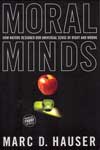 Okay. Let me collect some of the data by asking you to raise your in hands in the following way: of the donors, how many offered between one and three euros? Raise you hands. How many offered between four and six euros? How many offered between 7 and 10? Only a few very generous people, and most of you offered in the four to six range. Now, how many of the receivers rejected their offers? Keep your hands up—of those with your hands up, how many of you got offers of one to three euros? One to three euros? Small numbers? Small offer? How much were you offered? Uno. Okay, good. Now what I want you to do with me is, think through the logic of the game as if you were an economist. If you were trying to maximize your returns, donors should have given the lowest offers possible, and they should have been thinking that the receivers should accept any offer, because one euro is certainly better than zero euros. You didn't have anything to begin with, so one's better than nothing; two's better than nothing; and so is three.
Okay. Let me collect some of the data by asking you to raise your in hands in the following way: of the donors, how many offered between one and three euros? Raise you hands. How many offered between four and six euros? How many offered between 7 and 10? Only a few very generous people, and most of you offered in the four to six range. Now, how many of the receivers rejected their offers? Keep your hands up—of those with your hands up, how many of you got offers of one to three euros? One to three euros? Small numbers? Small offer? How much were you offered? Uno. Okay, good. Now what I want you to do with me is, think through the logic of the game as if you were an economist. If you were trying to maximize your returns, donors should have given the lowest offers possible, and they should have been thinking that the receivers should accept any offer, because one euro is certainly better than zero euros. You didn't have anything to begin with, so one's better than nothing; two's better than nothing; and so is three.
But it turns out that when this game is played, in many many different countries, the typical offer is exactly in the range seen here: about 4, 5, or 6 euros—it's much more than if you were trying to maximize your own returns. And yet we seem to make this calculation very quickly, spontaneously, almost without thinking. That's example number one. Keep in mind.
Here's example number two. I want you to imagine that you are watching a train moving down a track, out of control. It's lost its breaks. If the train continues, it will hit and kill five people. But you are standing next to the train tracks, and you can flip a switch and turn that train onto a sidetrack, where there's one person. Now the train will kill that one person. Here's the question: is it permissible—morally permissible—for you to flip the switch, causing the train to kill one but save five. If you think yes, raise your hand. If you think no, raise your hand. Ok, most of you think it is permissible.
Now, second example: here comes that train again, it's going to kill the five if it keeps going. You are standing next to a very heavy, fat person, and you can throw them onto the tracks, killing them, but the train will stop before the five. Is it morally permissible to throw the fat person? Yes? We've lost half of you! Or more. Okay, what happened? Why do so many of you switch from a permissible to a forbidden judgment?
Here is the idea that I want to give you tonight, in the next few minutes. There has been a long history—a very old tradition—about the sources of our moral judgments. Where do they come from? Many moral philosophers, legal scholars, think that the way that we deliver a moral judgment, like you just did, comes from reasoning. It comes from thinking about the principles, maybe utilitarian (more saved is better than less saved). You work through the principles in a conscious, reasonable, rational way. This was certainly a view that someone like Kant was very much in favor of; how you deliberate with your moral judgments. Now opposing that view — diametrically opposed — was a view that dates back at least to Hume, which is that when we give a moral judgment, we do so based on our emotions. It just feels wrong, or it feels right, to do something, and that's why we do it, that's why we say it's morally right or morally wrong.
What I want to argue for you today is that both of these views, which have dominated the entire field of moral philosophy, are wrong, at least in one particular way. What you just did tonight is an example of why it's wrong. You delivered those moral judgments quickly, probably without reasoning, and without consciously thinking about principles. And if I were to ask you, as I have asked literally thousands of people, on the Internet, in small-scale societies like the Mayans and hunter-gatherers of Africa, people deliver exactly the same judgments that you did tonight, but are incapable of justifying why. Typically they say it’s a hunch or a gut feeling. So for example, let me illustrate by telling you about my father’s response to these cases. He was a distinguished physicist. But I am not picking on the physicists. When I first presented him with these moral dilemmas, the ones you just answered, he said, yes, you can flip the switch, turning the train onto the side track; he said, yes, you can push the fat man on to the train. I said, but Dad, really? He answered "Of course, it's still five versus one." He was following good utilitarian guidelines.
And now I give him case number 3.
You are a doctor in a hospital and there are five people in critical care. Each person needs an organ to survive. The nurse comes to the doctor and says, doctor, there's a man who has just walked into the hospital, completely healthy, coming in for a visit. We can take his organs and save the five. Can you do that, Dad? He immediately replies "No, you can't just kill somebody!" I then say "But you killed the fat man five seconds ago." He then volleys back "Okay, you can't kill the fat man." "But what about the switch?" I say. Defeated, he replies "Okay, not the switch either." And the whole thing unravels because there is not a consciously accessible set of principles that people can recall and use to justify what's going on. And it's not based on emotion. It's based on a calculus—that the mind has, that it evolved to solve particular kinds of moral dilemmas. And it's not learned, either; it's there in place early in development.
If I have been sufficiently clear this far, you may have already figured out where I am going, and the connections I wish to make with another discipline. The core of my argument for moral judgment derives from an argument that the linguist Noam Chomsky developed almost 50 years ago concerning the nature of language, its representation in the mind and its normal functioning in every human. The idea here in a nutshell is that the way our moral sense works is very much like the way language works. There is a universal set of moral principles that allows the establishment of a set of possible moral systems. In this sense, perhaps this provides some convergence with what Lee said just a few seconds ago. In the same way that you might want to ask about possible universes, I want to ask the question about possible moral systems—that the mind is constraining the range of possible variation.
So the deep aspect of Chomsky's thinking about language, which I think is directly translatable into the way we think about morality, and the way we do the science, is by imagining that humans are equipped with, born with, a set of universal principles. What culture can do is change things locally—like a parameter—there are switches. Once you turn something on, things can change.
Let me try to give you a concrete example of some work that a student of mine just recently did. There's a population of people in Panama, Central America, called the Kuna Indians. There is one part of their range that is very remote, and this is where we worked. They live in a quite simple type of society, including small scale agriculture and fishing. We went there recently and gave them moral dilemmas exactly like the ones you just answered. They weren't about trolleys, they were about wild animals. So in one example, there are crocodiles coming to eat five people in the river; you're in a canoe, you can move those crocodiles off to where they will kill one. Is it permissible? The Kuna said it was, virtually every single person we asked. Here’s the second case: you can throw somebody into the river so that the crocodiles will eat him, and save the five. Is that permissible? No. They're showing the same parallel system of psychology where an intended harm—using someone as a means to a greater good is less permissible than a foreseen consequence that causes the same harm. So in the switch case of a train, you foresee the consequence, but you are not intending the harm as a means to the greater good. The Kuna are sensitive to this distinction, but here's where the cultural aspects move in to make this case more interesting: the Kuna Indians are much more willing to say that it's permissible to throw the fat man in front of the crocodiles than we are in our society. They have an unstated policy—a social behavior of high levels of infanticide. Killing, as a part of society, is much more common. And that's the way in which culture can potentially change the dynamics of how the judgment gets made. In other words, we will see a universal principle such as the means versus side effect distinction, but culture can change how much more impermissible the means based harm is when contrasted with the foreseen side effect.
At this point this is still looking relatively abstract and theoretical and what I'm interested in is how science can fuse with and energize moral philosophy to create some powerful new ideas and findings at the interface. This is not to say that science will take over philosophy. It this new enterprise works at all it will be through a deep collaboration, working to find out the origins of our moral judgments, and how they figure in our ethical decisions and moral institutions. Let me end with a few more cases to make this all a bit more concrete.
Consider a disorder that people are aware of, acutely aware of, in many societies. It's called psychopathy—people who are known for massive killings. They kill, often with no regret: they don't feel guilt, they don't feel shame, and they don't feel empathy. Now people have described that as a problem of lacking any moral sense. I think that's completely the wrong interpretation. What psychopathy is, is a case where they have completely intact moral knowledge. They would judge the cases I just gave you like everybody else in the room. What makes them moral monsters is that they lack the kinds of emotions that we have to prevent them from doing horrible things. They don’t have braking emotions. On this view, emotions don’t dictate our moral judgments, but they do guide our moral behavior, how we act. We are now engaged in a collaborative project, working to actually test psychopaths, to see whether that is in fact the case. It is too early to tell, but stay tuned.
The second part of the story is to use, as John mentioned a few minutes ago, some of the modern techniques in the neurosciences where you can image the brain, attempting to understand which parts of the brain are active, how they are engaged when we come to our moral judgments, and how they resolve conflict.
To sum up, we're in an extremely exciting phase now where a set of questions that were forever the providence of moral philosophy and law are now coming directly into contact with the sciences. This is exciting because both areas are working together and it may have direct implications for the law, and the extent to which formal institutions like law and religion penetrate our evolved moral sense.
MARC D. HAUSER, an evolutionary psychologist and biologist, is Harvard College Professor of Psychology, Biological Anthropology, and Organismic & Evolutionary Biology, and Director of the Cognitive Evolution Laboratory. He is the author of The Evolution of Communication, Wild Minds, and the recently published Moral Minds: How Nature Designed Our Universal Sense of Right and Wrong.

THE SELFISH GENE: THIRTY YEARS ON
Thursday 16 March 2006
6.45pm to 8.15pm
The Old Theatre (Old Building, LSE, Houghton Street, London WC2A 2AE)
It is thirty years since The Selfish Gene revolutionised our understanding of living things. Since then, Richard Dawkins' pursuit of the implications of science has informed areas as diverse as biology, psychology, philosophy and religion. His work has made an outstanding contribution to the understanding of science in society; and it has shown how science deepens our appreciation of the natural world.
At this event, Darwin@LSE, in collaboration with OUP, brings together leading intellectuals to explore these insights — and to make their own distinctive contributions to this fertile field.
Helena Cronin
Darwin@LSE
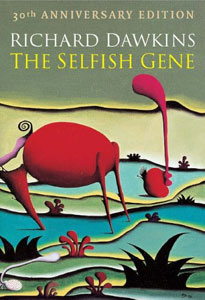

Speakers
Daniel C Dennett (Tufts)
Author of Darwin's Dangerous Idea; Freedom Evolves; Breaking the Spell
'The view from Dawkins' mountain'
Sir John Krebs, FRS (Zoology, Oxford)
'From intellectual plumbing to arms races'
Matt Ridley
Author of The Red Queen; The Origins of Virtue; Genome
'Selfish DNA and the junk in the genome'
Ian McEwan
Booker Prize winner and author of Enduring Love; Amsterdam; Saturday
'Science writing: Towards a literary tradition?'
Richard Dawkins, FRS (Oxford)
Author of The Selfish Gene; The Blind Watchmaker; The Ancestor's Tale.
'Afterword'
Chair: Melvyn Bragg
Broadcaster, writer and novelist
Organiser
Helena Cronin
Founder and Director of Darwin@LSE and author of The Ant and The Peacock.
|
Quicktime streaming audio [1hr.22 min]
(double-click image to begin) |

HELENA CRONIN launched and runs Darwin@LSE. She is a Co-Director of LSE's Centre for Philosophy of Natural and Social Science. She is the author of The Ant and the Peacock: Altruism and Sexual Selection from Darwin to Today, which was chosen as one of The New York Times' nine best books of the year for 1992, and co-editor of Darwinism Today, a series of short books by leading figures in the field of evolutionary theory. Each title is an authoritative pocket introduction to the Darwinian ideas that are setting today's intellectual agenda.


MELVYN BRAGG is a broadcaster, writer and novelist. He presents In Our Time for BBC Radio 4, a series where he and his expert guests discuss the history of ideas, and explore subjects in culture and science. He presented Start the Week between 1988 and 1998. In his 1998 series On Giant's Shoulders he interviewed scientists about their eminent predecessors, and from 1999 to 2001 he presented The Routes of English, a series celebrating 1,000 years of the spoken language.
As well as presenting for Radio 4, he is Controller of Arts for London Weekend Television and is the presenter of The South Bank Show. In 1998 he was made a life peer (Lord Bragg of Wigton). He has written 19 novels, the latest of which is Crossing the Lines.
MELVYN BRAGG: Introduction
They are in you and me; they created us, body and mind; and their preservation is the ultimate rationale for our existence. They have come a long way, those replicators. Now they go by the name of genes, and we are their survival machines.
In 1976, a young zoology lecturer at Oxford University published his first book, from which those words are taken. Powerfully encapsulating a gene's-eye view of life, The Selfish Gene rapidly became deeply influential both within biology and associated disciplines, and in wider intellectual debate.
Thirty years and over a million copies later, The Selfish Gene has come to be seen as one of the defining books of the twentieth century. To commemorate this thirtieth anniversary, Oxford University Press has published a sparkling new edition, with a fresh introduction by the author and an extensive collection of reviews that are testimony to the book's importance and influence.
And more … Today also sees the publication of another OUP book: Richard Dawkins: How a scientist changed the way we think. It is edited by Alan Grafen and Mark Ridley, both former students of Richard's. The book is a collection of essays by scientists, philosophers and writers, which reflects on Richard's contribution and influence as scientist, rationalist, writer and public intellectual, in areas such as biology, philosophy, evolutionary psychology, artificial life and debates on religion.
Our event today is the launch of this lively and wide-ranging collection. Tonight, Darwin@LSE and OUP have brought together some of these and other intellectuals with Richard, to explore these insights further and to make their own distinctive contributions.
So … welcome, everyone, to 'The Selfish Gene: Thirty years on'.

[MELVYN BRAGG:] Our first speaker is DANIEL DENNETT. A professor at Tufts Universit
y, Dan is an outstanding polemicist and one of those all-too-rare philosophers who takes science, particularly Darwinian theory, seriously. His books include Brainstorms, Brainchildren, Elbow Room, Consciousness Explained, Darwin's Dangerous Idea and — a new book, published this week — Breaking the Spell, an original and comprehensive explanation of religious belief.
Dan's talk takes 'The view from Dawkins' mountain'.
DANIEL DENNETT: 'The view from Dawkins' mountain'.
Thank you very much.
When I first read The Selfish Gene — it was not in '76, it was a few years later — I was struck by the very first paragraph, and by one of the chief sentences in it — not quite the sentence that Melvyn Bragg just read, but another very similar sentence:
We are survival machines, robot machines, blindly programmed to preserve the selfish molecules known as genes.
And then the author went on to say,
This is a truth which still fills me with astonishment.
Thirty years on I think the question that can be raised is, are we still astonished by this remarkable inversion, this strange inversion of reasoning that we find in this claim?
When I read the book it changed my life. I was a Darwinian, but I didn't understand evolutionary theory at all well, and I thought after 30 years I should go back and re-read the book again. I was a bit afraid — I'd read parts of it many times, because I'd assigned it to my students in many courses — philosophy courses, even. I wondered if re-reading the whole book I would have one of those disappointing experiences where you think, well, yes, this was a young man's book, and this was very exciting at the time, but I wonder how well it holds up.
So I thought I would put it to as stern a test as I knew, and so last June I took it with me, the more recent edition, on a two-week trip to the Galapagos, where I spent a week on a wonderful three-masted schooner, the Sagitta, retracing Darwin's footsteps with some excellent evolutionary biologists, who were there for the World Summit of Evolution. That's a pretty good test of a book. That's where I reread the book, and it came through with flying colors. It was a wonderful accompaniment to that wonderful and amazing week.
When I thought about which features of the book I would talk about tonight, knowing who the others were who were going to be speaking about it, I realized that I should perhaps stick to some of the grander, larger, more philosophical themes and leave some of the wonderful details to people who are more expert in those.
And I also thought, on rereading the book, that the late Steve Gould was really right when he called Richard and me Darwinian fundamentalists. And
I want to say what a Darwinian fundamentalist is. A Darwinian fundamentalist is one who recognizes that either you shun Darwinian evolution altogether, or you turn the traditional universe upside down and you accept that mind, meaning, and purpose are not the cause but the fairly recent effects of the mechanistic mill of Darwinian algorithms. It is the unexceptioned view that mind, meaning, and purpose are not the original driving engines, but recent effects that marks, I think, the true Darwinian fundamentalist.
And Dawkins insists, and I agree wholeheartedly, that there aren't any good compromise positions. Many have tried to find a compromise position, which salvages something of the traditional right-side-up view, where meaning and purpose rain down from on high. It cannot be done. And the recognition that it cannot be done is I would say, the mark of sane Darwinian fundamentalism.
How on earth is it possible to adopt such a position? Evolution itself seems to be such a mindless and cruel thing. How can such heartless culling produce the magnificent designs that we see around us? It seems just about impossible that such a simple mechanical sieve could produce such amazing design in the biosphere. One of the key elements in The Selfish Gene, one that has always struck me as particularly valuable to me, strengthening my resolve in my own work, and also showing the way, is what I'm going to call by the rather bizarre name of "mentalistic behaviorism".
First I want to remind you of what Francis Crick called Orgel's Second Rule. "Evolution is cleverer than you are." Now what Crick meant by this jape, of course, was that again and again and again evolutionists, molecular biologists, biologists in general, see some aspect of nature which seems to them to be sort of pointless or daft or doesn't make much sense — and then they later discover it's in fact an exquisitely ingenious design — it is a brilliant piece of design — that's what Francis Crick means by Orgel's Second Rule.
But notice that this might almost look like a slogan for Intelligent Design theory. Certainly Crick was not suggesting that the process of evolution was a process of intelligent design. But then how can evolution be cleverer than you are?
What you have to understand is that the process itself has no foresight; it's entirely mechanical; has no purpose — but it just happens that that very process dredges up, discovers, again and again and again, the most wonderfully brilliant designs — and these designs have a rationale. We can make sense of them. We can reverse-engineer them, and understand why they are the wonderful designs they are.
And what this suggests is that it would help us to understand how this is possible if we could break all this brilliant design work up, into processes which we could understand the rationale of, without attributing it to the reason of some intelligent designer.
In other words what we need is this weird thing that I'm calling "mentalistic behaviorism". Now to many the idea of mentalistic behaviorism would seem to be a contradiction in terms. Classical psychological behaviorism is profoundly and explicitly anti-mentalistic. So what on earth could mentalistic behaviorism be? It could be exactly what Richard writes about in The Selfish Gene. How on earth can a gene be selfish? It doesn't even have a mind. It is just a bunch of information in the genome; how could it be selfish?
And what Richard showed, patiently, vividly, clearly, again and again, is if you treat it as if it had a mind, if you treat it mentalistically, you can characterize and make sense of the interactions, the dynamics of the processes that produce the effects that strike us as so intelligent. What we can then see is that these processes are arms races. Not just arms races between armies of intelligent people, but arms races between trees, and between bacteria, and between any form of life you want to name. We can watch an arms race generate more and more design, more exquisite solutions to problems, in ways that are strikingly similar to the more intelligently (but not very intelligently) guided arms races that give us the metaphor in the first place.
Also we find bargains struck, wonderfully intelligent bargains struck, for instance, between fruit-producing plants and omnivorous animals that carry the fruit off and pay for this high-energy fruit by distributing the seeds with their fertilizer at some distance from the tree, just to give one vivid case.
Many wonderful bargains, many ploys and counter-ploys which can be described in this mentalistic language at the same time that one rigorously insists: these things don't have minds, they are just mechanical processes, they are simply structures that have effects in the world that invite this particular metaphorical — but quite rigorously metaphorical — interpretation.
I have recently hit upon a way of characterizing what a virus is, which I like, and which I see a lot of evolutionary biologists like too: a virus is a string of nucleic acid with attitude! Of course it doesn't have a mind, but it has attitude. What does that "attitude" mean? It means that it behaves in such a way that it promotes its own replication, more than its rivals promote their own replication. That's what it is to be a virus.
Now I want to return to the quote I began with — "We are survival machines, robot vehicles, blindly programmed to preserve the selfish molecules known as genes" — because I want to talk about the other philosophically brilliant contribution in The Selfish Gene.
The first one is the pioneering clear articulation of mentalistic behaviorism and the defense of it. We can use selfish gene talk because we know how to translate that into terms that are purely behavioristic. But now I want to concentrate on another word in that phrase, "the selfish molecules known as genes." That, I think, is a nice example of Richard's writing skill. The first time he describes them, he calls genes selfish molecules, but later in the book, once we've gotten used to this way of talking, he shows that that's actually not quite what he is talking about. He's saying something much more subtle and much more interesting. What a philosopher would say is that a gene, it turns out, is a type, not a token.
What's a token? A token is an individual word — like the word "gene" up there on the screen behind me, a token that is made of nothing but shadow against a light background. Some tokens are made out of ink, some are made out of plastic letters and so forth — it's a physical object, it's like a molecule. But what Dawkins was drawing attention to was that the concept of gene that really does the work is the concept of a type, not a token. Here he says:
What I am doing is emphasizing the potential near-immortality of a gene in the form of copies as its defining property.
In other words he was saying something quite remarkable. He was saying that genes are like words, or like novels, or like plays, or melodies!
Now of course one of the famous (and most embattled) chapters in The Selfish Gene, one that I have spent a lot of time articulating and defending and trying to extrapolate further, is the chapter on memes. And there he said memes are like genes. What I want to point out, if it isn't already obvious, is that earlier in the book he said that genes are like memes! He said that genes are information structures that have many tokens, many physical tokens, and it's the information that you're really talking about when you're talking about the gene.
Now this of course was not entirely original to Richard. It was also stressed by George Williams, for instance, in his own work which was one of the inspirations for Richard. In other words, the hox genes are like the Romeo and Juliet memes! There's many copies of them, we can recognize them, we can see the role that they play in many different contexts. And they are all related not only by similarity but by having been copied and copied and copied, having all been replications coming from earlier instances.
Here on the screen is a diagram of the tree of life. It may not look like a tree to you, because you're not used to seeing trees from this angle — this is a bird's-eye view of a tree. You're looking down from above. You see the main trunk right in the middle there. This diagram is already out of date; I've had some interesting discussions with evolutionary biologists in the last two weeks and I've learned that some of them would draw the lines rather differently now. But it shows the three main branches of the tree — the bacteria, the archaea, and the eukarya, and of course we're on this lower eukaryote branch, and there we are, Homo — and the artist has put two other close cousins on the tree of life on this map — Coprinus and Zea.
What are those? Mushrooms and corn — our close cousins! Now one of these species, Homo sapiens, is exceptional: of all the species on the planet, it is the only species that has evolved that can understand that it's one of the fruits on the tree of life. We are unique in that regard. It is human language and culture that has made this possible. Not just our brain power, but the fact that we have a division of labor — because we have language and culture we can fill our brains with the fruits of the labors of everybody else on earth, not merely those who are our ancestors. Tonight we celebrate one of its most brilliant creations, The Selfish Gene.
Thank you very much.
 [MELVYN BRAGG:] Thank you very much.
[MELVYN BRAGG:] Thank you very much.
Our next speaker is SIR JOHN KREBS. A Fellow of the Royal Society and until last year a Royal Society Research Professor in Oxford's Department of Zoology, John is a highly distinguished biologist. He is one of the founding fathers of behavioural ecology, having co-edited the leading textbooks on the subject; and, with Richard, he has co-authored some classic papers in evolutionary thinking. Having been head of the Natural Environment Research Council (NERC) and of the Food Standards Agency, he is now Principal of Jesus College, Oxford.
John's talk is entitled 'From intellectual plumbing to arms races'.
SIR JOHN KREBS: 'From intellectual plumbing to arms races'
Thank you very much, Melvyn. I've got half as much time as Dan, so I'm going to have to talk twice as fast — or say half as much.
I was thinking, in this brief presentation, of how I should characterize Richard and his contribution, and hence my title, which I'll explain in a moment. But when I had almost worked out what I was going to say, I happened to go into the men's loo in the Department of Zoology, and there were some graffiti which gave me a different characterization of Richard. The question was this: What's the difference between God and Richard Dawkins? The answer below was:
"God is here but everywhere; Dawkins is everywhere but here."
Richard does travel around quite a bit.
Also of course the challenge of giving a very short talk is the one that Mark Twain summarized in the famous phrase, "If I'd had more time I'd have written a shorter letter. "
But first let me talk about Richard as an intellectual plumber. I first came across the notion of an intellectual plumber when I was sitting in my then Oxford College, Pembroke, next to Simon Blackburn, the philosopher now at Cambridge. I turned to him and asked, "What's the point of philosophy anyway, Simon?"
And he said, "Well, think of it this way, John. You're just a biologist, you sometimes have leaks in your thinking, and what you need is an intellectual plumber to patch up those leaks, and that's what philosophy will do for you. "
This is one way of describing Richard. He is indeed an intellectual plumber, and if anybody has leaks in their scientific thinking, be it about evolution or about any other aspect of biology or science in general, Richard's intelligence and razor-sharp analysis will detect the leak and carefully fix it for you.
And he also expresses it beautifully, and one of my favorite quotes from Richard's writing is not out of The Selfish Gene but from the book River Out of Eden, in which he says, talking about cultural relativism:
Show me a cultural relativist at thirty thousand feet and I'll show you a hypocrite. Airplanes are built according to scientific principles and they work. They stay aloft and they get you to a chosen destination. Airplanes built to tribal or mythological specifications such as the dummy planes of the Cargo cults in jungle clearings or the bees-waxed wings of Icarus don't.
That's a beautiful deconstruction of cultural relativism.
But — you might say, supposing Richard was wrong? Well, here I'm tempted to quote Lord Carrington, when asked what would happen if Margaret Thatcher was run over by a bus. And his reply was, "It wouldn't dare."
But I want now to move on from Richard as an intellectual plumber to talk about another aspect of Richard's contribution to biology, which is about a really original idea, a really original way of looking at a very familiar phenomenon.
Now ideas of course never come out of a vacuum. So The Selfish Gene, a highly original book, by everybody's reckoning, was born out of a particular zoological environment.
Richard was a student at Oxford in the 1950s and early '60s, which was a center of neo-Darwin in biology. People like Niko Tinbergen, David Lack, E. B. Ford, had already begun to articulate the debate about levels of natural selection: does selection act to the level of the group, the individual, or the gene? It was also an environment in which there'd been huge success at popularizing biology, in particular behavior. For example, in the writings of Niko Tinbergen and Desmond Morris, who was also associated with the department.
But to see just how radical Richard's ideas were in this overall context, let's look at his writing about communication. And that's what I want to talk about for the next few minutes.
What do you think the essence of communication is? Whether it's communication amongst human beings, or amongst other animals on the planet, or amongst plants? Well, at the time when Richard entered into this field, ethologists, information theorists, social psychologists, and others, all agreed that the essence of communication is transfer of information. That's what it's all about. And those who thought more specifically about animal behavior and evolution saw the whole process by which animal communication has developed by natural selection as one in which the efficiency of information transfer is increased.
Richard's supervisor, the Nobel-prize winning Niko Tinbergen, made a very famous film called "Signals for Survival," which won all sorts of international prizes, and the opening phrase of that film, which is all about animal communication, is a memorable moment, with Niko standing there in a colony of herring gulls in the North of England, and as he talks to the camera he raises his fist and he says, with a Dutch accent, "When I do this, you know what I mean. "
In other words, it's clear that communication is about transferring information. And Niko himself summarized communication by saying:
"One party, the actor, emits a signal, to which the other party, the re-actor, responds, in a way that the welfare of the species is promoted."
Absolutely wrong.
You can see already why it's wrong; it's a species welfare-oriented view. And here's how Richard defines communication a few years later:
"Natural selection favors individuals who successfully manipulate other individuals. Whether or not this is to the advantage of the manipulated individuals. Selection will also work on individuals to make them resist manipulation. But actors do sometimes succeed in subverting the nervous systems of re-actors. As adaptation to do this are the phenomena we see as animal communication."
In other words, Richard reframes the whole of thinking about communication. It is not about information transfer, but about manipulation. It is about an arms race between manipulators and recipients of manipulation. And so influential is that idea, that in a recent monograph on animal communication by two American scientists, they start the history of the subject with Richard's paper.
Let me just make three comments as I move towards the end.
The first thing you may ask if you think about communication as manipulation, how on earth could manipulation succeed? Surely reactors, over evolutionary time, would develop the capacity to resist manipulation.
Before you get too seduced by that thought, think of your own senses, and the way they can be manipulated. Otherwise, why is it that men are influenced by motor cars with semi-naked women draped over them? It's manipulating the senses, persuading men that they might indeed attract semi-naked women of a certain kind if they bought that particular make of car. [I own a BMW and I can confirm that it doesn't have this effect.] Think of people who respond to pornographic images, flat images of color, but are sufficiently aroused by them to think of them as real sexual stimuli.
In a more sophisticated and perhaps less blunt way, think of the writing of Keats in his "Ode to a Nightingale" — the opening phrase —
"My heart aches and a drowsy numbness pains my sense as though of hemlock I had drunk."
The nightingale’s song is making him drowsy and numb as though he'd drunk hemlock.
But there's another factor why signals might be manipulative. Think of how signaling might start — the reactor anticipating the behavior of the actor, and that very anticipation creating the basis for signals that manipulate.
The second point I want to make is that this idea about communications manipulation becomes all the more troubling when you think that each individual can play the role of actor or re-actor. So we're not talking about evolution between individuals, but evolutionary interactions between roles. And this is an example in the way in which, as Dan has already articulated, jumping out of the mind set of thinking of the individual as the unit of evolution enables you to free your thoughts and be creative.
And finally, my third point here is this. If communication is the result of an arms race between manipulation and resistance, what's the end point? And here Richard had further insight. The kind of end point you would expect depends on the degree of conflict of interest between the two roles. In cases where the conflict is very strong, like males attracting females when the females are reluctant to mate, the arms race between manipulation and resistance results in an escalation. And that's why you get brilliantly elaborate, vocal, visual, and other signals associated with sexual displays.
On the other hand, if the conflict of interest between the roles is minimal, as it might be between members of a pair who have already mated, then the evolutionary process will lead to a reduction in the visibility, the amplitude, of the signal. And that dichotomy in the nature of communication is still one that stands to be investigated by biologists.
So in summary, Richard's writing about communication transformed our thinking about not just animal communication, but, I believe, about communication in general.
And a final comment: people sometimes say to me, what was Richard doing before he wrote The Selfish Gene? What was he known for. And the answer is, Richard was known for his organ before he wrote The Selfish Gene.
There's nothing personal, Richard, you understand. But Richard did invent a device for event-recording with a computer. This was in the very early days of computing. It's hard to imagine that what you now have in a laptop took a room as big as the average academic's office to process information and store it. And Richard invented the so-called Dawkins Organ, which was a device for recording data by pressing keys and that went straight into a computer.
The other particular thing that Richard did early in his career was to study the development of pecking behavior in chicks. When I came to write my own thesis, I read Richard's thesis as an example of how it should be done. And I was struck by a sentence in the very first Chapter, in which under "methods" it said, "The chicks were tested in Paris. And I thought, my God, this man's got real style. It was only about ten minutes later that I realized that it was a misprint for "The chicks were tested in pairs. "
Thank you.
[MELVYN BRAGG:] Thank you.

And now to MATT RIDLEY. 23 pairs of chromosomes, together with a doctorate from Oxford University, equipped Matt for a career as a top-rank science writer. He has worked for The Economist, the Daily Telegraph and the Sunday Telegraph. His books — The Red Queen, The Origins of Virtue, Genome, Nature via Nurture — have sold over half a million copies and been short-listed for six literary prizes; and in 2004 he won the American National Academies Book Award. He is the energetic founding chairman of Newcastle-upon-Tyne's International Centre for Life, which is highly regarded for its research in genetics.
Matt will talk about 'Selfish DNA and the junk in the genome'.
MATT RIDLEY: 'Selfish DNA and the junk in the genome'
Thank you very much, Melvyn.
Good evening; it's a huge honor to be here. I'm only here because I intercepted an invitation for Mark Ridley. Just to be clear, the excellent book about Richard is edited by Alan Grafen and Mark, not by me, although I do have a chapter in it, just to confuse people. We have, Mark and I have had our Y chromosomes analyzed by Brian Sykes and we have the same Y chromosomes haplotypes, so he'd say the same thing as I'm going to say anyway. After all, we are supposed to believe in genetic determinism.
What I want to talk about tonight is a throwaway remark in The Selfish Gene, which I think was not only prophetic but in a sense made the book much more literal than it otherwise is. At the time, in the early 1970s, it had just been discovered that genomes have a lot more DNA in them than is necessary for coding for proteins. And this was a big puzzle. Richard suggested a solution to this, which turned out to be mostly true, and was completely original.
The remark is found on page 47 of the first edition of The Selfish Gene, and it goes:
Biologists are wracking their brains trying to think what useful tasks this apparently surplus DNA in the genome is doing. But for the point of view of the selfish genes themselves there is no paradox. The true "purpose" of DNA is to survive, no more no less. The simplest way to explain the surplus DNA is to suppose that it is a parasite, or at best a harmless but useless passenger hitching a ride in the survival machines created by other DNA.
And as a classic of the argument in The Selfish Gene, what he's doing is saying cui bono, who benefits. Is it possible that perhaps this stuff is there not for the good of the species, but for the good — not even for the good of the whole genome, but for the good of the bits of DNA itself. He's turning the world upside down.
Just to recount the history of why this is an interesting question, by 1971 the phrase the C-value paradox had been coined for this problem, that nuclear genomes vary enormously in size, up to 300,000-fold, but the number of proteins made from them doesn't vary nearly as much.
Some species have enormous genomes and produce no more proteins than others. The idea was beginning to be abroad in the late '60s, early '70s, that this might just be junk — that an awful lot of the DNA in the genome might stand for nothing; it might have no purpose.
And in a lecture at MIT in 1972 Crick said, What is all this DNA for? Is it junk or is it an evolutionary reserve? Still thinking, though, in terms of what's it for in terms of the organism. And in 1978 Tom Cavalier-Smith suggested that perhaps it's there to support the rest of the DNA, to place the genes in the right parts of the nucleus, to spread the genes out, and things like that. And that's an idea that I'll come back to in a minute, because it has a second history. But it's in 1980 that the idea of selfish DNA is coined in two papers in Nature by Doolittle and Sapienza and Orgel and Crick, arguing that perhaps most of, or some of this DNA is simply selfish DNA, that it's there because it's good at getting itself there. It's good at replicating itself, it's good at copying itself. They were quite explicit, they said this idea is not new, it's sketched briefly but clearly by Dawkins in his book The Selfish Gene. There's no question that this originated as an idea with Richard. By the way, — in 1982 the first computer virus was created, the Elk Cloner virus — and that of course has an interesting parallel with the argument that I'm talking about.
Just to illustrate what we're talking about — genome size bears very little relation to the complexity of an organism; two creatures like a puffer fish and a zebra fish have very different size genomes, even though they look very similar.
From this end of the telescope, human beings look like they have quite a big genome, but if you turn the telescope around and look from another direction, the human genome looks rather a small one, compared with that of grasshoppers, which is at least three times as large, or deep-sea shrimps, which have ten times as much DNA as us.
Salamanders get even bigger, and the king of the genomes in the animal kingdom at least, is the marbled lung fish. Some people say amoebae have larger genomes at 500 gigabases, but they're almost certainly polyploid, as are lilies, which also have very big genomes. This is a perfectly ordinary diploid genome in the marbled lungfish, and it has as much digital information in it as about ten British Museum reading rooms.
So what's it all for? Well, it does appear that Richard was partly wrong. It does appear that the genome size is under selection, and that it's linked to the size of the cell. The bigger the nucleus the bigger the cell, it's a pretty good rule. And there's all sorts of evidence to suggest that animals are optimizing the size of their genomes, so parasites often minimize the amount of junk in their genomes in order to shrink themselves.
Malaria parasites have very little junk in their genomes, and very small cells. At the other extreme, ciliates have very large cells, and they achieve this with small genomes by making a huge macronucleus in which they put sort of working copies of all their genes in multiple numbers. They are an exception that proves the rules; they have a small genome but a large cell but only because they make a special sort of working nucleus that's a whole lot bigger.
And high-metabolism animals, like bats, and birds, have got rid of quite a lot of the junk in their genome, in order to be able, it appears, to have small blood cells with larger surface areas. A lesser horseshoe bat like this has a genome less than two gigabases, compared with three gigabases for us. Why the lungfish, the marble lungfish, has such a gigantic genome is not clear, but it does look like it may be something to do with having very big cells, in order to be able to store glycogen when it estivates during a drought, when it disappears into the mud and lives there for six months off its glycogen reserves. That's a possibility. But one of the strongest pieces of evidence that genome size is not — that it's not possible simply to expand your genome at length by letting parasites run riot is the ALU sequence, which is one of the commonest sequences in our genomes, which has appeared in the last 30 or 40 million years. Mice don't have it, but our genome is not bigger than mice. In other words it's come at the expense of another sequence, rather than added to it.
Just in passing, it does seem that big genomes go with small brains. This is particularly true in amphibia, where — in frogs and salamanders, the larger the genome the smaller the brain. A frog has about five gigabytes and a comparably large brain; a salamander has about 30 gigabytes and a smaller brain, and a mudpuppy has an 85- gigabase — sorry, I keep saying byte, I mean base — gigabase genome, and has an extremely small brain. Human beings luckily have larger brains than frogs. There are two reasons for this: the bigger your genome the slower you are at duplicating yourselves, so the harder it is to grow a big brain by multiplying cells. And also it's harder to fit the same number of neurons in your head if neuron bodies are bigger.
How much of the human genome might be selfish DNA? Well, what we think of the genomes consisting of is genes; well, there is the proportion of our genome that actually consists of real protein-coating genes, sequences that direct the manufacture of proteins themselves. One and a half percent. Add in another three and a half percent for all the control sequences, all the functional DNA that seems to be under very strong purifying selection.
That's where all the promoters and enhancers and switches that control the expression of the genes is. We've only got to five percent and we've got all that we need to build and run a human body. Eight percent consists of retro-viruses. 450,000 copies of the retroviruses, complete or incomplete, in our genomes. They're there because they're good at being there; they're simply left over from infections in the past, with viruses that are good at stitching copies of themselves back into our genes. There's three percent transposons — these are just cut-and- paste sequences that are good at moving around the genome. Many more of them in plants and fruit flies, but fewer in us.
But the really interesting ones are the LINEs: long interspersed nuclear elements. Or autonomous retroposons. These are sequences that are several thousand base pairs long, they're transcribed, two proteins are made from them, the proteins bind to the messenger RNA and take it straight back into the nucleus, make a DNA copy, and stitch it back into the genes. That's all they ever do.
They are as clear a definition as you can get of a selfish gene, they are simply copying themselves and spreading themselves around the nucleus. The SINEs are very similar, there's 13 percent of our genomes consist of them. The ALU that I mentioned is one of these. The only difference is that they parasitize the LINEs. They don't make their own machinery for copying themselves, they use the LINE machinery. These are lesser fleas on greater fleas.
All that gets you to about half the human genome. What's left? Well, there's introns — gaps inside genes — there's simple sequence repeats, the bits we use for DNA finger printing and things like that, segmental duplications, and a whole bunch of other stuff. Broadly speaking, the green stuff I think is true junk DNA. In other words it doesn't matter what its sequence is. The blue stuff is the functional DNA that builds and runs our bodies. And the red stuff is there because it's good at being there. It's things that have spread at the expense of other sequences, it's selfish DNA.
Just to clarify the LINEs and SINEs, at any given time in the last 60,000,000 years there's been one different LINE that's been dominant, that's been most dominant in the human lineage, there's been 16 overall that have been rampaging through our genomes. The one that's currently doing so is called LINE 1, it's at the moment taking up about 17 and a half percent of your genome as you sit here today. Likewise the ALU sequences have gone berserk, their activity peaked about 40,000,000 years ago in the primate lineage, it's a 280-base per sequence, and it's repeated over a million times.
Now interestingly the LINEs are found in the AT-rich regions. These are where there's fewest genes — which is what you'd expect if the organism was saying, we don't like these parasites, we want to keep them out of the way of genes. But the older SINEs are actually found in the CG-rich regions, the areas where most genes are. In other words the longer a SINE has been hanging around, the more it's been recruited to areas where there are genes, so it looks like the organism has somehow co-opted some of these sequences to actually affect the expression of genes, which is an interesting case of a selfish gene being, if you like, tamed.
Just worth reminding ourselves that junk DNA has spawned a bigger industry than coding DNA already — I'm referred to DNA finger-printing — and the two people of course who made DNA a household word are, Monica Lewinsky and O.J. Simpson, if you think about it.
Ladies and gentlemen, my conclusion is that it looks like about 45 percent of the human genome is made up of what you might literally call selfish genes — sequences that copy themselves very efficiently. And that Richard's suggestion was right. However, selfish DNA can, it seems, spread at the expense of neutral junk, but doesn't seem to be able to actually expand the genome. We're not in danger of suddenly have our genomes grow bigger and bigger and bigger. And these selfish elements range from unwanted parasites to co-opted symbionts, and most of them are somewhere in between the two. Richard was absolutely right, in a very literal sense, and the genome would actually be inexplicable without the notion of the selfish gene.
Thank you.

[MELVYN BRAGG:] Our next speaker is IAN McEWAN. Ian's books have earned him
worldwide critical acclaim. Shortlisted for the Booker Prize for Fiction three times, he won the award in 1998 for Amsterdam. And many other prizes span his career, from an early Somerset Maugham Award to the triumph of a Book Critics' award. Ian is a writer who understands and respects science. His book Enduring Love draws on explicit Darwinian themes; and his latest novel, Saturday, is based on a day in the life of a brain surgeon.
His talk entitled 'Science writing: Towards a literary tradition?'
IAN McEWAN: 'Science writing: Towards a literary tradition?'
Let me start with the opening of an essay on immunology, which might entertain you. And this is in sense an appeal for a grand parlor game among those who love science.
'It is whispered in Christian Europe that the English are mad and maniacs: mad because they give their children smallpox to prevent their getting it, and maniacs because they cheerfully communicate to their children a certain and terrible illness with the object of preventing an uncertain one. The English on their side say: 'The other Europeans are cowardly and unnatural: cowardly in that they are afraid of giving a little pain to their children, and unnatural because they expose them to death from smallpox some time in the future. To judge who is right in this dispute, here is the history of this famous inoculation which is spoken of with such horror outside England'.
Well, you have probably guessed that this is Voltaire, writing in the late 1720s. Voltaire visited England — probably the only instance in recorded history when an intellectual Frenchman has come to England and been impressed by what he found. Voltaire wrote beautifully in his Lettres Philosophiques — translated as Letters from England — on religion, politics, and literature. And he also wrote about science — he attended Newton's funeral and was awed by the fact that a humble scientist was buried like a king in Westminster Abbey. But I want to afford Voltaire an important place in the library that will help us define a literary tradition of science. He wrote superb expositions, lucid expositions, on Newton's theories of optics and gravitation. They still stand today. If you want to know what Newton said you can read Voltaire, as good as anything to be found.
The atmosphere of this gathering tonight, celebrating a book written 30 years ago, really does reinforce my impression that we need a stronger sense of a scientific literary tradition. Those of us educated in a literary tradition take for granted a kind of mental map — a temporal map, really — of a literary history, a canon, a hierarchy if you like. The weight of the past, the cumulative achievements, give meaning to the achievements of the present. This canon has been vigorously challenged in the last 20 years — too male, too middle class, too white, too imperial, or whatever. But in order for it to be challenged it had to exist. One had to have Donne and Tennyson and Clough and Virginia Woolf, all placed in the firmament, waiting to be redefined, elevated further, or shot out of the sky. It seems to me that the pace of change in contemporary science, and the necessary passion for innovation, put us in danger of neglecting, or forgetting completely, what a beautiful and intricate tapestry of curiosity, persistence, human weakness and inspiration a scientific literary history could represent.
One of Richard's achievements has been to extend an enjoyment of science to layman like myself. Permission has been granted, no apologies necessary. Just as we can enjoy and discuss opera, art, movies, poetry, without being composers or performers, painters, film directors or poets, so we can engage with this vast edifice, the sublime achievement of human creativity. But to move around inside this edifice, we need the temporal spaciousness of a literary past.
Here is another one for the shelf — a man has ground up some lenses, taken some water from a lake and has been looking at it carefully, with an open mind:
'I found floating therein divers earthy particles and some green streaks , spirally wound serpent wise and orderly arranged... Other particles had but the beginning of the foresaid streak; but all consisted of very small green globules joined together; and there were very many small green globules as well.... These animacules had divers colours, some being whitish and transparent, others with green and very glittering little scales...And the motion of most of these animacules in the water was so swift, and so various upwards. Downwards and roundabout, that 'twas wonderful to see: and I judge that some of these little creatures were above a thousand times smaller than the smallest ones I have ever yet seen...'
This is Leeuwenhoek writing to the Royal Society in 1674, giving the first account of, among others, spyrogyra. He wrote his observations in letters to the Royal Society over a period of 50 years. And it is no accident that he should have sent his letters there. At that time, in a small space, within a triangle between London, Cambridge, and Oxford, and within a couple of generations, there existed nearly all the world's science. Newton, Locke, (I think generally we have to include certain philosophers in here, Hume most certainly), Willis, Hooke, Boyle, Wren, Flamsteed, Halley — an incredible concentration of talent, and the core of our library — its classical moment, if you like.
A good question to ask about this tradition is, how important is it that what one reads is true? Do we exclude those who simply got it all wrong? I think we have to beware of writing a Whig history of science, a history of the victors. I think we need to remember phlogiston and the ether and protoplasm. Scientists who hurl themselves down dead alleys perform a service for everyone else — they save them a great deal of trouble.
My son, William McEwan, last year completed an undergraduate biology course at UCL. When he was studying genetics, he told me he was advised to read no papers written before 1997. One can see the point of this advice. In the course of his studies, estimates of the size of the human genome shrank by a factor of three. Such is the headlong nature of contemporary science. But if we understand science merely as a band of light moving through time, advancing on the darkness, and leaving darkness behind it, always at its best only in the incandescent present, we turn our backs on a magnificent and eloquent literature, an epic tale of ingenuity propelled by curiosity.
Another consideration I think for the literary tradition has to be style. Not every scientist or science writer is a stylist. How about this? You will guess the author, of course:
'Individuals are not stable things, they are fleeting. Chromosomes too are shuffled into oblivion, like hands of cards soon after they are dealt. But the cards themselves survive the shuffling. The cards are the genes. The genes are not destroyed by crossing over, they merely change partners and march on. Of course they march on. That is their business. They are the replicators and we are their survival machines. When we have served our purpose, we are cast aside. But genes are the denizens of geological time: genes are forever.'
I raise my hat to that lovely phrase — "shuffled into oblivion". The analogy with cards — the hand being the information, the cards themselves as the genes — is precise and informative — true eloquence. The Selfish Gene would have to have a central place in our tradition, as would many other of Richard's books. In particular, Unweaving the Rainbow has a powerful appeal to the literary imagination.
There is no time to discuss the nineteenth century's contribution — Darwin's Origin, and of course, The Expression, or Huxley's "On a Piece of Chalk". And when we come to the present, our parlor game intensifies, for we are wallowing in riches. The Selfish Gene initiated a golden age of science writing. With a fine sense of literary tradition, Steven Weinberg in his book Dreams of a Final Theory, revisited Huxley's famous essay in order to make the case for reductionism. Among many other 'classics' I would propose E. O. Wilson on the beauties of the Amazon rain forest, and on the teeming microorganisms in a handful of soil, Steven Weinberg again on the aesthetics of scientific theories, David Deutsch's The Fabric of Reality, Matt Ridley, unweaving the opposition of nature and nurture. And recently, too Dan Dennett, always conscious of Hume as well as Dawkins, laying out for us the memetics of faith.
In fact, I'll end with a consideration of religion, because a very important part of Richard's work has been to address it. He has refused to gloss over the innate contradictions of reason and faith. None of us, I think, in the mid-'70s, when The Selfish Gene was published, would have thought we'd be devoting so much mental space now to confront religion. We thought that matter had long been closed. Here is another bit of prose that I would want carved into my library — perhaps over the door as you go in. This is a man who's just been threatened with indefinite imprisonment and torture, unless he signs on the dotted line.
'...having before my eyes and touching with my hands the Holy Gospels, swear that I have always believed, do believe, and with God's help will in the future believe all that is held, preached and taught by the Holy Catholic and Apostolic Church... I must altogether abandon the false opinion that the sun is the centre of the world and immovable, and that the earth is not the centre of the world and moves and that I must not hold, defend or teach in any way whatsoever, verbally and in writing the said false doctrine…'
Now, in 1632 Galileo may or may not have whispered as he signed, "but it moves", but his confession serves to remind us that open-minded rational enquiry will always have its enemies. We can take nothing for granted, for totalitarian thinking, religious or political is always with us in some form or other. For this reason alone, a scientific literary tradition has its uses. I would also like to think that the spirit of, "but it moves" lives on in Richard's work.
Ian McEwan's contribution Copyright © 2006 by Ian McEwan. All rights reserved.

[MELVYN BRAGG:] Thank you very much.
And now we come to RICHARD DAWKINS for an afterword.
In one way there's nothing to be said, because a great deal has been said, and unless you're living on Mars you know a great deal about Richard Dawkins, but I think he deserves to be set up like everyone else. It's a dead hand to say he needs no introduction; he does need no introduction, but here's a short one.
Richard has done more than anyone to clarify one of the most fundamental and enduring ideas in all of science — the theory of evolution by natural selection. In The Selfish Gene and, not least, The Extended Phenotype, he showed how evolution could be understood as the differential success of genes in making their way down the generations by means of adaptations. Adaptations being the familiar 'design features' of living things: eyes, wings, brains, fins. From this gene's-eye view of evolution, all the numerous, often previously disparate studies of living things come together. Genetics, game theory, population biology, phylogeny, development, animal behaviour — all become mutually transparent.
As a bonus to experts and lay-readers alike, he has also made these dramatic developments accessible to a wider public in his string of international bestsellers, so lucid and so readable, as Ian has told us. This year marks not only the thirtieth anniversary of The Selfish Gene but also the twentieth anniversary of The Blind Watchmaker and the tenth of Climbing Mount Improbable. These and other memorable titles — River Out of Eden, The Ancestor's Tale — have all been praised both for their scientific insights and their brilliant literary style. As a result, Richard has the rare honour of being a Fellow both of the Royal Society and of the Royal Society for Literature.
In sum, Richard Dawkins is widely regarded as one of the most influential thinkers and writers in the world today. And it is my pleasure to invite him to provide an afterword to this evening.
Richard Dawkins.
Richard Dawkins' Edge bio page
RICHARD DAWKINS: 'Afterword'
This is of course a wonderful occasion for me. I'm very moved and very grateful, not just to Helena and the LSE and to the OUP for organizing it, to the other speakers, and to Melvyn Bragg for chairing it.
I'm sometimes asked if there's any unifying philosophy in all my plumbing activities, and I find it quite hard to answer. I suppose I'm a lover of explanation. I love to reduce complex mysteries by means of simple explanations. And I suppose that makes me a reductionist, but the word means so many different things, and is to some people a dirty word. It's one thing to reduce, in the sense of trying to find simple explanations for complex phenomena, and in that sense I'm proud to be a reductionist.
But if it's taken to mean reducing in the sense of demeaning, or underestimating, the beauty, the complexity, of that which we're trying to explain, then I would not own up to it. I want to do full justice to the complexity of that which we're trying to explain — while all the time seeking the simplest possible explanation for it. So in that sense I am a reductionist; I'm a materialist. As to whether I'm a determinist, I'll let you know when I've decided.
This is not just an anniversary of several books, as Melvyn has said, it's also the launch of the book edited by Alan Grafen and Mark Ridley. I can't actually bring myself to say the title; modesty forbids. But it is a collection of essays and I'm very very grateful to all the authors — 25 of them — of this collection.
Dan Dennett's contribution to this book of essays is called "The Selfish Gene as a Philosophical Essay," and it begins: "Probably most scientists would shudder at the prospect of having a work of theirs described as a philosophical treatise. You really know how to hurt a guy. Why don't you just say you disagree with my theory, instead of insulting me?"
Well I think one respect in which I am philosophical is this: although I'm very interested in the way life is, I'm also fascinated by the question "Are there aspects of life that just had to be so?"
For example, it's a matter of fact that the genetics that we know is digital, both at the Mendelian level of the independent assortment of genes in pedigrees, and also at the Watson and Crick level of the digital information within each gene. That's a fact. But is the digitalness of genetics just a fact, or is it something that had to be so, for life to work at all?
Whether you call such an approach philosophical or not, that's what I'm interested in. And my suspicion is that genetics did indeed have to be digital, in order at least for evolution by natural selection to work, and I further suspect that evolution by natural selection is also a necessary condition for all of life, wherever life may be found anywhere in the universe. This is my Universal Darwinism claim, and it's the one that Dennett was quoting as getting me into trouble with a fellow biologist for being too philosophical.
Now if you take your science as narrowly evidential, you'll say something like, "Since you've never seen life on another planet other than this one, how can you possibly say anything about the way life might be universally, on other planets.?" On the face of it that sounds like a reasonable complaint, but on the other hand there surely must be some things that theory tells us must be so. And it can't be right to rule out of bounds everything that we can't see with our own eyes.
The extraterrestrial perspective, by the way, is the inspiration for choosing the Desmond Morris painting "The Expectant Valley," which was on the original hardback edition of The Selfish Gene and has been revived in the 30th anniversary retro edition.
So what are the general principles of life, wherever life might be found? I just want to suggest some candidates, as a sort of stimulus to get other people thinking of others. First, Darwinism itself. I've mentioned that. I think it's universal. Can't prove it, but I think it is. Second, digital genetics, with very low mutation rate. Does it have to be DNA? Presumably not. Does it have to be a polynucleotide? Possibly not. Does it have to have a triplet code? Almost certainly not. Et cetera; those are the kinds of questions I'm trying to ask.
Does it have to be one-dimensional? (The DNA code is a one-dimensional string of digits.) Or could it be two-dimensional; could it be a two-dimensional array? I suspect that it probably could. Could it be three-dimensional? Almost certainly not, because a three-dimensional code is very hard to read out of. But there does have to be something three-dimensional, and in our form of life it's provided by proteins. Proteins are the three-dimensional executives which are specified by the one-dimensional genetic code and which in their turn specify the whole of embryology and hence the rest of life.
Sexual recombination. In our form of life this could be said to be a prerequisite for the existence of what we call species — not in the boring taxonomist's sense, but in the sense of an entity which has a gene pool in which information is passed on.
Multicellularity. Life as we know it on this planet is either small or is built up from large numbers of small units, which we call cells. Is this something that had to be so? Or could one imagine a life form which was large, and yet not cellular?
There are lots more questions of that general type, which I haven't got time to go into. But every time I meet a biochemist, the first question I always ask them is, would you please devise for me an alternative biochemistry? And see how different it is possible to be and still, at least in theory, work.
Next question might be, does the information have to be molecular at all? Dan Dennett's already referred to memes. This is not something that I've ever wanted to push as a theory of human culture, but I originally proposed it as a kind of — almost an anti-gene point, to make the point that Darwinism requires accurate replicators with phenotypic power, but they don't necessarily have to be genes. What if they were computer viruses? They hadn't been invented when I wrote The Selfish Gene so I went straight for memes, units of cultural inheritance.
I want to say a little bit, which I actually also said in the new preface to the 30th anniversary edition, so I won't spend long on it — about the title The Selfish Gene. I don't think it's a great title. I'm quite pleased with some of my other titles, but I don't think this is one of my best. It can — it has — given rise to misunderstanding.
The best way to explain it is by correctly locating the emphasis. If you emphasize "selfish," then you will think the book is about selfishness. But it isn't, it's mostly about altruism. The correct word of the title to stress is "gene," and that's not because I ever thought that genes are deterministic in the sense that is politically objectionable to some people; it's because of a debate within Darwinism.
The central debate within Darwinism concerns the unit that is actually selected, the kind of thing which becomes more or less numerous in a pool of such entities. That unit will become, more or less by definition, selfish, in this sense. Altruism would then be favored at other levels. So if natural selection chooses between species, then you could write a book called The Selfish Species, and we would then expect individual organisms to behave for the good of the species. That isn't the way it is — it is in fact the selfish gene, which means that we expect, and see, individual organisms behaving for the good of their genes, which may mean altruistic behavior at the level of the individual organism. And that's quite largely what the book is about.
I can see how the title The Selfish Gene could be misunderstood, especially by those philosophers, not here present, who prefer to read a book by title only, omitting the rather extensive footnote which is the book itself.
Alternative titles could well have been The Immortal Gene, The Altruistic Vehicle, or indeed The Cooperative Gene. The book could equally well have been called The Cooperative Gene, and it would scarcely have needed to be changed at all.
One of the main points in the book is that genes in a sense do cooperate — not that groups of genes prosper at the expense of rival groups, but rather each gene is seen as pursuing its own self-interested agenda against the background of the other genes in the gene pool: the set of candidates for sexual shuffling within a species. Those other genes should be thought of as part of the climate, part of the context, part of the environmental background against which genes are selected. Rather like the weather. Natural selection under those conditions will see to it that gangs of mutually compatible genes will arise, each one selected for its capacity to cooperate with the others that it is likely to meet in bodies, which means the other genes of the gene pool of the species — that's in the case of a sexual species.
Given that natural selection for selfish genes in that sense tends to favor cooperation, we then have to admit that there are some genes that do no such thing, and work against the interests of the rest of the genome, and these are the things that Matt was talking about, the true selfish DNA. And there's a bit of a terminological problem arises here, which I think Matt glanced at.
Selfish DNA, in the sense of Orgel and Crick, and Doolittle and Sapienza is DNA which works at the expense of the rest of the genome. Selfish genes in my sense also include genes which actually cooperate — when they build bodies. Because a body is a cooperative enterprise of many genes. So they are still selfish genes in my original sense, but they're not selfish genes in the sense of Orgel and Crick. So some people have resorted to the use of the phrase "ultra selfish genes" — or "outlaw genes" — to distinguish those.

A new book has appeared, very recently, unfortunately too recently to be quoted in my preface to the new edition, by Robert Trivers and Austin Burt, called Genes in Conflict, which is the last word on this subject. Bob Trivers's name reminds me, and it's a source of particular joy, that the 30th anniversary edition has restored the original forward by him, which was in the first edition, and which was somehow cut out of the second edition.
Bob Trivers is one of the four intellectual heroes of the book, the others mentioned being Bill Hamilton, John Maynard Smith, and George Williams — there are of course many others, because I really need to stress that my book is more a summary of ideas of others, and I'd be quite embarrassed if it were thought that I were claiming them for myself — the neo-Darwinian synthesis of Fisher, Haldane, and Wright already — indeed going back as far as Weisman — I think, foreshadowed the idea of the selfish gene very explicitly.
But as I was saying, I'm delighted that Bob Trivers's original foreword is back. Not only is it a beautifully crafted introduction to the book; unusually he chose the medium of a book foreword to announce to the world a brilliant new idea, his theory of the evolution of self-deception. Which would grace any scientific paper, and I'm very grateful to him for giving permission for the original foreword to go into this anniversary edition.
One of the oddest reactions to The Selfish Gene has been the desire expressed by more than one person to un-read it. Here's the verdict of a reader in Australia, for example:
"Fascinating, but at times I wish I could unread it . . . On one level, I can share in the sense of wonder Dawkins so evidently sees in the workings-out of such complex processes . . . But at the same time, I largely blame The Selfish Gene for a series of bouts of depression I suffered from for more than a decade . . . Never sure of my spiritual outlook on life, but trying to find something deeper – trying to believe, but not quite being able to – I found that this book just about blew away any vague ideas I had along these lines, and prevented them from coalescing any further. This created quite a strong personal crisis for me some years ago."
I previously, in another book, Unweaving the Rainbow, described similar reactions. There was a man in New Zealand who said he couldn't sleep for three nights after reading it; and a teacher in Canada wrote to say that a pupil of his had come to him in tears, because reading The Selfish Gene had convinced her that life was futile and not worth living. He drew her attention to the occasion when Lenin was placed in a sealed train, in case the bacillus of Leninism should leak out when he was transported back to Russia, and he advised this young woman to show the book to none of her friends.
If something is true, no amount of wishful thinking can undo it. That's the first thing to say. But the second thing to say is almost as important. Which is that there really never was any reason for these despairing reactions at all. It is a complete misunderstanding of what science can tell us about ourselves if we conclude from it that we are somehow diminished by it, by the truth. Our life is what we make of it. No new facts about our nature can change that. And another way of putting it is, in the concluding words of the original first edition of The Selfish Gene:
"We can even discuss ways of deliberately cultivating and nurturing pure, disinterested altruism – something that has no place in nature, something that has never existed before in the whole history of the world. We are built as gene machines and cultured as meme machines, but we have the power to turn against our creators. We, alone on earth can rebel against the tyranny of the selfish replicators."
Thank you very much.
[MELVYN BRAGG:] Thank you very much. You've been generous with your applause but I'd like to thank all the speakers for their splendidly stimulating and original talks and their clarity and extraordinary concision. We are all immensely grateful to them.
And Darwin@LSE would like to thank Oxford University Press for supporting this event. And thanks to LSE Conferences and Events office, which dealt with a stampede for tickets so unprecedented that, within a few minutes, both the server and phone lines had crashed.
I'm sure I'm speaking for everyone on this platform to express our gratitude for the extraordinary efficiency and the best briefing in the world from Helena Cronin.
As one person said in reply to the standard question: "Where did you hear about this event?": "The whole world is talking about it. "
![]()
![]()
March 04, 2006
Review by Prof. Steven Pinker
To mark the 30th anniversary of Richard Dawkins's book, OUP is to issue a collection of essays about his work. Here, professor of psychology at Harvard University, wonders if Dawkins's big idea has not gone far enough.
I AM A COGNITIVE SCIENTIST, someone who studies the nature of intelligence and the workings of the mind. Yet one of my most profound scientific influences has been Richard Dawkins, an evolutionary biologist. The influence runs deeper than the fact that the mind is a product of the brain and the brain a product of evolution; such an influence could apply to someone who studies any organ of any organism. The significance of Dawkins's ideas, for me and many others, runs to his characterisation of the very nature of life and to a theme that runs throughout his writings: the possibility of deep commonalities between life and mind.
![]()
My biggest bloomer
Robin McKie
Sunday March 5, 2006
The Observer
In The Selfish Gene, Dawkins, in typical, robust style, rips up the idea of evolution as it was then understood and substitutes his vision of natural selection. Animals and plants do not use genes to self-replicate, he argues. It is the other way round. 'We are robot vehicles blindly programmed to preserve the selfish molecules known as genes,' he states. Thus the egg not only comes before the chicken, it runs the animal's entire life.
It is an intriguing thesis, one that has proved to be highly enduring and phenomenally successful, shaping a generation's thinking about the way that DNA controls our lives. I just wished someone had warned me about it at the time....
![]()
March 12, 2006
It's all in the genes
by Prof. Richard Dawkins
The Sunday Times Oxford Literary Festival starts on Friday, March 24. Previewing events at the festival, Richard Dawkins looks back at the extraordinary 30-year history of his first book, The Selfish Gene
The best way to explain the title is by locating the emphasis. Emphasise “selfish” and you will think the book is about selfishness, whereas, if anything, it devotes more attention to altruism. The correct word of the title to stress is “gene”, and let me explain why. A central debate within Darwinism concerns the unit that is actually selected: what kind of entity is it that survives, or does not survive, as a consequence of natural selection? That unit will become, more or less by definition, “selfish”. Altruism might well be favoured at other levels. Does natural selection choose between species? If so, we might expect individual organisms to behave altruistically “for the good of the species”. They might limit their birth rates to avoid overpopulation, or restrain their hunting behaviour to conserve the species’ future stocks of prey. It was such widely disseminated misunderstandings of Darwinism that originally provoked me to write the book....
[...continue]
![]()
Great minds united in an ungodly trio
The Observer's Science Editor charts Dennett's central role in the long and bitter struggle of the 'Darwin Wars'
Robin McKie, science editor
Sunday March 12, 2006
The Observer
Daniel Dennett's main claim to fame is through his membership of a triumvirate of intellectual heavyweights who have waged war on behalf of Charles Darwin and his theories. The British zoologist Richard Dawkins, based at Oxford University, and the Harvard biologist and ant expert Edward O. Wilson make up the rest of this group. Each is committed, fiercely, to the idea that evolutionary theory is sufficient to explain our world, all living things and our own species. Call in any other force to elucidate our existence and you are indulging in sheer intellectual sloppiness, they argue.
All three are fierce debaters, particularly Dennett and Dawkins, and none has been known for taking prisoners on the battlefield of biology. Many is the bloodied academic who has crossed swords with them. Not surprisingly, this ungodly crew doesn't go down terribly well with the religious right of America....
Loveable rogue, or selfish killer?
(March 21, 2006)
Roger Highfield
Genes will do whatever it takes to duplicate themselves and survive, even if the result is infanticide, murderous queens or a vicious battle of the sexes. Roger Highfield examines new evidence that reinforces Richard Dawkins' 30-year-old vision of ruthless DNA
Three decades after Richard Dawkins revolutionised our understanding of living things with The Selfish Gene, evidence has accumulated to back his cold-eyed vision of how bodies, families and society are shaped by the simple "duplicate me" message in our genetic instructions.
"The dinner party was a microcosm of a newly dominant sector of American business." — Wired

Laws of attraction in action
January 31, 2006
This year's Scientists Meet the Media gathering at the Royal Society showed that boffins know how to party, too. Nic Fleming reports
The heady mix of scholarly gossip and highbrow chitchat was also enriched by the contributions of Nature, Science and New Scientist writers, the authors Dr Matt Ridley and Sanjida O'Connell, the New York agent John Brockman, Craig Venter, the legendary American "bad boy" of genomics, the zoological sex therapist Dr Tatiana (Olivia Judson), the mutant expert Armand Leroi and the Sky TV meteorologist, Lisa Burke.
[Continue]
THE TELEGRAPH/NOVARTIS MEET THE MEDIA EVENT AT THE ROYAL SOCIETY [1.25.06]

Photo © Eleanor Bentall
John Bryant, Editor, The Telegraph; Craig Venter; Olivia Judson;
Max Brockman; Lord (Martin) Rees, President, The Royal Society & Astronomer Royal
at The Telegraph/Novartis Meet The Media Event, Royal Society

Photo © Eleanor Bentall
Roger Highfield, The Telegraph; Armand Leroi
EDGE LONDON SCIENCE DINNER [1.24.06]

Oliver Morton, Nature; David Goodhart, Prospect

Science notebook by Anjana Ahuja
Doctors, athletes and prostitutes: the deadly common denominator
January 30, 2006
ON To cheerier matters. When people turn up to a dinner before the appointed 7pm start, you know it's going to be fun. And so it was on Tuesday when the literary agent John Brockman hosted a gathering in Soho. I showed up at 7:10pm, depriving myself of ten minutes of serious schmoozing.
Brian Eno was there, as were Richard Dawkins and Simon Baron-Cohen, the autism researcher. Colin Blakemore, the head of the Medical Research Council, came along, joining the authors Olivia Judson, Matt Ridley, Armand Leroi and David Bodanis (the fastest talker I've ever met). Ian McEwan dropped by. The editors of Nature, New Scientist and Prospect mingled amiably. I ended up sharing a pudding plate with Craig Venter, the Celera Genomics entrepreneur who helped to unravel the human genome and in whose honour the dinner was held.
 |
 |
 |
On the research on mind, brain, and behavior that may be relevant to gender disparities in the sciences, including the studies of bias, discrimination, and innate and acquired difference between the sexes.
Harvard University • Mind/Brain/Behavior Initiative

The Mind Brain and Behavior Inter-Faculty Initiative (MBB), under the leadership of Co-directors Marc D. Hauser and Elizabeth Spelke, is a university-wide community that studies the structure, function, evolution, development, and pathology of the nervous system, in relation to decision-making and behavior.
Introduction
On April 22, 2005, Harvard University's Mind/Brain/Behavior Initiative (MBB) held a defining debate on the public discussion that began on January 16th with the public comments by Lawrence Summers, president of Harvard, on sex differences between men and women and how they may relate to the careers of women in science. The debate at MBB, "The Gender of Gender and Science" was "on the research on mind, brain, and behavior that may be relevant to gender disparities in the sciences, including the studies of bias, discrimination and innate and acquired difference between the sexes."
It's interesting to note that since the controversy surrounding Summers' remarks began, there has been an astonishing absence of discussion of the relevant science...you won't find it in the hundreds and hundreds of articles in major newspapers; nor will you find it in the Harvard faculty meetings, where the president of the leading University in America was indicted for presenting controversial ideas.
Scientists debate continually, and reality is the check. They may have egos as large as those possessed by the iconic figures of the academic humanities, but they handle their hubris in a very different way. They can be moved by arguments, because they work in an empirical world of facts, a world based on reality. There are no fixed, unalterable positions. They are both the creators and the critics of their shared enterprise. Ideas come from them and they also criticize one another's ideas.
Through the process of creativity and criticism and debates, they decide which ideas get weeded out and which become part of the consensus that leads to the next level of discovery.
But unlike just about anything else said about Summers' remarks, the debate, "The Science of Gender and Science," between Harvard psychology professors Steven Pinker and Elizabeth Spelke, focused on the relevant scientific literature. It was both interesting on facts but differing in interpretation.
Both presented scientific evidence with the realization and understanding that there was nothing obvious about how the data was to be interpreted. Their sharp scientific debate informed rather than detracted. And it showed how a leading university can still fulfill its role of providing a forum for free and open discussion on controversial subjects in a fair-minded way. It also had the added benefit that the participants knew what they were talking about.
Who won the debate? Make up your own mind. Watch the video, listen to the audio, read the text, and check out the slide presentations.
There's a lesson here: let's get it right, and when we do we will adjust our attitudes. That's what science can do, and that's what Edge offers by presenting Pinker vs. Spelke to a wide public audience.
—JB
STEVEN PINKER is the Johnstone Family Professor in the Department of Psychology at Harvard University. His research has won prizes from the National Academy of Sciences and the Royal Institution of Great Britain, and he is the author of six books, including The Language Instinct, How the Mind Works, Words and Rules, and The Blank Slate. Steven Pinker's Edge Bio Page
ELIZABETH S. SPELKE is Berkman Professor of Psychology at Harvard University, where she is Co-director of the Mind, Brain, and Behavior Initiative. A member of the National Academy of Sciences and the American Academy of Arts and Sciences, she is cited by Time magazine as one of America's Best in Science and Medicine. Elizabeth Spelke's Edge Bio Page
THE SCIENCE OF GENDER AND SCIENCE
PINKER VS. SPELKE
A DEBATE
[EDITOR'S NOTE: Pinker and Spelke each made presentations of about 40 minutes, without interruption, from each other or from the audience. They then responded to each other's presentations. By mutual agreement, Pinker made the first presentation.
This Edge presentation includes: the transcribed text; streaming audio of the full debate; 6-minute video clips from Pinker and Spelke's opening statements; a 20-minute video clip of the their closing discussion; and online versions of the speakers' slide presentations. There are two options for viewing the slides: Clicking on the links immediately below brings up the file of either Pinker or Spelke's complete slide presentation. Or, the individual slides are also included for reference as expandable thumbnails in the margin of the transcript.]
![]()
The complete video, in .avi format, is also available for download through Harvard's MBB website (click here).
|
|
(STEVEN PINKER:) Thanks, Liz, for agreeing to this exchange. It's a privilege to be engaged in a conversation with Elizabeth Spelke. We go back a long way. We have been colleagues at MIT, where I helped attract her, and at Harvard, where she helped to attract me. With the rest of my field, I have enormous admiration for Elizabeth's brilliant contributions to our understanding of the origins of cognition. But we do find ourselves with different perspectives on a recent issue.
For those of you who just arrived from Mars, there has been a certain amount of discussion here at Harvard on a particular datum, namely the under-representation of women among tenure-track faculty in elite universities in physical science, math, and engineering. Here are some recent numbers:
As with many issues in psychology, there are three broad ways to explain this phenomenon. One can imagine an extreme "nature" position: that males but not females have the talents and temperaments necessary for science. Needless to say, only a madman could take that view. The extreme nature position has no serious proponents.
There is an extreme "nurture" position: that males and females are biologically indistinguishable, and all relevant sex differences are products of socialization and bias.
Then there are various intermediate positions: that the difference is explainable by some combination of biological differences in average temperaments and talents interacting with socialization and bias.
Liz has embraced the extreme nurture position. There is an irony here, because in most discussions in cognitive science she and I are put in the same camp, namely the "innatists," when it comes to explaining the mind. But in this case Liz has said that there is "not a shred of evidence" for the biological factor, that "the evidence against there being an advantage for males in intrinsic aptitude is so overwhelming that it is hard for me to see how one can make a case at this point on the other side," and that "it seems to me as conclusive as any finding I know of in science."
Well we certainly aren't seeing the stereotypical gender difference in confidence here! Now, I'm a controversial guy. I've taken many controversial positions over the years, and, as a member of Homo sapiens, I think I am right on all of them. But I don't think that in any of them I would say there is "not a shred of evidence" for the other side, even if I think that the evidence favors one side. I would not say that the other side "can't even make a case" for their position, even if I think that their case is not as good as the one I favor. And as for saying that a position is "as conclusive as any finding in science" — well, we're talking about social science here! This statement would imply that the extreme nurture position on gender differences is more conclusive than, say the evidence that the sun is at the center of the solar system, for the laws of thermodynamics, for the theory of evolution, for plate tectonics, and so on.
These are extreme statements — especially in light of the fact that an enormous amount of research, summarized in these and many other literature reviews, in fact points to a very different conclusion. I'll quote from one of them, a book called Sex Differences in Cognitive Ability by Diane Halpern. She is a respected psychologist, recently elected as president of the American Psychological Association, and someone with no theoretical axe to grind. She does not subscribe to any particular theory, and has been a critic, for example, of evolutionary psychology. And here what she wrote in the preface to her book:
"At the time I started writing this book it seemed clear to me that any between sex differences in thinking abilities were due to socialization practices, artifacts, and mistakes in the research. After reviewing a pile of journal articles that stood several feet high, and numerous books and book chapters that dwarfed the stack of journal articles, I changed my mind. The literature on sex differences in cognitive abilities is filled with inconsistent findings, contradictory theories, and emotional claims that are unsupported by the research. Yet despite all the noise in the data, clear and consistent messages could be heard. There are real and in some cases sizable sex differences with respect to some cognitive abilities. Socialization practices are undoubtedly important, but there is also good evidence that biological sex differences play a role in establishing and maintaining cognitive sex differences, a conclusion I wasn't prepared to make when I began reviewing the relevant literature."
This captures my assessment perfectly.
Again for the benefit of the Martians in this room: This isn't just any old issue in empirical psychology. There are obvious political colorings to it, and I want to begin with a confession of my own politics. I am a feminist. I believe that women have been oppressed, discriminated against, and harassed for thousands of years. I believe that the two waves of the feminist movement in the 20th century are among the proudest achievements of our species, and I am proud to have lived through one of them, including the effort to increase the representation of women in the sciences.
But it is crucial to distinguish the moral proposition that people should not be discriminated against on account of their sex — which I take to be the core of feminism — and the empirical claim that males and females are biologically indistinguishable. They are not the same thing. Indeed, distinguishing them is essential to protecting the core of feminism. Anyone who takes an honest interest in science has to be prepared for the facts on a given issue to come out either way. And that makes it essential that we not hold the ideals of feminism hostage to the latest findings from the lab or field. Otherwise, if the findings come out as showing a sex difference, one would either have to say, "I guess sex discrimination wasn't so bad after all," or else furiously suppress or distort the findings so as to preserve the ideal. The truth cannot be sexist. Whatever the facts turn out to be, they should not be taken to compromise the core of feminism.
Why study sex differences? Believe me, being the Bobby Riggs of cognitive science is not my idea of a good time. So should I care about them, especially since they are not the focus of my own research?
First, differences between the sexes are part of the human condition. We all have a mother and a father. Most of us are attracted to members of the opposite sex, and the rest of us notice the difference from those who do. And we can't help but notice the sex of our children, friends, and our colleagues, in every aspect of life.
Also, the topic of possible sex differences is of great scientific interest. Sex is a fundamental problem in biology, and sexual reproduction and sex differences go back a billion years. There's an interesting theory, which I won't have time to explain, which predicts that there should be an overall equal investment of organisms in their sons and daughters; neither sex is predicted to be superior or inferior across the board. There is also an elegant theory, namely Bob Trivers' theory of differential parental investment, which makes highly specific predictions about when you should expect sex differences and what they should look like.
The nature and source of sex differences are also of practical importance. Most of us agree that there are aspects of the world, including gender disparities, that we want to change. But if we want to change the world we must first understand it, and that includes understanding the sources of sex differences.
Let's get back to the datum to be explained. In many ways this is an exotic phenomenon. It involves biologically unprepared talents and temperaments: evolution certainly did not shape any part of the mind to do the work of a professor of mechanical engineering at MIT, for example. The datum has nothing to do with basic cognitive processes, or with those we use in our everyday lives, in school, or even in most college courses, where indeed there are few sex differences.
Also, we are talking about extremes of achievement. Most women are not qualified to be math professors at Harvard because most men aren't qualified to be math professors at Harvard. These are extremes in the population.
And we're talking about a subset of fields. Women are no under-represented to nearly the same extent in all academic fields, and certainly not in all prestigious professions.
Finally, we are talking about a statistical effect. This is such a crucial point that I have to discuss it in some detail.
Women are nowhere near absent even from the field in which they are most under-represented. The explanations for sex differences must be statistical as well. And here is a touchstone for the entire discussion:
These are two Gaussian or normal distributions; two bell curves. The X axis stands for any ability you want to measure. The Yaxis stands for the proportion of people having that ability. The overlapping curves are what you get whenever you compare the sexes on any measure in which they differ. In this example, if we say that this is the male curve and this is the female curve, the means may be different, but at any particular ability level there are always representatives of both genders.
So right away a number of public statements that have been made last couple of months can be seen as red herrings, and should never have been made by anyone who understands the nature of statistical distributions. This includes the accusation that President Summers implied that "50% of the brightest minds in America do not have the right aptitude for science," that "women just can't cut it," and so on. These statements are statistically illiterate, and have nothing to do with the phenomena we are discussing.
There are some important corollaries of having two overlapping normal distributions. One is that a normal distribution falls off according to the negative exponential of the square of the distance from the mean. That means that even when there is only a small difference in the means of two distributions, the more extreme a score, the greater the disparity there will be in the two kinds of individuals having such a score. That is, the ratios get more extreme as you go farther out along the tail. If we hold a magnifying glass to the tail of the distribution, we see that even though the distributions overlap in the bulk of the curves, when you get out to the extremes the difference between the two curves gets larger and larger.
For example, it's obvious that distributions of height for men and women overlap: it's not the case that all men are taller than all women. But while at five foot ten there are thirty men for every woman, at six feet there are two thousand men for every woman. Now, sex differences in cognition tend not to be so extreme, but the statistical phenomenon is the same.
A second important corollary is that tail ratios are affected by differences in variance. And biologists since Darwin have noted that for many traits and many species, males are the more variable gender. So even in cases where the mean for women and the mean for men are the same, the fact that men are more variable implies that the proportion of men would be higher at one tail, and also higher at the other. As it's sometimes summarized: more prodigies, more idiots.
With these statistical points in mind, let me begin the substance of my presentation by connecting the political issue with the scientific one. Economists who study patterns of discrimination have long argued (generally to no avail) that there is a crucial conceptual difference between difference and discrimination. A departure from a 50-50 sex ratio in any profession does not, by itself, imply that we are seeing discrimination, unless the interests and aptitudes of the two groups are equated. Let me illustrate the point with an example, involving myself.
I work in a scientific field — the study of language acquisition in children — that is in fact dominated by women. Seventy-five percent of the members the main professional association are female, as are a majority of the keynote speakers at our main conference. I'm here to tell you that it's not because men like me have been discriminated against. I decided to study language development, as opposed to, say, mechanical engineering, for many reasons. The goal of designing a better automobile transmission does not turn me on as much as the goal of figuring out how kids acquire language. And I don't think I'd be as good at designing a transmission as I am in studying child language.
Now, all we need to do to explain sex differences without invoking the discrimination or invidious sexist comparisons is to suppose that whatever traits I have that predispose me to choose (say) child language over (say) mechanical engineering are not exactly equally distributed statistically among men and women. For those of you out there — of either gender — who also are not mechanical engineers, you should understand what I'm talking about.
Okay, so what are the similarities and differences between the sexes? There certainly are many similarities. Men and women show no differences in general intelligence or g — on average, they are exactly the same, right on the money. Also, when it comes to the basic categories of cognition — how we negotiate the world and live our lives; our concept of objects, of numbers, of people, of living things, and so on — there are no differences.
Indeed, in cases where there are differences, there are as many instances in which women do slightly better than men as ones in which men do slightly better than women. For example, men are better at throwing, but women are more dexterous. Men are better at mentally rotating shapes; women are better at visual memory. Men are better at mathematical problem-solving; women are better at mathematical calculation. And so on.
But there are at least six differences that are relevant to the datum we have been discussing. The literature on these differences is so enormous that I can only touch on a fraction of it. I'll restrict my discussion to a few examples in which there are enormous data sets, or there are meta-analyses that boil down a literature.
The first difference, long noted by economists studying employment practices, is that men and women differ in what they state are their priorities in life. To sum it up: men, on average, are more likely to chase status at the expense of their families; women give a more balanced weighting. Once again: Think statistics! The finding is not that women value family and don't value status. It is not that men value status and don't value family. Nor does the finding imply that every last woman has the asymmetry that women show on average or that every last man has the asymmetry that men show on average. But in large data sets, on average, an asymmetry what you find.
Just one example. In a famous long-term study of mathematically precocious youth, 1,975 youngsters were selected in 7th grade for being in the top 1% of ability in mathematics, and then followed up for more than two decades. These men and women are certainly equally talented. And if anyone has ever been encouraged in math and science, these kids were. Both genders: they are equal in their levels of achievement, and they report being equally satisfied with the course of their lives. Nonetheless there are statistical differences in what they say is important to them. There are some things in life that the females rated higher than males, such as the ability to have a part-time career for a limited time in one's life; living close to parents and relatives; having a meaningful spiritual life; and having strong friendships. And there are some things in life that the males rated higher than the females. They include having lots of money; inventing or creating something; having a full-time career; and being successful in one's line of work. It's worth noting that studies of highly successful people find that single-mindedness and competitiveness are recurring traits in geniuses (of both sexes).
Here is one other figure from this data set. As you might expect, this sample has a lot of people who like to work Herculean hours. Many people in this group say they would like to work 50, 60, even 70 hours a week. But there are also slight differences. At each one of these high numbers of hours there are slightly more men than women who want to work that much. That is, more men than women don't care about whether they have a life.
Second, interest in people versus things and abstract rule systems. There is a staggering amount of data on this trait, because there is an entire field that studies people's vocational interests. I bet most of the people in this room have taken a vocational interest test at some point in their lives. And this field has documented that there are consistent differences in the kinds of activities that appeal to men and women in their ideal jobs. I'll just discuss one of them: the desire to work with people versus things. There is an enormous average difference between women and men in this dimension, about one standard deviation.
And this difference in interests will tend to cause people to gravitate in slightly different directions in their choice of career. The occupation that fits best with the "people" end of the continuum is "director of a community services organization." The occupations that fit best with the "things" end are physicist, chemist, mathematician, computer programmer, and biologist.
We see this consequence not only in the choice of whether to go into science, but also in the choice which branch of science the two sexes tend to go into. Needless to say, from 1970 to 2002 there was a huge increase in the percentage of university degrees awarded to women. But the percentage still differs dramatically across fields. Among the Ph.Ds awarded in 2001, for example, in education 65% of the doctorates went to women; in the social sciences, 54%; in the life sciences, 47%; in the physical sciences, 26%; in engineering, 17%. This is completely predictable from the difference in interests between people and living things, on the one hand, and inanimate objects, on the other. And the pattern is pretty much the same in 1980 and 2001, despite the change in absolute numbers.
Third, risk. Men are by far the more reckless sex. In a large meta-analysis involving 150 studies and 100,000 participants, in 14 out of 16 categories of risk-taking, men were over-represented. The two sexes were equally represented in the other two categories, one of which was smoking, for obvious reasons. And two of the largest sex differences were in "intellectual risk taking" and "participation in a risky experiment." We see this sex difference in everyday life, in particular, in the following category: the Darwin Awards, "commemorating those individuals who ensure the long-term survival of our species by removing themselves from the gene pool in a sublimely idiotic fashion." Virtually all — perhaps all — of the winners are men.
Fourth, three-dimensional mental transformations: the ability to determine whether the drawings in each of these pairs the same 3-dimensional shape. Again I'll appeal to a meta-analysis, this one containing 286 data sets and 100,000 subjects. The authors conclude, "we have specified a number of tests that show highly significant sex differences that are stable across age, at least after puberty, and have not decreased in recent years." Now, as I mentioned, for some kinds of spatial ability, the advantage goes to women, but in "mental rotation,"spatial perception," and "spatial visualization" the advantage goes to men.
Now, does this have any relevance to scientific achievement? We don't know for sure, but there's some reason to think that it does. In psychometric studies, three-dimensional spatial visualization is correlated with mathematical problem-solving. And mental manipulation of objects in three dimensions figures prominently in the memoirs and introspections of most creative physicists and chemists, including Faraday, Maxwell, Tesla, Kéekulé, and Lawrence, all of whom claim to have hit upon their discoveries by dynamic visual imagery and only later set them down in equations. A typical introspection is the following: "The cyclical entities which seem to serve as elements in my thought are certain signs and more or less clear images which can be voluntarily reproduced and combined. This combinatory play seems to be the essential feature in productive thought before there is any connection with logical construction in words or other kinds of signs." The quote comes from this fairly well-known physicist.
Fifth, mathematical reasoning. Girls and women get better school grades in mathematics and pretty much everything else these days. And women are better at mathematical calculation. But consistently, men score better on mathematical word problems and on tests of mathematical reasoning, at least statistically. Again, here is a meta analysis, with 254 data sets and 3 million subjects. It shows no significant difference in childhood; this is a difference that emerges around puberty, like many secondary sexual characteristics. But there are sizable differences in adolescence and adulthood, especially in high-end samples. Here is an example of the average SAT mathematical scores, showing a 40-point difference in favor of men that's pretty much consistent from 1972 to 1997. In the Study of Mathematically Precocious Youth (in which 7th graders were given the SAT, which of course ordinarily is administered only to older, college-bound kids), the ratio of those scoring over 700 is 2.8 to 1 male to female. (Admittedly, and interestingly, that's down from 25 years ago, when the ratio was 13-to1, and perhaps we can discuss some of the reasons.) At the 760 cutoff, the ratio nowadays is 7 males to 1 female.
Now why is there a discrepancy with grades? Do SATs and other tests of mathematical reasoning aptitude underpredict grades, or do grades overpredict high-end aptitude? At the Radical Forum Liz was completely explicit in which side she takes, saying that "the tests are no good," unquote. But if the tests are really so useless, why does every major graduate program in science still use them — including the very departments at Harvard and MIT in which Liz and I have selected our own graduate students?
I think the reason is that school grades are affected by homework and by the ability to solve the kinds of problems that have already been presented in lecture and textbooks. Whereas the aptitude tests are designed to test the application of mathematical knowledge to unfamiliar problems. And this, of course, is closer to the way that math is used in actually doing math and science.
Indeed, contrary to Liz, and the popular opinion of many intellectuals, the tests are surprisingly good. There is an enormous amount of data on the predictive power of the SAT. For example, people in science careers overwhelmingly scored in 90th percentile in the SAT or GRE math test. And the tests predict earnings, occupational choice, doctoral degrees, the prestige of one's degree, the probability of having a tenure-track position, and the number of patents. Moreover this predictive power is the same for men and for women. As for why there is that underprediction of grades — a slight under-prediction, one-tenth of a standard deviation — the Educational Testing Service did a study on that phenomenon, and were able to explain the mystery by a combination of the choice of major, which differs between the sexes, and the greater conscientiousness of women.
Finally there's a sex difference in variability. It's crucial here to look at the right samples. Estimates of variance depend highly on the tails of the distribution, which by definition contain smaller numbers of people. Since people at the tails of the distribution in many surveys are likely to be weeded out for various reasons, it's important to have large representative samples from national populations. In this regard the gold standard is the Science paper by Novell and Hedges, which reported six large stratified probability samples. They found that in 35 out of 37 tests, including all of the tests in math, space, and science, the male variance was greater than the female variance.
One other data set meeting the gold standard is displayed in this graph, showing the entire population of Scotland, who all took an intelligence test in a single year. The X axis represents IQ, where the mean is 100, and the Yaxis represents the proportion of men versus women. As you can see these are extremely orderly data. In the middle part of the range, females predominate; at both extremes, males slightly predominate. Needless to say, there is a large percentage of women at both ends of the scale — but there is also large sex difference.
Now the fact that these six gender differences exist does not mean that they are innate. This of course is a much more difficult issue to resolve. A necessary preamble to this discussion is that nature and nurture are not alternatives; it is possible that the explanation for a given sex difference involves some of each. The only issue is whether the contribution of biology is greater than zero. I think that there are ten kinds of evidence that the contribution of biology is greater than zero, though of course it is nowhere near 100 percent.
First, there are many biological mechanisms by which a sex difference could occur. There are large differences between males and females in levels of sex hormones, especially prenatally, in the first six months of life, and in adolescence. There are receptors for hormones all over the brain, including the cerebral cortex. There are many small differences in men's and women's brains, including the overall size of the brain (even correcting for body size), the density of cortical neurons, the degree of cortical asymmetry, the size of hypothalamic nuclei, and several others.
Second, many of the major sex differences — certainly some of them, maybe all of them, are universal. The idea that there are cultures out there somewhere in which everything is the reverse of here turns out to be an academic legend. In his survey of the anthropological literature called Human Universals, the anthropologist Donald Brown points out that in all cultures men and women are seen as having different natures; that there is a greater involvement of women in direct child care; more competitiveness in various measures for men than for women; and a greater spatial range traveled by men compared to by women.
In personality, we have a cross-national survey (if not a true cross-cultural one) in Feingold's meta-analysis, which noted that gender differences in personality are consistent across ages, years of data collection, educational levels, and nations. When it comes to spatial manipulation and mathematical reasoning, we have fewer relevant data, and we honestly don't have true cross-cultural surveys, but we do have cross-national surveys. David Geary and Catherine Desoto found the expected sex difference in mental rotation in ten European countries and in Ghana, Turkey, and China. Similarly, Diane Halpern, analyzing results from ten countries, said that "the majority of the findings show amazing cross-cultural consistency when comparing males and females on cognitive tests."
Third, stability over time. Surveys of life interests and personality have shown little or no change in the two generations that have come of age since the second wave of feminism. There is also, famously, resistance to change in communities that, for various ideological reasons, were dedicated to stamping out sex differences, and found they were unable to do so. These include the Israeli kibbutz, various American Utopian communes a century ago, and contemporary androgynous academic couples.
In tests of mental rotation, the meta-analysis by Voyer et al found no change over time. In mathematical reasoning there has been a decline in the size of the difference, although it has certainly not disappeared.
Fourth, many sex differences can be seen in other mammals. It would be an amazing coincidence if these differences just happened to be replicated in the arbitrary choices made by human cultures at the dawn of time. There are large differences between males and females in many mammals in aggression, in investment in offspring, in play aggression play versus play parenting, and in the range size, which predicts a species' sex differences in spatial ability (such as in solving mazes), at least in polygynous species, which is how the human species is classified. Many primate species even show a sex difference in their interest in physical objects versus conspecifics, a difference seen their patterns of juvenile play. Among baby vervet monkeys, the males even prefer to play with trucks and the females with other kinds of toys!
Fifth, many of these differences emerge in early childhood. It is said that there is a technical term for people who believe that little boys and little girls are born indistinguishable and are molded into their natures by parental socialization. The term is "childless."
Some sex differences seem to emerge even in the first week of life. Girls respond more to sounds of distress, and girls make more eye contact than boys. And in a study that I know Liz disputes and that I hope we'll talk about, newborn boys were shown to be more interested in looking at a physical object than a face, whereas newborn girls were shown to be more interested in looking at a face than a physical object.
A bit later in development there are vast and robust differences between boys and girls, seen all over the world. Boys far more often than girls engage in rough-and-tumble play, which involves aggression, physical activity, and competition. Girls spend a lot more often in cooperative play. Girls engage much more often in play parenting. And yes, boys the world over turn anything into a vehicle or a weapon, and girls turn anything into a doll. There are sex differences in intuitive psychology, that is, how well children can read one another's minds. For instance, several large studies show that girls are better than boys in solving the "false belief task," and in interpreting the mental states of characters in stories.
Sixth, genetic boys brought up as girls. In a famous 1970s incident called the John/Joan case, one member of a pair of identical twin boys lost his penis in a botched circumcision (I was relieved to learn that this was not done by a moyl, but by a bumbling surgeon). Following advice from the leading gender expert of the time, the parents agreed to have the boy castrated, given female-specific hormones, and brought up as a girl. All this was hidden from him throughout his childhood.
When I was an undergraduate the case was taught to me as proof of how gender roles are socially acquired. But it turned out that the facts had been suppressed. When "Joan" and her family were interviewed years later, it turned out that from the youngest ages he exhibited boy-typical patterns of aggression and rough-and-tumble play, rejected girl-typical activities, and showed a greater interest in things than in people. At age 14, suffering from depression, his father finally told him the truth. He underwent further surgery, married a woman, adopted two children, and got a job in a slaughterhouse.
This is not just a unique instance. In a condition called cloacal exstrophy, genetic boys are sometimes born without normal male genitalia. When they are castrated and brought up as girls, in 25 out of 25 documented instances they have felt that they were boys trapped in girls' bodies, and showed male-specific patterns of behavior such as rough-and-tumble play.
Seventh, a lack of differential treatment by parents and teachers. These conclusions come as a shock to many people. One comes from Lytton and Romney's meta-analysis of sex-specific socialization involving 172 studies and 28,000 children, in which they looked both at parents' reports and at direct observations of how parents treat their sons and daughters — and found few or no differences among contemporary Americans. In particular, there was no difference in the categories "Encouraging Achievement" and "Encouraging Achievement in Mathematics."
There is a widespread myth that teachers (who of course are disproportionately female) are dupes who perpetuate gender inequities by failing to call on girls in class, and who otherwise having low expectations of girls' performance. In fact Jussim and Eccles, in a study of 100 teachers and 1,800 students, concluded that teachers seemed to be basing their perceptions of students on those students' actual performances and motivation.
Eighth, studies of prenatal sex hormones: the mechanism that makes boys boys and girls girls in the first place. There is evidence, admittedly squishy in parts, that differences in prenatal hormones make a difference in later thought and behavior even within a given sex. In the condition called congenital adrenal hyperplasia, girls in utero are subjected to an increased dose of androgens, which is neutralized postnatally. But when they grow up they have male-typical toy preferences — trucks and guns — compared to other girls, male-typical play patterns, more competitiveness, less cooperativeness, and male-typical occupational preferences. However, research on their spatial abilities is inconclusive, and I cannot honestly say that there are replicable demonstrations that CAH women have male-typical patterns of spatial cognition.
Similarly, variations in fetal testosterone, studied in various ways, show that fetal testosterone has a nonmonotic relationship to reduced eye contact and face perception at 12 months, to reduced vocabulary at 18 months, to reduced social skills and greater narrowness of interest at 48 months, and to enhanced mental rotation abilities in the school-age years.
Ninth, circulating sex hormones. I'm going to go over this slide pretty quickly because the literature is a bit messy. Though it's possible that all claims of the effects of hormones on cognition will turn out to be bogus, I suspect something will be salvaged from this somewhat contradictory literature. There are, in any case, many studies showing that testosterone levels in the low-normal male range are associated with better abilities in spatial manipulation. And in a variety of studies in which estrogens are compared or manipulated, there is evidence, admittedly disputed, for statistical changes in the strengths and weaknesses in women's cognition during the menstrual cycle, possibly a counterpart to the changes in men's abilities during their daily and seasonal cycles of testosterone.
My last kind of evidence: imprinted X chromosomes. In the past fifteen years an entirely separate genetic system capable of implementing sex differences has been discovered. In the phenomenon called genetic imprinting, studied by David Haig and others, a chromosome such as the X chromosome can be altered depending on whether it was passed on from one's mother or from one's father. This makes a difference in the condition called Turner syndrome, in which a child has just one X chromosome, but can get it either from her mother or her father. When she inherits an X that is specific to girls, on average she has a better vocabulary and better social skills, and is better at reading emotions, at reading body language, and at reading faces.
A remark on stereotypes, and then I'll finish.
Are these stereotypes? Yes, many of them are (although, I must add, not all of them — for example, women's superiority in spatial memory and mathematical calculation. There seems to be a widespread assumption that if a sex difference conforms to a stereotype, the difference must have been caused by the stereotype, via differential expectations for boys and for girls. But of course the causal arrow could go in either direction: stereotypes might reflect differences rather than cause them. In fact there's an enormous literature in cognitive psychology which says that people can be good intuitive statisticians when forming categories and that their prototypes for conceptual categories track the statistics of the natural world pretty well. For example, there is a stereotype that basketball players are taller on average than jockeys. But that does not mean that basketball players grow tall, and jockeys shrink, because we expect them to have certain heights! Likewise, Alice Eagly and Jussim and Eccles have shown that most of people's gender stereotypes are in fact pretty accurate. Indeed the error people make is in the direction of underpredicting sex differences.
To sum up: I think there is more than "a shred of evidence" for sex differences that are relevant to statistical gender disparities in elite hard science departments. There are reliable average difference in life priorities, in an interest in people versus things, in risk-seeking, in spatial transformations, in mathematical reasoning, and in variability in these traits. And there are ten kinds of evidence that these differences are not completely explained by socialization and bias, although they surely are in part.
A concluding remark. None of this provides grounds for ignoring the biases and barriers that do keep women out of science, as long as we keep in mind the distinction between fairness on the one hand and sameness on the other. And I will give the final word to Gloria Steinem: "there are very few jobs that actually require a penis or a vagina, and all the other jobs should be open to both sexes."
(ELIZABETH SPELKE:) Thanks, especially to Steve; I'm really glad we're able to have this debate, I've been looking forward to it.
I want to start by talking about the points of agreement between Steve and me, and as he suggested, there are many. If we got away from the topic of sex and science, we'd be hard pressed to find issues that we disagree on. Here are a few of the points of agreement that are particularly relevant to the discussions of the last few months.
First, we agree that both our society in general and our university in particular will be healthiest if all opinions can be put on the table and debated on their merits. We also agree that claims concerning sex differences are empirical, they should be evaluated by evidence, and we'll all be happier and live longer if we can undertake that evaluation as dispassionately and rationally as possible. We agree that the mind is not a blank slate; in fact one of the deepest things that Steve and I agree on is that there is such a thing as human nature, and it is a fascinating and exhilarating experience to study it. And finally, I think we agree that the role of scientists in society is rather modest. Scientists find things out. The much more difficult questions of how to use that information, live our lives, and structure our societies are not questions that science can answer. Those are questions that everybody must consider.
So where do we disagree?
We disagree on the answer to the question, why in the world are women scarce as hens' teeth on Harvard's mathematics faculty and other similar institutions? In the current debate, two classes of factors have been said to account for this difference. In one class are social forces, including overt and covert discrimination and social influences that lead men and women to develop different skills and different priorities. In the other class are genetic differences that predispose men and women to have different capacities and to want different things.
In his book, The Blank Slate, and again today, Steve argued that social forces are over-rated as causes of gender differences. Intrinsic differences in aptitude are a larger factor, and intrinsic differences in motives are the biggest factor of all. Most of the examples that Steve gave concerned what he takes to be biologically based differences in motives.
My own view is different. I think the big forces causing this gap are social factors. There are no differences in overall intrinsic aptitude for science and mathematics between women and men. Notice that I am not saying the genders are indistinguishable, that men and women are alike in every way, or even that men and women have identical cognitive profiles. I'm saying that when you add up all the things that men are good at, and all the things that women are good at, there is no overall advantage for men that would put them at the top of the fields of math and science.
On the issue of motives, I think we're not in a position to know whether the different things that men and women often say they want stem only from social forces, or in part from intrinsic sex differences. I don't think we can know that now.
I want to start with the issue that's clearly the biggest source of debate between Steve and me: the issue of differences in intrinsic aptitude. This is the only issue that my own work and professional knowledge bear on. Then I will turn to the social forces, as a lay person as it were, because I think they are exerting the biggest effects. Finally, I'll consider the question of intrinsic motives, which I hope we'll come back to in our discussion.
Over the last months, we've heard three arguments that men have greater cognitive aptitude for science. The first argument is that from birth, boys are interested in objects and mechanics, and girls are interested in people and emotions. The predisposition to figure out the mechanics of the world sets boys on a path that makes them more likely to become scientists or mathematicians. The second argument assumes, as Galileo told us, that science is conducted in the language of mathematics. On the second claim, males are intrinsically better at mathematical reasoning, including spatial reasoning. The third argument is that men show greater variability than women, and as a result there are more men at the extreme upper end of the ability distribution from which scientists and mathematicians are drawn. Let me take these claims one by one.
The first claim, as Steve said, is gaining new currency from the work of Simon Baron-Cohen. It's an old idea, presented with some new language. Baron-Cohen says that males are innately predisposed to learn about objects and mechanical relationships, and this sets them on a path to becoming what he calls "systematizers." Females, on the other hand, are innately predisposed to learn about people and their emotions, and this puts them on a path to becoming "empathizers." Since systematizing is at the heart of math and science, boys are more apt to develop the knowledge and skills that lead to math and science.
To anyone as old as I am who has been following the literature on sex differences, this may seem like a surprising claim. The classic reference on the nature and development of sex differences is a book by Eleanor Maccoby and Carol Jacklin that came out in the 1970s. They reviewed evidence for all sorts of sex differences, across large numbers of studies, but they also concluded that certain ideas about differences between the genders were myths. At the top of their list of myths was the idea that males are primarily interested in objects and females are primarily interested in people. They reviewed an enormous literature, in which babies were presented with objects and people to see if they were more interested in one than the other. They concluded that there were no sex differences in these interests.
Nevertheless, this conclusion was made in the early 70s. At that time, we didn't know much about babies' understanding of objects and people, or how their understanding grows. Since Baron-Cohen's claims concern differential predispositions to learn about different kinds of things, you could argue that the claims hadn't been tested in Maccoby and Jacklin's time. What does research now show?
Let me take you on a whirlwind tour of 30 years of research in one powerpoint slide. From birth, babies perceive objects. They know where one object ends and the next one begins. They can't see objects as well as we can, but as they grow their object perception becomes richer and more differentiated.
Babies also start with rudimentary abilities to represent that an object continues to exist when it's out of view, and they hold onto those representations longer, and over more complicated kinds of changes, as they grow. Babies make basic inferences about object motion: inferences like, the force with which an object is hit determines the speed with which it moves. These inferences undergo regular developmental changes over the infancy period.
In each of these cases, there is systematic developmental change, and there's variability. Because of this variability, we can compare the abilities of male infants to females. Do we see sex differences? The research gives a clear answer to this question: We don't.
Male and female infants are equally interested in objects. Male and female infants make the same inferences about object motion, at the same time in development. They learn the same things about object mechanics at the same time.
Across large numbers of studies, occasionally a study will favor one sex over the other. For example, girls learn that the force with which something is hit influences the distance it moves a month earlier than boys do. But these differences are small and scattered. For the most part, we see high convergence across the sexes. Common paths of learning continue through the preschool years, as kids start manipulating objects to see if they can get a rectangular block into a circular hole. If you look at the rates at which boys and girls figure these things out, you don't find any differences. We see equal developmental paths.
I think this research supports an important conclusion. In discussions of sex differences, we need to ask what's common across the two sexes. One thing that's common is infants don't divide up the labor of understanding the world, with males focusing on mechanics and females focusing on emotions. Male and female infants are both interested in objects and in people, and they learn about both. The conclusions that Maccoby and Jacklin drew in the early 1970s are well supported by research since that time.
Let me turn to the second claim. People may have equal abilities to develop intuitive understanding of the physical world, but formal math and science don't build on these intuitions. Scientists use mathematics to come up with new characterizations of the world and new principles to explain its functioning. Maybe males have an edge in scientific reasoning because of their greater talent for mathematics.
As Steve said, formal mathematics is not something we have evolved to do; it's a recent accomplishment. Animals don't do formal math or science, and neither did humans back in the Pleistocene. If there is a biological basis for our mathematical reasoning abilities, it must depend on systems that evolved for other purposes, but that we've been able to harness for the new purpose of representing and manipulating numbers and geometry.
Research from the intersecting fields of cognitive neuroscience, neuropsychology, cognitive psychology, and cognitive development provide evidence for five "core systems" at the foundations of mathematical reasoning. The first is a system for representing small exact numbers of objects — the difference between one, two, and three. This system emerges in human infants at about five months of age, and it continues to be present in adults. The second is a system for discriminating large, approximate numerical magnitudes — the difference between a set of about ten things and a set of about 20 things. That system also emerges early in infancy, at four or five months, and continues to be present and functional in adults.
The third system is probably the first uniquely human foundation for numerical abilities: the system of natural number concepts that we construct as children when we learn verbal counting. That construction takes place between about the ages of two and a half and four years. The last two systems are first seen in children when they navigate. One system represents the geometry of the surrounding layout. The other system represents landmark objects.
All five systems have been studied quite extensively in large numbers of male and female infants. We can ask, are there sex differences in the development of any of these systems at the foundations of mathematical thinking? Again, the answer is no. I will show you data from just two cases.
The first is the development of natural number concepts, constructed by children between the ages of two and four. At any particular time in this period, you'll find a lot of variability. For example, between the ages of three and three and a half years, some children have only figured out the meaning of the word "one" and can only distinguish the symbolic concept one from all other numbers. Other kids have figured out the meanings of all the words in the count list up to "ten" or more, and they can use all of them in a meaningful way. Most kids are somewhere in between: they have figured out the first two symbols, or the first three, and so forth. When you compare children's performance by sex, you see no hint of a superiority of males in constructing natural number concepts.
The other example comes from studies that I think are the closest thing in preschool children to the mental rotation tests conducted with adults. In these studies, children are brought into a room of a given shape, something is hidden in a corner, and then their eyes are closed and they're spun around. They have to remember the shape of the room, open their eyes, and figure out how to rotate themselves back to the object where it was hidden. If you test a group of 4 year olds, you find they can do this task well above chance but not perfectly; there's a range of performance. When you break that performance down by gender, again there is not a hint of an advantage for boys over girls.
These findings and others support two important points. First, indeed there is a biological foundation to mathematical and scientific reasoning. We are endowed with core knowledge systems that emerge prior to any formal instruction and that serve as a basis for mathematical thinking. Second, these systems develop equally in males and females. Ten years ago, the evolutionary psychologist and sex difference researcher, David Geary, reviewed the literature that was available at that time. He concluded that there were no sex differences in "primary abilities" underlying mathematics. What we've learned in the last ten years continues to support that conclusion.
Sex differences do emerge at older ages. Because they emerge later in childhood, it's hard to tease apart their biological and social sources. But before we attempt that task, let's ask what the differences are.
I think the following is a fair statement, both of the cognitive differences that Steve described and of others. When people are presented with a complex task that can be solved through multiple different strategies, males and females sometimes differ in the strategy that they prefer.
For example, if a task can only be solved by representing the geometry of the layout, we do not see a difference between men and women. But if the task can be accomplished either by representing geometry or by representing individual landmarks, girls tend to rely on the landmarks, and boys on the geometry. To take another example, when you compare the shapes of two objects of different orientations, there are two different strategies you can use. You can attempt a holistic rotation of one of the objects into registration with the other, or you can do point-by-point featural comparisons of the two objects. Men are more likely to do the first; women are more likely to do the second.
Finally, the mathematical word problems on the SAT-M very often allow multiple solutions. Both item analyses and studies of high school students engaged in the act of solving such problems suggest that when students have the choice of solving a problem by plugging in a formula or by doing Ven diagram-like spatial reasoning, girls tend to do the first and boys tend to do the second.
Because of these differences, males and females sometimes show differing cognitive profiles on timed tests. When you have to solve problems fast, some strategies will be faster than others. Thus, females perform better at some verbal, mathematical and spatial tasks, and males perform better at other verbal, mathematical, and spatial tasks. This pattern of differing profiles is not well captured by the generalization, often bandied about in the popular press, that women are "verbal" and men are "spatial." There doesn't seem to be any more evidence for that than there was for the idea that women are people-oriented and men are object-oriented. Rather the differences are more subtle.
Does one of these two profiles foster better learning of math than the other? In particular, is the male profile better suited to high-level mathematical reasoning?
At this point, we face a question that's been much discussed in the literature on mathematics education and mathematical testing. The question is, by what yardstick can we decide whether men or women are better at math?
Some people suggest that we look at performance on the SAT-M, the quantitative portion of the Scholastic Assessment Test. But this suggestion raises a problem of circularity. The SAT test is composed of many different types of items. Some of those items are solved better by females. Some are solved better by males. The people who make the test have to decide, how many items of each type to include? Depending on how they answer that question, they can create a test that makes women look like better mathematicians, or a test that makes men look like better mathematicians. What's the right solution?
Books are devoted to this question, with much debate, but there seems to be a consensus on one point: The only way to come up with a test that's fair is to develop an independent understanding of what mathematical aptitude is and how it's distributed between men and women. But in that case, we can't use performance on the SAT to give us that understanding. We've got to get that understanding in some other way. So how are we going to get it?
A second strategy is to look at job outcomes. Maybe the people who are better at mathematics are those who pursue more mathematically intensive careers. But this strategy raises two problems. First, which mathematically intensive jobs should we choose? If we choose engineering, we will conclude that men are better at math because more men become engineers. If we choose accounting, we will think that women are better at math because more women become accountants: 57% of current accountants are women. So which job are we going to pick, to decide who has more mathematical talent?
These two examples suggest a deeper problem with job outcomes as a measure of mathematical talent. Surely you've got to be good at math to land a mathematically intensive job, but talent in mathematics is only one of the factors influencing career choice. It can't be our gold standard for mathematical ability.
So what can be? I suggest the following experiment. We should take a large number of male students and a large number of female students who have equal educational backgrounds, and present them with the kinds of tasks that real mathematicians face. We should give them new mathematical material that they have not yet mastered, and allow them to learn it over an extended period of time: the kind of time scale that real mathematicians work on. We should ask, how well do the students master this material? The good news is, this experiment is done all the time. It's called high school and college.
Here's the outcome. In high school, girls and boys now take equally many math classes, including the most advanced ones, and girls get better grades. In college, women earn almost half of the bachelor's degrees in mathematics, and men and women get equal grades. Here I respectfully disagree with one thing that Steve said: men and women get equal grades, even when you only compare people within a single institution and a single math class. Equating for classes, men and women get equal grades.
The outcome of this large-scale experiment gives us every reason to conclude that men and women have equal talent for mathematics. Here, I too would like to quote Diane Halpern. Halpern reviews much evidence for sex differences, but she concludes, "differences are not deficiencies." Men and women have equal aptitude for mathematics. Yes, there are sex differences, but they don't add up to an overall advantage for one sex over the other.
Let me turn to the third claim, that men show greater variability, either in general or in quantitative abilities in particular, and so there are more men at the upper end of the ability distribution. I can go quickly here, because Steve has already talked about the work of Camilla Benbow and Julian Stanley, focusing on mathematically precocious youth who are screened at the age of 13, put in intensive accelerated programs, and then followed up to see what they achieve in mathematics and other fields.
As Steve said, students were screened at age 13 by the SAT, and there were many more boys than girls who scored at the highest levels on the SAT-M. In the 1980s, the disparity was almost 13 to 1. It is now substantially lower, but there still are more boys among the very small subset of people from this large, talented sample who scored at the very upper end. Based on these data, Benbow and Stanley concluded that there are more boys than girls in the pool from which future mathematicians will be drawn. But notice the problem with this conclusion: It's based entirely on the SAT-M. This test, and the disparity it revealed, are in need of an explanation, a firmer yardstick for assessing and understanding gender differences in this talented population.
Fortunately, Benbow, Stanley and Lubinski have collected much more data on these mathematically talented boys and girls: not just the ones with top scores on one timed test, but rather the larger sample of girls and boys who were accelerated and followed over time. Let's look at some of the key things that they found.
First, they looked at college performance by the talented sample. They found that the males and females took equally demanding math classes and majored in math in equal numbers. More girls majored in biology and more boys in physics and engineering, but equal numbers of girls and boys majored in math. And they got equal grades. The SAT-M not only under-predicts the performance of college women in general, it also under-predicted the college performance of women in the talented sample. These women and men have been shown to be equally talented by the most meaningful measure we have: their ability to assimilate new, challenging material in demanding mathematics classes at top-flight institutions. By that measure, the study does not find any difference between highly talented girls and boys.
So, what's causing the gender imbalance on faculties of math and science? Not differences in intrinsic aptitude. Let's turn to the social factors that I think are much more important. Because I'm venturing outside my own area of work, and because time is short, I won't review all of the social factors producing differential success of men and women. I will talk about just one effect: how gender stereotypes influence the ways in which males and females are perceived.
Let me start with studies of parents' perceptions of their own children. Steve said that parents report that they treat their children equally. They treat their boys and girls alike, and they encourage them to equal extents, for they want both their sons and their daughters to succeed. This is no doubt true. But how are parents perceiving their kids?
Some studies have interviewed parents just after the birth of their child, at the point where the first question that 80% of parents ask — is it a boy or a girl? — has been answered. Parents of boys describe their babies as stronger, heartier, and bigger than parents of girls. The investigators also looked at the babies' medical records and asked whether there really were differences between the boys and girls in weight, strength, or coordination. The boys and girls were indistinguishable in these respects, but the parents' descriptions were different.
At 12 months of age, girls and boys show equal abilities to walk, crawl, or clamber. But before one study, Karen Adolph, an investigator of infants' locomotor development, asked parents to predict how well their child would do on a set of crawling tasks: Would the child be able to crawl down a sloping ramp? Parents of sons were more confident that their child would make it down the ramp than parents of daughters. When Adolph tested the infants on the ramp, there was no difference whatever between the sons and daughters, but there was a difference in the parents' predictions.
My third example, moving up in age, comes from the studies of Jackie Eccles. She asked parents of boys and girls in sixth grade, how talented do you think your child is in mathematics? Parents of sons were more likely to judge that their sons had talent than parents of daughters. A panoply of objective measures, including math grades in school, performance on standardized tests, teachers' evaluations, and children's expressed interest in math, revealed no differences between the girls and boys. Still, there was a difference in parents' perception of their child's intangible talent. Other studies have shown a similar effect for science.
There's clearly a mismatch between what parents perceive in their kids and what objective measures reveal. But is it possible that the parents are seeing something that the objective measures are missing? Maybe the boy getting B's in his math class really is a mathematical genius, and his mom or dad has sensed that. To eliminate that possibility, we need to present observers with the very same baby, or child, or Ph.D. candidate, and manipulate their belief about the person's gender. Then we can ask whether their belief influences their perception.
It's hard to do these studies, but there are examples, and I will describe a few of them. A bunch of studies take the following form: you show a group of parents, or college undergraduates, video-clips of babies that they don't know personally. For half of them you give the baby a male name, and for the other half you give the baby a female name. (Male and female babies don't look very different.) The observers watch the baby and then are asked a series of questions: What is the baby doing? What is the baby feeling? How would you rate the baby on a dimension like strong-to-weak, or more intelligent to less intelligent? There are two important findings.
First, when babies do something unambiguous, reports are not affected by the baby's gender. If the baby clearly smiles, everybody says the baby is smiling or happy. Perception of children is not pure hallucination. Second, children often do things that are ambiguous, and parents face questions whose answers aren't easily readable off their child's overt behavior. In those cases, you see some interesting gender labeling effects. For example, in one study a child on a video-clip was playing with a jack-in-the-box. It suddenly popped up, and the child was startled and jumped backward. When people were asked, what's the child feeling, those who were given a female label said, "she's afraid." But the ones given a male label said, "he's angry." Same child, same reaction, different interpretation.
In other studies, children with male names were more likely to be rated as strong, intelligent, and active; those with female names were more likely to be rated as little, soft, and so forth.
I think these perceptions matter. You, as a parent, may be completely committed to treating your male and female children equally. But no sane parents would treat a fearful child the same way they treat an angry child. If knowledge of a child's gender affects adults' perception of that child, then male and female children are going to elicit different reactions from the world, different patterns of encouragement. These perceptions matter, even in parents who are committed to treating sons and daughters alike.
I will give you one last version of a gender-labeling study. This one hits particularly close to home. The subjects in the study were people like Steve and me: professors of psychology, who were sent some vitas to evaluate as applicants for a tenure track position. Two different vitas were used in the study. One was a vita of a walk-on-water candidate, best candidate you've ever seen, you would die to have this person on your faculty. The other vita was a middling, average vita among successful candidates. For half the professors, the name on the vita was male, for the other half the name was female. People were asked a series of questions: What do you think about this candidate's research productivity? What do you think about his or her teaching experience? And finally, Would you hire this candidate at your university?
For the walk-on-water candidate, there was no effect of gender labeling on these judgments. I think this finding supports Steve's view that we're dealing with little overt discrimination at universities. It's not as if professors see a female name on a vita and think, I don't want her. When the vita's great, everybody says great, let's hire.
What about the average successful vita, though: that is to say, the kind of vita that professors most often must evaluate? In that case, there were differences. The male was rated as having higher research productivity. These psychologists, Steve's and my colleagues, looked at the same number of publications and thought, "good productivity" when the name was male, and "less good productivity" when the name was female. Same thing for teaching experience. The very same list of courses was seen as good teaching experience when the name was male, and less good teaching experience when the name was female. In answer to the question would they hire the candidate, 70% said yes for the male, 45% for the female. If the decision were made by majority rule, the male would get hired and the female would not.
A couple other interesting things came out of this study. The effects were every bit as strong among the female respondents as among the male respondents. Men are not the culprits here. There were effects at the tenure level as well. At the tenure level, professors evaluated a very strong candidate, and almost everyone said this looked like a good case for tenure. But people were invited to express their reservations, and they came up with some very reasonable doubts. For example, "This person looks very strong, but before I agree to give her tenure I would need to know, was this her own work or the work of her adviser?" Now that's a perfectly reasonable question to ask. But what ought to give us pause is that those kinds of reservations were expressed four times more often when the name was female than when the name was male.
So there's a pervasive difference in perceptions, and I think the difference matters. Scientists' perception of the quality of a candidate will influence the likelihood that the candidate will get a fellowship, a job, resources, or a promotion. A pattern of biased evaluation therefore will occur even in people who are absolutely committed to gender equity.
I have little doubt that all my colleagues here at Harvard are committed to the principle that a male candidate and a female candidate of equal qualifications should have equal chance at a job. But we also think that when we compare a more productive scholar to a less productive one, a more experienced teacher to a less experienced one, a more independent investigator to a less independent one, those factors matter as well. These studies say that knowledge of a person's gender will influence our assessment of those factors, and that's going to produce a pattern of discrimination, even in people with the best intentions.
From the moment of birth to the moment of tenure, throughout this great developmental progression, there are unintentional but pervasive and important differences in the ways that males and females are perceived and evaluated.
I have to emphasize that perceptions are not everything. When cases are unambiguous, you don't see these effects. What's more, cognitive development is robust: boys and girls show equal capacities and achievements in educational settings, including in science and mathematics, despite the very different ways in which boys and girls are perceived and evaluated. I think it's really great news that males and females develop along common paths and gain common sets of abilities. The equal performance of males and females, despite their unequal treatment, strongly suggests that mathematical and scientific reasoning has a biological foundation, and this foundation is shared by males and females.
Finally, you do not create someone who feels like a girl or boy simply by perceiving them as male or female. That's the lesson that comes from the studies of people of one sex who are raised as the opposite sex. Biological sex differences are real and important. Sex is not a cultural construction that's imposed on people.
But the question on the table is not, Are there biological sex differences? The question is, Why are there fewer women mathematicians and scientists? The patterns of bias that I described provide four interconnected answers to that question. First, and most obviously, biased perceptions produce discrimination: When a group of equally qualified men and women are evaluated for jobs, more of the men will get those jobs if they are perceived to be more qualified. Second, if people are rational, more men than women will put themselves forward into the academic competition, because men will see that they've got a better chance for success. Academic jobs will be more attractive to men because they face better odds, will get more resources, and so forth.
Third, biased perceptions earlier in life may well deter some female students from even attempting a career in science or mathematics. If your parents feel that you don't have as much natural talent as someone else whose objective abilities are no better than yours, that may discourage you, as Eccles's work shows. Finally, there's likely to be a snowball effect. All of us have an easier time imagining ourselves in careers where there are other people like us. If the first three effects perpetuate a situation where there are few female scientists and mathematicians, young girls will be less likely to see math and science as a possible life.
So by my personal scorecard, these are the major factors. Let me end, though, by asking, could Steve also be partly right? Could biological differences in motives — motivational patterns that evolved in the Pleistocene but that apply to us today — propel more men than women towards careers in mathematics and science?
My feeling is that where we stand now, we cannot evaluate this claim. It may be true, but as long as the forces of discrimination and biased perceptions affect people so pervasively, we'll never know. I think the only way we can find out is to do one more experiment. We should allow all of the evidence that men and women have equal cognitive capacity, to permeate through society. We should allow people to evaluate children in relation to their actual capacities, rather than one's sense of what their capacities ought to be, given their gender. Then we can see, as those boys and girls grow up, whether different inner voices pull them in different directions. I don't know what the findings of that experiment will be. But I do hope that some future generation of children gets to find out.

Steven Pinker & Elizabeth Spelke: Concluding Discussion
PINKER: Thanks, Liz, for a very stimulating and apposite presentation. A number of comments.
I don't dispute a lot of the points you made, but many have lost sight of the datum that we're here to explain in the first place. Basic abilities like knowing that an object is still there when you put a hankie over it, or knowing that one object can't pass through another, are not the kinds of things that distinguish someone who's capable of being a professor of physics or math from someone who isn't. And in many of the cases in which you correctly said that there is no gender difference in kids, there is no gender difference in adults either — such as the give-a-number task and other core abilities.
Also, a big concern with all of the null effects that you mentioned is statistical power. Bob Rosenthal 20 years ago pointed out that the vast majority of studies that psychologists do are incapable of detecting the kinds of results they seek, which is why it's so important to have meta-analyses and large sample sizes. I question whether all of the null results that you mentioned can really be justified, and whether they are comparable to the studies done on older kids and adults.
One place where I really do disagree with you is in the value of the SAT-M, where the "circle" has amply been broken. This is what people at the College Board are obsessed with. What you are treating as the gold standard is performance in college courses. But the datum we are disputing is not how well boys and girls do in school, or how well men and women do in college, because there we agree there is no male advantage. The phenomenon we really are discussing is performance at the upper levels: getting tenure-track job, getting patents, and so on. And here the analyses have shown that the SAT is not biased against girls. That is, a given increment in SAT score predicts a given increment in the variable of interest to the same extent whether you're male or female.
I think there may be a slight difference in which finding each of us is alluding to in talking about differences in grades. I was not suggesting that girls' better grades come about because they take easier courses; they really do get better grades holding courses constant. Rather it's the slight underprediction of grades by the SAT that can be explained in part by class choice and in part by conscientiousness.
SPELKE: Well the most recent thing that I've read about this issue is the Gallagher and Kaufman book, Gender Differences in Mathematics, which just came out about a month ago. They report that equating for classes and institutions, and looking just at A students, there's a 21 point SAT math differential; that is to say, for two students getting the same grade of A, the average for the girls on the SAT will have been 21 points lower. That differential is there at every grade level and in all the courses.
The SAT people have discussed it as a problem. One of the discussions reached the conclusion that the SAT is still useful, because although it under-predicts girls' performance in college, girls' grades over-predict their performance in college, and if you use the two together you are okay. In fact, they advised that people never take account of the SAT simply by itself, but consider it in relation to grades. When you spoke earlier about the use of GREs in admitting people to grad school, that's in fact what graduate programs do: We consider both grades and GREs.
Interestingly, though, in all of the public discussion of the relative advantages of men versus women for math and science, over the last two months, people have not used the SAT in conjunction with grades. When talking about relative ability, they've used the SAT by itself. I think that has led to a distorted conversation about this issue.
PINKER: It nonetheless remains true that in the most recent study by Lubinski and Benbow, which showed a fantastic degree of predictive power of the SAT given in 7th grade, there was no difference in predictive power in boys and girls in any of these measures.
But let me return to the datum that is at issue here, namely the differential representation of the sexes in physical sciences, mechanical engineering, and mathematics. The fact that men and women are equal overall in spatial abilities, and overall in mathematical abilities, is irrelevant to this. It may be that the particular subtalents in which women excel make them more likely to go into accounting. But the datum we are discussing is not a gender difference in accounting. The datum we are discussing is a gender difference in the physical sciences, engineering, and mathematics. And I suspect that when you look at a range of professions, the size of the sex discrepancy correlates with how much spatial manipulation (not just any kind of spatial cognition) and how much mathematical reasoning (not just any kind of mathematical ability) each of those jobs requires.
What about parents' expectations? In the 1970s the model for development was, "as the twig is bent, so grows the branch." — that subtle differences in parents' perceptions early in life can have a lasting effect. You nudge the child in a particular direction and you'll see an effect on his trajectory years later. But there is now an enormous amount of research spearheaded by the behavioral genetics revolution suggesting that that is not true. There may be effects of parental expectations and parental treatment on young children while they're still in the home, but most follow-up studies show that short of outright abuse and neglect, these effects peter out by late adolescence. And studies of adoption and of twins and other sibs reared apart suggest that any effects of the kinds of parenting that are specific to a child simply reflect the preexisting genetic traits of the child, and the additional effect of parenting peters out to nothing.
SPELKE: Can I respond to that? I think one thing is different about the gender case, compared to the early socialization effects for other kinds of categories, different styles of parenting, and so forth. The gender differences that we see reflected in parents' differing perceptions are mirrored by differing perceptions that males and females experience throughout their lives. It's not the case that idiosyncratic pairs of parents treat their kids one way, but then as soon as the children leave that environment, other people treat them differently. Rather, what we have in the case of gender is a pervasive pattern that just keeps getting perpetuated in different people. I'm rather a nativist about cognition, and I am tempted to look at that pattern and wonder, did Darwin give us some innately wrong idea about the genders? Professionals in professional contexts show the same patterns of evaluation that parents show in home contexts, and children face those patterns of evaluation, not just when they're young and at home, but continuing through high school, college, and finally with their colleagues on academic faculties. We're dealing here with a much more pervasive effect than the effects of socialization in the other studies that you've written and talked about.
PINKER: Regarding bias: as I mentioned at the outset, I don't doubt that bias exists. But the idea that the bias started out from some arbitrary coin flip at the dawn of time and that gender differences have been perpetuated ever since by the existence of that bias is extremely unlikely. In so many cases, as Eagly and the Stereotype-Accuracy people point out, the biases are accurate. Also, there's an irony in these discussion of bias. When we test people in the cognitive psychology lab, and we don't call these base rates "gender," we applaud people when they apply them. If people apply the statistics of a group to an individual case, we call it rational Bayesian reasoning, and congratulate ourselves for getting them to overcome the cognitive illusion of base rate neglect. But when people do the same thing in the case of gender, we treat Bayesian reasoning as a cognitive flaw and base-rate neglect as rational! Now I agree that applying base rates for gender in evaluating individual men and women is a moral flaw; I don't think that base rates ought to be applied in judging individuals in most cases of public decision-making. But the fact that the statistics of a gender are applied does not mean that their origin was arbitrary; it could be statistically sound in some cases.
SPELKE: Let me reply to that, because I agree that the origin is not arbitrary, and that the bias is there for an objective reason, but I think you're drawing the wrong conclusion about it. I think the reason there's a bias to think that men have greater natural talent for math and science is that when we look around the world and ask, who's winning the Nobel Prizes and making the great advances in science, what we see, again and again, is men.
Although Linda Buck received this year's Nobel Prize in physiology or medicine, for the most part it's overwhelmingly men who are reaching the upper levels of math and science. It's natural to look at that and think, there must be some reason, some inner difference between men and women, which produces this enormous disparity. And I quite agree with you that good statistical reasoning should lead you to think, the next student who comes along, if male, is more likely to join that group of Nobel Prize winners.
What I would like to suggest is that we have good reasons to resist this kind of conclusion, and the reasons aren't only moral. Let me just use an analogy, and replay this debate over the biological bases of mathematics and science talent 150 years ago.
Let's consider who the 19th century mathematicians and scientists were. They were overwhelmingly male, just as they are today, but also overwhelmingly European, not Asian. You won't see a Chinese face or an Indian face in 19th century science. It would have been tempting to apply this same pattern of statistical reasoning and say, there must be something about European genes that give rise to greater mathematical talent than Asian genes do. If we go back still further, and play this debate in the Renaissance, I think we would be tempted to conclude that Catholic genes make for better science than Jewish genes, because all those Renaissance scientists were Catholic. If you look at those cases, you see what's wrong with this argument.
What's wrong with the argument is not that biology is irrelevant. If Galileo had been switched at birth with some baby from the Pisan ghetto, the baby raised by Galileo's parents would not likely have ended up teaching us that the language of physics is mathematics. I think that Galileo's genes had something to do with his achievement, but so did Galileo's cultural and social environment: his nurturing. Genius requires huge amounts of both. If, in that baby switch, Galileo had found himself growing up in the Pisan ghetto, I bet he wouldn't have ended up being the example in this discussion today either. So yes, there are reasons for this statistical bias. But I think we want to step back and ask, why is it that almost all Nobel Prize winners are men today? The answer to that question may be the same reason why all the great scientists in Florence were Christian.
PINKER: I think you could take the same phenomenon and come to the opposite conclusion! Say there were really was such a self-reinforcing, self-perpetuating dynamic: a difference originates for reasons that might be arbitrary; people perceive the difference; they perpetuate it by their expectations. Just as bad, you say, is the fact that people don't go into fields in which they don't find enough people like themselves. If so, the dynamic you would expect is that the representation of different genders or ethnic groups should migrate to the extremes. That is, there is a positive feedback loop where if you're in the minority, it will discourage people like you from entering the field, which will mean that there'll be even fewer people in the field, and so on. On either side of this threshold you should get a drift of the percentages in opposite directions.
Now, there is an alternative model. At many points in history, arbitrary barriers against the entry of genders and races and ethnic groups to various professions were removed. And as soon as the barrier was removed, far from the statistical underrepresentation perpetuating or exaggerating itself, as you predict, the floodgates open, and the formerly underrepresented people reaches some natural level. It's the Jackie Robinson effect in baseball. In the case of gender and science, remember what our datum is. It's not that women are under-represented in professions in general or in the sciences in general: in many professions women are perfectly well represented, such as being a veterinarian, in which the majority of recent graduates are women by a long shot. If you go back fifty years or a hundred years, there would have been virtually no veterinarians who were women. That underrepresentation did not perpetuate itself via the positive feedback loop that you allude to.
SPELKE: I'm glad you brought up the case of the basketball and baseball players. I think it's interesting to ask, what distinguishes these cases, where you remove the overt discrimination and within a very short period of time the differential disappears, from other cases, where you remove the overt discrimination and the covert discrimination continues? In the athletic cases where discrimination disappears quickly, there are clear, objective measures of success. Whatever people think about the capacities of a black player, if he is hitting the ball out of the park, he is going to get credit for a home run. That is not the case in science.
In science, the judgments are subjective, every step of the way. Who's really talented? Who deserves bigger lab space? Who should get the next fellowship? Who should get promoted to tenure? These decisions are not based on clear and objective criteria. These are the cases where you see discrimination persisting. You see it in academia. You see it in Claudia Goldin's studies of orchestra auditions, which also involve subtle judgments: Who's the more emotive, sensitive player? If you know that the players are male or female, you're going pick mostly men, but if the players are behind a screen, you'll start picking more women.
PINKER: But that makes the wrong prediction: the harder the science, the greater the participation of women! We find exactly the opposite: it's the most subjective fields within academia — the social sciences, the humanities, the helping professions — that have the greatest representation of women. This follows exactly from the choices that women express in what gives them satisfaction in life. But it goes in the opposite direction to the prediction you made about the role of objective criteria in bringing about gender equity. Surely it's physics, and not, say, sociology, that has the more objective criteria for success.
SPELKE: Let me just say one thing, because I didn't say much in the talk at all, about this issue of motives, and biological differences in motives. That's been a less controversial issue, but I think it's an important one, and most of your examples were concerned with it. I think it's a really interesting possibility that the forces that were active in our evolutionary past have led men and women to evolve somewhat differing concerns. But to jump from that possibility into the present, and draw conclusions about what people's motives will be for pursuing one or another career, is way too big a stretch.
As we both agree, the kinds of careers people pursue now, the kinds of choices they make, are radically different from anything that anybody faced back in the Pleistocene. It is anything but clear how motives that evolved then translate into a modern context. Let me just give one example of this. You've suggested, as a hypothesis, that because of sexual selection and also parental investment issues, men are selected to be more competitive, and women are selected to be more nurturant. Suppose that hypothesis is true. If we want to use it to make predictions about desires for careers in math and science, we're going to have to answer a question that I think is wide open right now. What makes for better motives in a scientist?
What kind of motives are more likely to lead to good science: Competitive motives, like the motive J. D. Watson described in The Double Helix, to get the structure of DNA before Linus Pauling did? Or nurturant motives of the kind that Doug Melton has described recently to explain why he's going into stem cell research: to find a cure for juvenile diabetes, which his children suffer from? I think it's anything but clear how motives from our past translate into modern contexts. We would need to do the experiment, getting rid of discrimination and social pressures, in order to find out.















